|
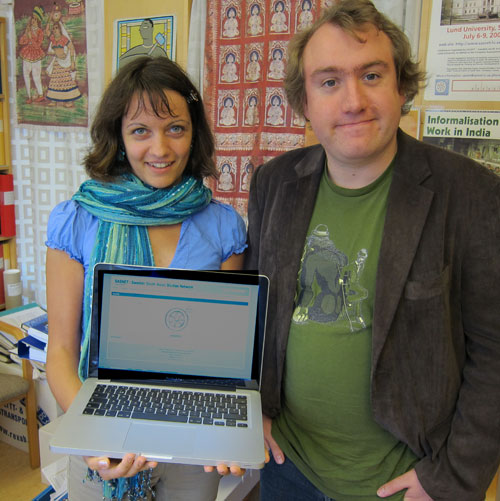 On Tuesday 6 September 2011, SASNET will launch a completely redesigned and restructured website. The layout will be cleaner and easier to navigate. The work to restructure the extensive SASNET website (with a content of nearly 1,900 web pages) has been carried out during the past 8 months by Julia Velkova at SASNET and Bernd Wunsch at the Nordic Institute of Asian Studies (NIAS) in Copenhagen (on photo). On Tuesday 6 September 2011, SASNET will launch a completely redesigned and restructured website. The layout will be cleaner and easier to navigate. The work to restructure the extensive SASNET website (with a content of nearly 1,900 web pages) has been carried out during the past 8 months by Julia Velkova at SASNET and Bernd Wunsch at the Nordic Institute of Asian Studies (NIAS) in Copenhagen (on photo).
SASNET’s website will keep the the same address as before: http://www.sasnet.lu.se.
It has been more than a decade since the first SASNET website was launched with lots of enthusiasm shortly after the birth of the organization. Over the years it has been solely administered and updated by SASNET’s deputy director Lars Eklund. Now it is time to consolidate the work, and that is done in collaboration with our new partner organisation NIAS. The ambition is to synchronize and exchange web based information from SASNET and NIAS in the future.
More information about the new SASNET web page. 
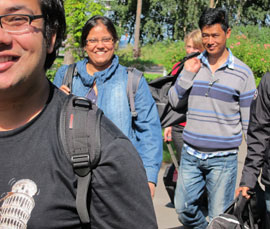 The third Nordic Conference on South Asian Studies for Young Scholars was held 16–18 August 2011 at Falsterbo kursgård in Höllviken, 20 km south of Malmö. As usual, it was organised by SASNET but from this year in collaboration with the Copenhagen based Nordic Institute of Asian Studies (NIAS). Julia Velkova from SASNET was the main coordinator. The third Nordic Conference on South Asian Studies for Young Scholars was held 16–18 August 2011 at Falsterbo kursgård in Höllviken, 20 km south of Malmö. As usual, it was organised by SASNET but from this year in collaboration with the Copenhagen based Nordic Institute of Asian Studies (NIAS). Julia Velkova from SASNET was the main coordinator.
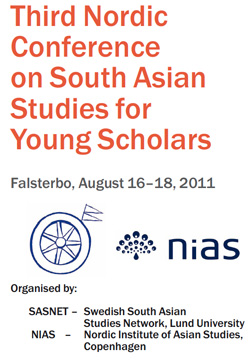 The conference became a grand success, gathering graduate students and postdocs, along with other junior scholars affiliated with universities in Denmark, Finland, Norway, and Sweden, who are focusing on South Asia in their work. This year a few students from other European countries (Scotland and Germany) were also invited. The conference became a grand success, gathering graduate students and postdocs, along with other junior scholars affiliated with universities in Denmark, Finland, Norway, and Sweden, who are focusing on South Asia in their work. This year a few students from other European countries (Scotland and Germany) were also invited.
More information about the 2011 conference.
See the conference folder (as a pdf-file)
See a photo gallery from the conference. 
Between 21 and 25 August 2011, Julia Velkova represented SASNET at the World Water Conference in Stockholm. It was a fruitful week in which she attended a number of South Asian related seminars and events. While in Stockholm, she also visited the Embassy of India in Stockholm and researchers at Stockholm University. Read her report. 
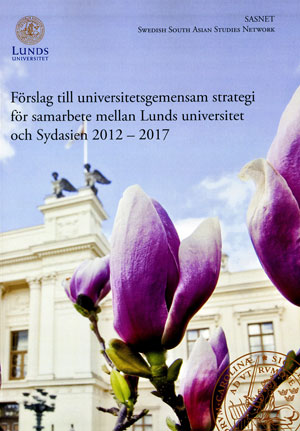 On 30th June 2011, SASNET’s director Anna Lindberg handed over the report she has prepared on Lund University’s common and long-term strategies on South Asia collaboration during the coming five years to the Lund University Vice Chancellor Professor Per Eriksson. On 30th June 2011, SASNET’s director Anna Lindberg handed over the report she has prepared on Lund University’s common and long-term strategies on South Asia collaboration during the coming five years to the Lund University Vice Chancellor Professor Per Eriksson.
The report has been written in close consultation with
representatives of all faculties at Lund University and
the university’s External Relations division.
When Lund University in March 2010 decided to give additional funding to SASNET, in order to partly compensate for lost funding from the Swedish International Development Cooperation Agency (Sida), the additional subsidy came from the Lund University Vice-Chancellor’s strategic research funds. In the decision to do this, it was clearly stated that the extra funds should be earmarked to prepare a Lund University report on common and long-term strategy for collaboration with South Asia.
The mission from the Vice Chancellor also included exploring possibilities to find external collaboration partners and secure new external funding for SASNET’s continued South Asia-related activities, and a time limit was set to end-June 2011. The task has been carried out by Anna Lindberg with input from SASNET’s deputy director Lars Eklund, and Mr Henrik Hofvendahl, International Programme Officer at the International Relations division. 
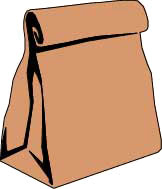 On Thursday 15 September 2011, SASNET holds its first Brown bag lunch seminar during the fall semester 2011. The aim of SASNET’s Brown Bag seminars, introduced in January 2011, is to present and disseminate the eminent South Asia related research that is carried out in so many departments at Lund University. The seminars are open to the public, and during the fall 2011 they will be held once a month at Thursdays at Murbeckssalen, Gula Villan (inside the Botanical Gardens), Östra Vallgatan 14, Lund. On Thursday 15 September 2011, SASNET holds its first Brown bag lunch seminar during the fall semester 2011. The aim of SASNET’s Brown Bag seminars, introduced in January 2011, is to present and disseminate the eminent South Asia related research that is carried out in so many departments at Lund University. The seminars are open to the public, and during the fall 2011 they will be held once a month at Thursdays at Murbeckssalen, Gula Villan (inside the Botanical Gardens), Östra Vallgatan 14, Lund.
More information about the seminar series.
Seminar series poster. 
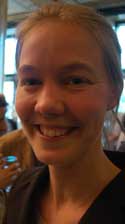 – The first SASNET Brown Bag 2011 Fall seminar will be held on 15th September 2011, 12.00–13.00. Dr. Malin Gregersen (photo) from the Department of History will give a presentation entitled ”Fostering Obligations: Swedish Medical Missionary Narratives from South India”. Even though Sweden was not participating in the run for colonies during the era of the new imperialism
in late 19th and early 20th century, Swedes often took a close interest in African and Asian
countries through the work of Christian missionaries. Thus, Christian missionaries played an
important role in forming early 20th century Swedish world views. But their depictions of everyday
life in foreign countries were formulated on the basis of an aspiration not only to convert people to
Christianity, but also to educate, shape and change people according to Swedish and Christian – The first SASNET Brown Bag 2011 Fall seminar will be held on 15th September 2011, 12.00–13.00. Dr. Malin Gregersen (photo) from the Department of History will give a presentation entitled ”Fostering Obligations: Swedish Medical Missionary Narratives from South India”. Even though Sweden was not participating in the run for colonies during the era of the new imperialism
in late 19th and early 20th century, Swedes often took a close interest in African and Asian
countries through the work of Christian missionaries. Thus, Christian missionaries played an
important role in forming early 20th century Swedish world views. But their depictions of everyday
life in foreign countries were formulated on the basis of an aspiration not only to convert people to
Christianity, but also to educate, shape and change people according to Swedish and Christian
ideals. Such missionary narratives, originating from a South Indian hospital, will be the focus of her lecture. Malin defended her doctoral dissertation on this issue as recently as a year ago. Read an abstract. 
– The second Brown Bag seminar will be held on Thursday 13 October, with Associate Professor Åsa Ljungh from the Section of Medical Microbiology, Department of Laboratory Medicine.
– The third Brown Bag seminar will be held on Thursday 10 November, with Dr. Olle Frödin from the Department of Sociology.
More information will follow about these seminars.
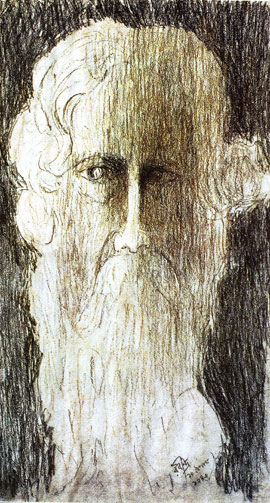 SASNET again organises a Rabindranath Tagore 150th birth anniversary celebration week 19–23 September 2011. The celebration includes academic seminars in Copenhagen (19th), Lund (21st), Stockholm (22nd) and Uppsala (23rd). SASNET again organises a Rabindranath Tagore 150th birth anniversary celebration week 19–23 September 2011. The celebration includes academic seminars in Copenhagen (19th), Lund (21st), Stockholm (22nd) and Uppsala (23rd).
SASNET is strongly involved in planning for these academic seminars and related cultural programmes that are organised
in collaboration with the Indian embassies in Copenhagen and Stockholm, and with support from the Indian Council for Cultural Relations (ICCR). Invited scholars include Professor William Radice, SOAS, University of London; Dr. Reba Som, Director, ICCR Rabindranath Tagore Centre in
Kolkata; and Professor Asoke Bhattacharya, Jadavpur University, Kolkata.
The seminar at Lund University will be held on Wednesday 21 September, 09.00–13.00, at Stadshallen in central Lund. The seminar will be attended by the Ambassadors from both Bangladesh and India, Mr. Gousal Azam Sarker and Mr. Ashok Sajjanhar respectively. See the full programme. 
On the night before, Tuesday 20 September at 19.00, a cultural evening will also be organised at Teater Sagohuset in Lund. The programme includes William Radice reading out his brand new English translations of poems from the Gitanjali volume. Reba Som and Bubu Munshi Eklund will sing Rabindrasangheet songs. The event will be attended by the Ambassadors from both Bangladesh and India, Mr. Gousal Azam Sarker and Mr. Ashok Sajjanhar respectively. See the poster for the Cultural Evening at Sagohuset. 
– In Copenhagen the seminar will be held on Monday 19th September, 10.00–16.00. It is jointly organised by the Dept. of Cross-Cultural and Regional Studies, University of Copenhagen, Asian Dynamics Initiative (ADI), and the Nordic Institute of Asian Studies (NIAS). Venue: Faculty of Humanities, University of Copenhagen,
Building 23, Auditorium 23.0.49,
Njalsgade 128. See the full programme for the Copenhagen seminar. 
– The seminar at Stockholm University will be held on Thursday 22 September, 09.00–17.15. This programme is jointly organized by the university’s Dept. of Oriental languages and Dept. of
Theatre and Dance Studies. Venue:
See the full programme for the Stockholm seminar. 
– In Uppsala, the commemorative event will be organised as a Public Workshop, and be held on Friday 23 September, 10.15–13.00. It is being organized by Uppsala University’s Forum for South Asian Studies in collaboration with the Dept. of History, the Dept. for Comparative Literature and the Dept. for Linguistics and Philology. Venue: Evolutionbiologiskt Centrum (Villavägen, opposite Café Viktoria), Ekmansalen, Uppsala. More information. 
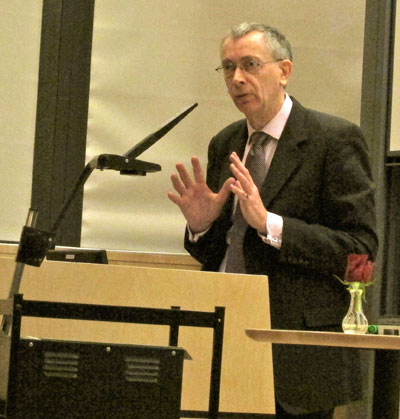 SASNET organised another Tagore celebration week in Lund already 20–24 March 2011. In collaboration with other local institutions and organisations, the week-long programme included a fulll-day academic seminar featuring Professor Wiliam Radice (photo); Associate Professor Claes-Göran Holmberg and other invited speakers, but also exhibitions, concerts, film shows, poetry reading and popular lectures by Swedish experts on Rabindranath’s life and literature, such as Dr. Olavi Hemmilä and Mr. P O Henricson. The programme even included a Sunday evening mass in Lund Cathedral where the choir Svart på Vitt performed the song ”Ontoro Momo” by Tagore in Bengali language. SASNET organised another Tagore celebration week in Lund already 20–24 March 2011. In collaboration with other local institutions and organisations, the week-long programme included a fulll-day academic seminar featuring Professor Wiliam Radice (photo); Associate Professor Claes-Göran Holmberg and other invited speakers, but also exhibitions, concerts, film shows, poetry reading and popular lectures by Swedish experts on Rabindranath’s life and literature, such as Dr. Olavi Hemmilä and Mr. P O Henricson. The programme even included a Sunday evening mass in Lund Cathedral where the choir Svart på Vitt performed the song ”Ontoro Momo” by Tagore in Bengali language.
Detailed information about the March 2011 Lund Tagore Week. 
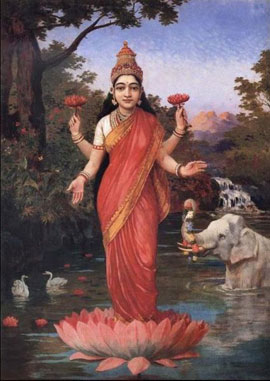 • Dr. Bidyut Mohanty, Head, Women’s Studies Department at the Institute of Social Sciences (ISS), New Delhi, India holds a SASNET lecture at Lund University on Monday 19 September 2011, 16.15–18.00. During the lecture, co-organised by the Department of History of Religion, she will talk about ”Nuances of Rice Culture, Goddess Lakshmi and the Status of Women in India”. The lecture is based on her forthcoming book entitled ”Rice Culture and Status of Women: A Comparative Study of Laksmi Puranas”. Read an article written by Dr. Mohanty on the same issue. • Dr. Bidyut Mohanty, Head, Women’s Studies Department at the Institute of Social Sciences (ISS), New Delhi, India holds a SASNET lecture at Lund University on Monday 19 September 2011, 16.15–18.00. During the lecture, co-organised by the Department of History of Religion, she will talk about ”Nuances of Rice Culture, Goddess Lakshmi and the Status of Women in India”. The lecture is based on her forthcoming book entitled ”Rice Culture and Status of Women: A Comparative Study of Laksmi Puranas”. Read an article written by Dr. Mohanty on the same issue. 
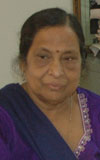 Bidyut Mohanty has been a Visiting Professor in the Global and International Studies program at the University of California, Santa Barbara and is the coordinator of an ISS and UNDP project on capacity building of elected women leaders in local government in India, and as well as of a project sponsored by the National Commission on the protection of child rights. Bidyut Mohanty has been a Visiting Professor in the Global and International Studies program at the University of California, Santa Barbara and is the coordinator of an ISS and UNDP project on capacity building of elected women leaders in local government in India, and as well as of a project sponsored by the National Commission on the protection of child rights.
She has also coordinated several UNIFEM funded projects on HIV and AIDS and role of panchayats, trafficking and local government’s new role. Besides, Dr. Mohanty is also a specialist on famine, agrarian history and decentralization. She combines grassroots activism with participatory research. Her publications include several research papers and edited books, among them: Urbanization in Developing Countries: Access to Basic Services and Community Participation (1993) Women and Political Empowerment (annual volumes from 1995 till 2006) and Local Governance in Search for New Path (2011).
Venue for the seminar: Centre for Theology and Religious Studies (CTR), room 438, Allhelgona Kyrkogata 8, Lund. More information.
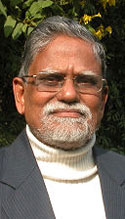 • Manoranjan Mohanty, Durgabai Deshmukh Professor of Social Development at the Council for Social Development in New Delhi, India holds a SASNET lecture at Lund University on Tuesday 20 September 2011, 15.15–17.00. During the seminar, co-organised by the departments of Sociology and Political Science, he will talk about ”India and China: Competing Hegemonies or Forces of Democratization”. Prof. Mohantry is a China scholar with many publications on theoretical and empirical dimensions of social movements, human rights, development experience and regional role of India and China. Currently he is also the Chairperson, Institute of Chinese Studies in Delhi, and President, Development Research Institute, Bhubaneswar. Besides, he is a Visiting Professor in Global Studies at University of California, Santa Barbara since 2007 where he teaches every Spring. • Manoranjan Mohanty, Durgabai Deshmukh Professor of Social Development at the Council for Social Development in New Delhi, India holds a SASNET lecture at Lund University on Tuesday 20 September 2011, 15.15–17.00. During the seminar, co-organised by the departments of Sociology and Political Science, he will talk about ”India and China: Competing Hegemonies or Forces of Democratization”. Prof. Mohantry is a China scholar with many publications on theoretical and empirical dimensions of social movements, human rights, development experience and regional role of India and China. Currently he is also the Chairperson, Institute of Chinese Studies in Delhi, and President, Development Research Institute, Bhubaneswar. Besides, he is a Visiting Professor in Global Studies at University of California, Santa Barbara since 2007 where he teaches every Spring.
Prof. Mohanty retired in 2004 as the Director, Developing Countries Research Centre and Professor of Political Science at the University of Delhi, where he taught since 1969. He is a former Director of ICS and a former Editor of China Report. His earlier academic assignments abroad included Institute of Far Eastern Studies, Moscow (1973), UC, Berkeley (1974), Peking University (1979), Oxford (1987) and Copenhagen (1990) and Lagos (2005). He is also active in the human rights and peace movement. His recent publications include Contemporary Indian Political Theory (2000), Class, Caste, Gender (Ed.2004) and Grass-roots Democracy in India and China (Co-ed. 2007), India: Social Development Report 2010 (Ed. 2010), Weapon of the oppressed: An Inventory of People's Rights in India ( Co-author, 2011) and China’s Success Trap: Lessons for World Development ( Forthcoming).
Venue for the seminar: Conference room 1, Dept. of Sociology, Paradisgatan 5, Lund. More information. 
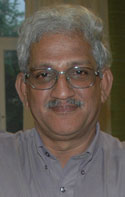 Professor
Venkatesh Athreya from the
Swaminathan Research Foundation in Chennai, India holds a SASNET lecture at Lund University on Tuesday 27 September 2011, 15.15–17.00. During the seminar, organised in collaboration with the Dept. of Sociology, he will talk about ”Political Economy of Indian
Development since 1991”.
Professor Athreya has been co-operating for many years with
Prof. Göran Djurfeldt and Prof. Emeritus Staffan Lindberg at
Lund University. Among his most well-known publications are“Literacy and Empowerment” (Sage 1996) and “Barriers
Broken” (with Djurfeldt and Lindberg, Sage 1990).
Currently he is co-operating with Djurfeldt and Lindberg at
Lund University in a restudy after 25 years of 213 agricultural
households in the Cauvery delta in Tamilnadu.
Venue for the seminar: Conference room 1, Dept. of Sociology, Paradisgatan 5, Lund. Professor
Venkatesh Athreya from the
Swaminathan Research Foundation in Chennai, India holds a SASNET lecture at Lund University on Tuesday 27 September 2011, 15.15–17.00. During the seminar, organised in collaboration with the Dept. of Sociology, he will talk about ”Political Economy of Indian
Development since 1991”.
Professor Athreya has been co-operating for many years with
Prof. Göran Djurfeldt and Prof. Emeritus Staffan Lindberg at
Lund University. Among his most well-known publications are“Literacy and Empowerment” (Sage 1996) and “Barriers
Broken” (with Djurfeldt and Lindberg, Sage 1990).
Currently he is co-operating with Djurfeldt and Lindberg at
Lund University in a restudy after 25 years of 213 agricultural
households in the Cauvery delta in Tamilnadu.
Venue for the seminar: Conference room 1, Dept. of Sociology, Paradisgatan 5, Lund.
More information. 
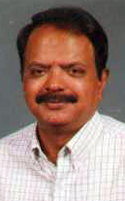 During the academic year 2011/12, G K Karanth,
Professor of Sociology at the
Centre for Study of Social Change and Development,
Institute for Social and Economic Change (ISEC) in Bangalore, will be the Visiting ICCR Professor at Lund University. He is supposed to arrive in mid-September 2011, and be will hosted by the Department of Sociology. During the academic year 2011/12, G K Karanth,
Professor of Sociology at the
Centre for Study of Social Change and Development,
Institute for Social and Economic Change (ISEC) in Bangalore, will be the Visiting ICCR Professor at Lund University. He is supposed to arrive in mid-September 2011, and be will hosted by the Department of Sociology. 
Prof. Karanth has a PhD from Jawaharlal Nehru University (JNU) in Delhi, and his main research fields are Peasant Economy and Society; Caste and Social Stratification; Rural-Urban Linkages; and Sociology of Development. He will be second Visiting ICCR Professor at Lund University, after Prof. Lipi Ghosh who spent five months in Lund till March 2011.
The ICCR professorships at Lund University are an outcome of a Memorandum of Understanding between the Indian Council for Cultural Relations (ICCR) and Lund University, that was signed on 22 June 2010 by Mr. Balkrishna Shetty, former Indian Ambassador to Sweden, and Prof. Per Eriksson, Vice-Chancellor, Lund University. The agreement is valid for four years, with a new Indian Professor to be selected each year.
SASNET was actively involved in finalizing the ICCR professorship at Lund University, with strong support from the Embassy of India in Stockholm.
An inaugural seminar with Professor Karanth will be held on Thuursday 6th October 2011, at 15.00. The theme for his lecture wil be ”Changing Rural India: Caste and Social Mobility”. After the lecture, a cultural programme will be organised with the Tabla player Subrata Manna, singer Sudokshina Manna, and Kathak dancer Sohini Debnath, all from Kolkata.
Venue for the seminar: Edens hörsal (auditorium), Lund University’s Department of Political Science, Paradisgatan 5, Lund.
All are most welcome to the event that includes free Indian food and continues up to 7 P.M.
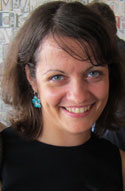 From 1 July 2011, Ms. Julia Velkova (photo) works full-time for SASNET as assisting webmaster, in charge of SASNET’s web development. This work is carried out in close collaboration with the Nordic Institute of Asian Studies (NIAS) in Copenhagen. Julia has been the main coordinator for the SASNET/NIAS joint conference for young Nordic scholars that was held in Falsterbo 16–18 August 2011, and involved in planning for a number of conferences/dance performances in commemoration of Rabindranath Tagore to be held in the Nordic countries during September. From 1 July 2011, Ms. Julia Velkova (photo) works full-time for SASNET as assisting webmaster, in charge of SASNET’s web development. This work is carried out in close collaboration with the Nordic Institute of Asian Studies (NIAS) in Copenhagen. Julia has been the main coordinator for the SASNET/NIAS joint conference for young Nordic scholars that was held in Falsterbo 16–18 August 2011, and involved in planning for a number of conferences/dance performances in commemoration of Rabindranath Tagore to be held in the Nordic countries during September.
Julia also worked with the previous Falsterbo conferences in 2009 and 2010, and she was Acting Deputy Director for SASNET for a period during Lars’ absence earlier this year. She has a background from Bulgaria, where she has obtained an MA degree in Eastern Philosophy and Culture with focus on India. A few weeks ago, she completed her second masters degree in Communication for Development at the School of Arts and Communication, Malmö University.
Julia has a keen interest in developing the relations between South Asia and Europe, as well as working with projects for social change through art and technology.
Besides, she has
experiences from project assignments with the Gothenburg Dance & Theatre Festival, and the free theatre group Aktör & Vänner where she was responsible for the coordination of international collaborations, fundraising and website maintenance. Finally and not the least important, she has 10 years of experience of working with IT for development in the Balkans, former Soviet states and Europe, as well as with overall project coordination. 
During the period 2001–2009, SASNET distributed planning grants to new research and educational projects. A total number of 119 networking grants were distributed to Swedish researchers working on South Asia related projects within all fields – from technology and natural sciences to humanities, social sciences and educational sciences. The researchers who benefited from the grants belonged to 20 different Swedish universities and university colleges. Out of the 119 grants awarded, 72 referred to networking grants to plan for new research projects/programmes; 20 to grants in order to develop new educational projects/programmes; 10 to organise interdisciplinary workshops; and 17 to the guest lecture programme.
In the evaluation of SASNET that was carried out in 2005 (go for the evaluation report), it was shown that 70 p.c. of the projects that had been given SASNET planning grants till 2004 had later been given substantial funding from other sources, such as Sida/SAREC, Swedish Research Council, Bank of Sweden Tercentennary Fund, and the European Commission. Also thereafter, SASNET’s networking grants continued to play an important role setting new South Asia related projects/programmes in motion. Go for the complete list of SASNET planning grants distributed 2001–2009.
No planning grants have been distributed thereafter. 
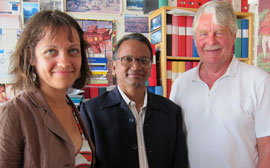 On 4 August 2011, Dr. Y. S. Alone, Assistant Professor at the
School of Arts and Aesthetics,
Jawaharlal Nehru University (JNU) in New Delhi, India, visited SASNET’s office at Lund University. Dr. Alone who is basically an art historian and studies Buddhism in western India, had come to Sweden to participate in the 2011 Nordic Summer University (NSU) symposium on ”Narrativity and Political Imaginaries” held at Falsterbo, south of Malmö, 31 July – 6 August 2011, and more specifically the NSU symposium’s study circle focusing on ”Psychoanalysis and Politics”. He presented an opening address entited ”Confronting Political Representation: Politics of Visuality”, focusing on the relation between Mahatma Gandhi and Dr. Ambedkar in the Indian freedom struggle. More information about the 2011 NSU symposium at Falsterbo. On 4 August 2011, Dr. Y. S. Alone, Assistant Professor at the
School of Arts and Aesthetics,
Jawaharlal Nehru University (JNU) in New Delhi, India, visited SASNET’s office at Lund University. Dr. Alone who is basically an art historian and studies Buddhism in western India, had come to Sweden to participate in the 2011 Nordic Summer University (NSU) symposium on ”Narrativity and Political Imaginaries” held at Falsterbo, south of Malmö, 31 July – 6 August 2011, and more specifically the NSU symposium’s study circle focusing on ”Psychoanalysis and Politics”. He presented an opening address entited ”Confronting Political Representation: Politics of Visuality”, focusing on the relation between Mahatma Gandhi and Dr. Ambedkar in the Indian freedom struggle. More information about the 2011 NSU symposium at Falsterbo.
At SASNET, Dr. Alone had a fruitful interaction with deputy director Lars Eklund and assistant webmaster Julia Velkova (seen on the photo along with Dr. Alone). He also met Dr. Jan Magnusson from the School of Social Work, Lund University. 
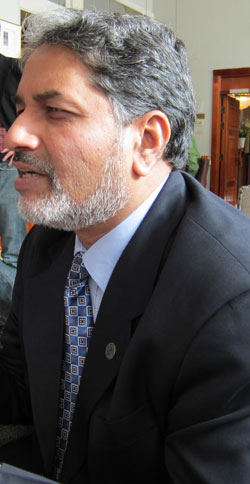 On 21 June 2011, Anna Lindberg and Lars Eklund from SASNET had a fruitful meeting in Lund with Vice Chancellor Professor K R Shevgaonkar (photo) and Dr. Prasad Kulkarni from the University of Pune, India. They have come to Sweden in order to visit two of their partner universities, namely Lund University and KTH Royal Institute of Technology in Stockholm and Lund University, both of which are involved in Indo-European Erasmus Mundus Action 2 programmes with University of Pune. Prof. Shevgaonkar recently took over as the Vice Chancellor of University of Pune. Before that he was attached to the Indian Institute of Technology (IIT) Bombay for many years. On 21 June 2011, Anna Lindberg and Lars Eklund from SASNET had a fruitful meeting in Lund with Vice Chancellor Professor K R Shevgaonkar (photo) and Dr. Prasad Kulkarni from the University of Pune, India. They have come to Sweden in order to visit two of their partner universities, namely Lund University and KTH Royal Institute of Technology in Stockholm and Lund University, both of which are involved in Indo-European Erasmus Mundus Action 2 programmes with University of Pune. Prof. Shevgaonkar recently took over as the Vice Chancellor of University of Pune. Before that he was attached to the Indian Institute of Technology (IIT) Bombay for many years.
More information about Prof. Shevgaonkars’s visit to Sweden. 
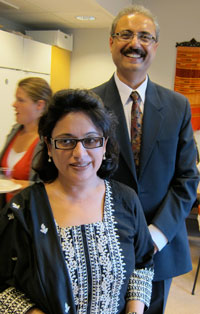 On 15 June 2011, SASNET’s deputy director Lars Eklund visited the Division of Global health
(IHCAR) at Karolinska Institutet Medical University in Stockholm. The main purpose was to attend the PhD dissertation by Mr. Mohsin Saeed Khan, who successfully defended his thesis entitled ”Poverty of Opportunity for Women Selling Sex in Lahore, Pakistan: Knowledge, Experiences and Magnitude of HIV and STIs”. Mohsin has been a member of SASNET’s South Asian Reference Group. More information. On 15 June 2011, SASNET’s deputy director Lars Eklund visited the Division of Global health
(IHCAR) at Karolinska Institutet Medical University in Stockholm. The main purpose was to attend the PhD dissertation by Mr. Mohsin Saeed Khan, who successfully defended his thesis entitled ”Poverty of Opportunity for Women Selling Sex in Lahore, Pakistan: Knowledge, Experiences and Magnitude of HIV and STIs”. Mohsin has been a member of SASNET’s South Asian Reference Group. More information.
While at IHCAR, Lars also interacted with a large number of other researchers – professors, post-docs and PhD candidates in Global Health, including Dr. Fauzia Rabbani, now back at Aga Khan University in Karachi (on photo together with Mohsin Saeed Khan).
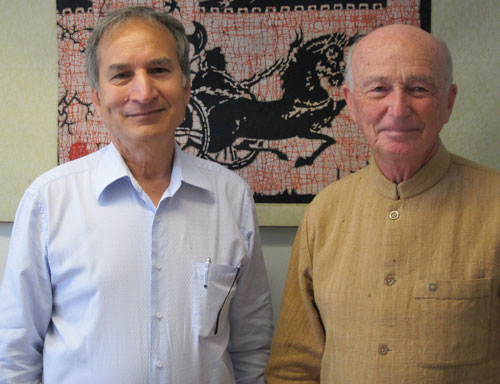 A separate meeting was held with Professor Vinod Diwan and Professor Emeritus Bo Lindblad (photo), discussing IHCAR’s long-standing collaboration with universities in India and Pakistan, the large number of sandwich PhDs attained in recent years, and the impressing number of large EU grants for research projects, partly focusing on South Asia, that IHCAR
administers. A separate meeting was held with Professor Vinod Diwan and Professor Emeritus Bo Lindblad (photo), discussing IHCAR’s long-standing collaboration with universities in India and Pakistan, the large number of sandwich PhDs attained in recent years, and the impressing number of large EU grants for research projects, partly focusing on South Asia, that IHCAR
administers. 
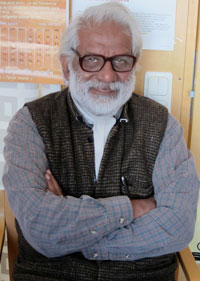 After attending the Go:India kickoff conference at Gothenburg University (more information below), and holding a lecture for Hindi students at Stockholm University, Prof. Dipak Malik from Gandhian Institute of Studies in Varanasi came to Lund, and visited SASNET’s office on Monday 13 June 2011. After attending the Go:India kickoff conference at Gothenburg University (more information below), and holding a lecture for Hindi students at Stockholm University, Prof. Dipak Malik from Gandhian Institute of Studies in Varanasi came to Lund, and visited SASNET’s office on Monday 13 June 2011.
Prof. Malik has been a member of SASNET’s South Asian reference group and has a strong attachment to Lund and Lund University. During his stay in Lund he met colleagues from the departments of Sociology and Social Work, besides having discussions with Anna Lindberg and Lars Eklund from SASNET. 
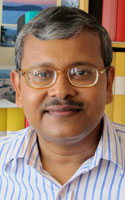 Associate Professor Sudipta De from the Dept.
of Mechanical Engineering, Jadavpur University, Kolkata, India, visited SASNET’s office in Lund on Tuesday 14 June 2011. Dr. De has been involved in collaborative research for many years with Prof. Mohsen Assadi at the Dept. of Energy Sciences, Lund University. He has also spent time at the Royal Institute of Technology (KTH) in Stockholm, as a scholarship holder under the Erasmus Mundus Action 2 programme India4EU (coordinated by Politecnico di Torino, Italy). During his visit to SASNET he met deputy director Lars Eklund. Associate Professor Sudipta De from the Dept.
of Mechanical Engineering, Jadavpur University, Kolkata, India, visited SASNET’s office in Lund on Tuesday 14 June 2011. Dr. De has been involved in collaborative research for many years with Prof. Mohsen Assadi at the Dept. of Energy Sciences, Lund University. He has also spent time at the Royal Institute of Technology (KTH) in Stockholm, as a scholarship holder under the Erasmus Mundus Action 2 programme India4EU (coordinated by Politecnico di Torino, Italy). During his visit to SASNET he met deputy director Lars Eklund. 
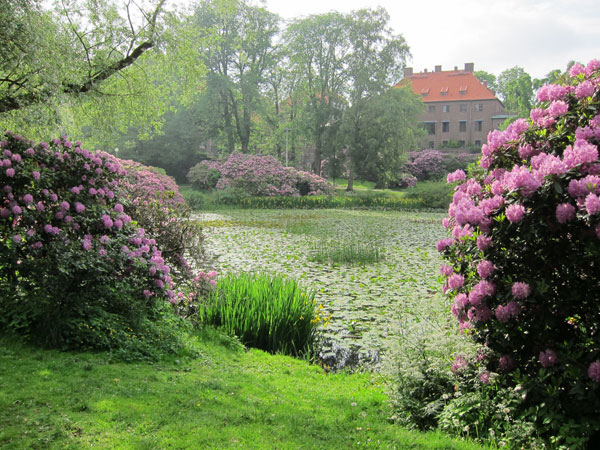 On Tuesday 7 June 2011, SASNET’s deputy director Lars Eklund and assistant webmaster Julia Velkova visited University of Gothenburg, to attend the first day of the kick-of conference for its Go:India project, launched in November 2010. This is a three year project (2011 – 2013), intended to build a platform for co-operation within the areas of research, teaching and education between researchers at University of Gothenburg’s Faculties of Arts; Fine, Applied and Performing Arts; Sahlgrenska Academy; and the Faculty of Social Sciences, and their collaboration partner institutions in India. More information. On Tuesday 7 June 2011, SASNET’s deputy director Lars Eklund and assistant webmaster Julia Velkova visited University of Gothenburg, to attend the first day of the kick-of conference for its Go:India project, launched in November 2010. This is a three year project (2011 – 2013), intended to build a platform for co-operation within the areas of research, teaching and education between researchers at University of Gothenburg’s Faculties of Arts; Fine, Applied and Performing Arts; Sahlgrenska Academy; and the Faculty of Social Sciences, and their collaboration partner institutions in India. More information.
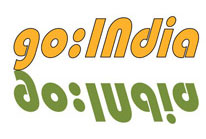 Lars and Julia interacted with the Gothenburg researchers and project coordinators, but also with the representatives from Banaras Hindu University (BHU) in Varanasi; Sarai/Centre for the Study of Developing Societies (CSDS) in Delhi; Gandhian Institute of Studies in Varanasi; Jadavpur University in Kolkata; Punjabi University in Patiala; Visva-Bharati University in Shantiniketan; Tata Institute of Social Sciences (TISS) in Mumbai; Srishti School of Art, Design and Technology in Bangalore; and Union Biblical Seminary in Pune. Lars and Julia interacted with the Gothenburg researchers and project coordinators, but also with the representatives from Banaras Hindu University (BHU) in Varanasi; Sarai/Centre for the Study of Developing Societies (CSDS) in Delhi; Gandhian Institute of Studies in Varanasi; Jadavpur University in Kolkata; Punjabi University in Patiala; Visva-Bharati University in Shantiniketan; Tata Institute of Social Sciences (TISS) in Mumbai; Srishti School of Art, Design and Technology in Bangalore; and Union Biblical Seminary in Pune.
Second and third day of the conference, SASNET’s director Anna Lindberg came from Lund to participate in the meetings dealing with planned activities for the coming three years, including, among other things, joint conferences, writing of joint research projects, teacher and student exchange.
See the programme for the Gothenburg meeting. 
See Lars Eklund’s photos from the first day. 
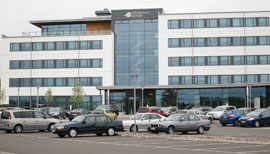 On Monday 16 May 2011, SASNET’s deputy director, Lars Eklund visited Skövde University to attend a seminar meeting organised by Professor Abul Mandal, School of Life Sciences. The aim was to discuss Skövde University’s ongoing partnership programmes with both University of Rajshahi University, Bangladesh (a Linnaeus Palme exchange collaboration programme), and two universities in Pune, India, involved in a Sida funded Partner driven collaboration project on Urban Indian Development.
Professor Mandal, who coordinates both programmes, organised the joint meeting to discuss how to proceed with them. On Monday 16 May 2011, SASNET’s deputy director, Lars Eklund visited Skövde University to attend a seminar meeting organised by Professor Abul Mandal, School of Life Sciences. The aim was to discuss Skövde University’s ongoing partnership programmes with both University of Rajshahi University, Bangladesh (a Linnaeus Palme exchange collaboration programme), and two universities in Pune, India, involved in a Sida funded Partner driven collaboration project on Urban Indian Development.
Professor Mandal, who coordinates both programmes, organised the joint meeting to discuss how to proceed with them.
The meetings were attended by the Vice Chancellor at Skövde University, Professor Sigbritt Karlsson, and Ms. Sofia Henningsson, International Coordinator at the university.
Ms. Sadia Sharmin from the Embassy of Bangladesh in Stockholm also participated.
Read Lars’ report from the meeting. 
On Friday 27 May 2011, SASNET’s deputy director Lars Eklund visited Gothenburg, in order to learn about two interesting projects with strong relevance to South Asian studies at the University of Gothenburg.
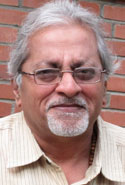 In the morning, a meeting was organised at the School of Business, Economics and Law by Professor Ramnath Narayanswamy (photo), one out of three Indian researchers currently based there as part of the Visiting Professors programme. Another Indian visiting professor also attended the meeting, Associate Professor Ashok Thampy, as well as the program coordinator, Dr. Robin Biddulph, the Head of the International Visiting Professors Programme at the School, Dr. Sara Stendahl, and Ingela Palmgren, Director, Corporate Relations, School of Business, Economics and Law. From the School of Business, Economics and Law, Lars Eklund proceeded to the Nordic School of Public Health (NHV), this time accompanied by Julia Velkova, currently working on a project basis for SASNET. They went to NHV in order to meet Dr. Alexandra Krettek, Associate Professor of Cardiovascular Prevention at Sahlgrenska Academy, University of Gothenburg; and Professor Göran Bondjers, former Dean of the Faculty of Medicine, Sahlgrenska Academy. In the morning, a meeting was organised at the School of Business, Economics and Law by Professor Ramnath Narayanswamy (photo), one out of three Indian researchers currently based there as part of the Visiting Professors programme. Another Indian visiting professor also attended the meeting, Associate Professor Ashok Thampy, as well as the program coordinator, Dr. Robin Biddulph, the Head of the International Visiting Professors Programme at the School, Dr. Sara Stendahl, and Ingela Palmgren, Director, Corporate Relations, School of Business, Economics and Law. From the School of Business, Economics and Law, Lars Eklund proceeded to the Nordic School of Public Health (NHV), this time accompanied by Julia Velkova, currently working on a project basis for SASNET. They went to NHV in order to meet Dr. Alexandra Krettek, Associate Professor of Cardiovascular Prevention at Sahlgrenska Academy, University of Gothenburg; and Professor Göran Bondjers, former Dean of the Faculty of Medicine, Sahlgrenska Academy.
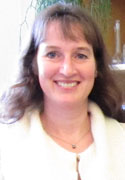 A meeting was organised to present University of Gothenburg’s new collaboration project with three partner universities in Nepal – Kathmandu University, Tribhuvan University, and Patan Academy of Health Sciences.
The interdisciplinary project, headed by Dr. Krettek (photo), involves researchers from several departments and is entitled ”Collaboration between GU and Nepali Institutions: Strengthening Health Education, Supporting Research, Monitoring Health”. It is based on previous Linnaeus Palme exchange programme experiences with Tribhuvan University, but seeks to include additional Nepali institutions and programmes for both education and research. It is one out of a number of new international projects initiated by University of Gothenburg as part of a long-term ambition to create a profile as ‘The Global University’. A meeting was organised to present University of Gothenburg’s new collaboration project with three partner universities in Nepal – Kathmandu University, Tribhuvan University, and Patan Academy of Health Sciences.
The interdisciplinary project, headed by Dr. Krettek (photo), involves researchers from several departments and is entitled ”Collaboration between GU and Nepali Institutions: Strengthening Health Education, Supporting Research, Monitoring Health”. It is based on previous Linnaeus Palme exchange programme experiences with Tribhuvan University, but seeks to include additional Nepali institutions and programmes for both education and research. It is one out of a number of new international projects initiated by University of Gothenburg as part of a long-term ambition to create a profile as ‘The Global University’.
Read Lars’ report from the Gothenburg meetings. 
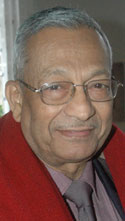 Partha N. Mukherjee, Professor Emeritus, Institute of Social Sciences, New Delhi, came to Lund University in the first week of May 2011, to be a member of an international team to evaluate the university. The week-long evaluation was part of the EQ 11 project initiated at Lund University in 2009 in order to improve education quality.
More information on EQ11. Partha N. Mukherjee, Professor Emeritus, Institute of Social Sciences, New Delhi, came to Lund University in the first week of May 2011, to be a member of an international team to evaluate the university. The week-long evaluation was part of the EQ 11 project initiated at Lund University in 2009 in order to improve education quality.
More information on EQ11. 
Partha Mukherji has been the holder of a Ford Professorship at the Institute of Social Sciences (ISS), New Delhi. He was formerly Vice Chancellor of the Tata Institute of Social Sciences (TISS), Mumbai, and President of the Indian Sociological Society.
While in Lund, Prof. Mukherjee
held a SASNET Guest Lecture, organised in collaboration with the Departments of Sociology and Political Science, Lund University, on ”Land Acquisition for Industrialisation in West Bengal: the Case of Nano and Tata Motors” on Wednesday 11 May 2011, 10.15–12.00.
More information about the lecture. 
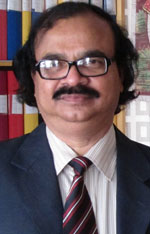 Professor Mizanur Rahman from the Dept. of Accounting & Information Systems, Dhaka University, Bangladesh (and also the Treasurer of Dhaka University), held a SASNET lecture at Lund University on Thursday 26 May 2011. He spoke about ”Social Marketing: Lessons from Bangladesh”. The seminar was organized in collaboration with the Dept. of Sociology. Prof. Rahman has a research interest in Global payment imbalance and the current global economic crisis; and Infrastructure, trade and economic growth in Asia, Venue: Dept. of Sociology, conference room 1, Paradisgatan 5, Lund. More information. Professor Mizanur Rahman from the Dept. of Accounting & Information Systems, Dhaka University, Bangladesh (and also the Treasurer of Dhaka University), held a SASNET lecture at Lund University on Thursday 26 May 2011. He spoke about ”Social Marketing: Lessons from Bangladesh”. The seminar was organized in collaboration with the Dept. of Sociology. Prof. Rahman has a research interest in Global payment imbalance and the current global economic crisis; and Infrastructure, trade and economic growth in Asia, Venue: Dept. of Sociology, conference room 1, Paradisgatan 5, Lund. More information. 
 SASNET is now also present on Facebook. Please join the network through our Facebook group as well, and be updated about new events. SASNET is now also present on Facebook. Please join the network through our Facebook group as well, and be updated about new events.
Go to the SASNET Facebook group. 
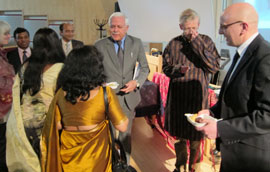 SASNET’s deputy director Lars Eklund participated in the 150 years birth anniversary celebration of Indian/Bengali poet Rabindranath Tagore that was held in Uppsala on Sunday 8 May 2011. SASNET’s deputy director Lars Eklund participated in the 150 years birth anniversary celebration of Indian/Bengali poet Rabindranath Tagore that was held in Uppsala on Sunday 8 May 2011.
The event was organized by the Uppsala University Seminar for South Asian Studies, and drew an audience of more than 100 people. The programme consisted of academic lectures by Dr. Heinz Werner wessler and Dr. Ferdinando Sardella, and cultural performances by Bubu Munshi Eklund from Lund, who sang a range of beautiful Tagore songs (Rabindrasangheet) accompanied on Harmonium; and by Uppsala based Trio Creation, with Jonas Landahl and Suranjana Ghosh on Tablas and Iti Malo on Sitar. The celebration event was also attended by the Ambassadors from Bangladesh and India, Mr. Gousal Azam Sarker and Mr. Ashok Sajjanhar respectively, who both gave inspired presentations. More information. 
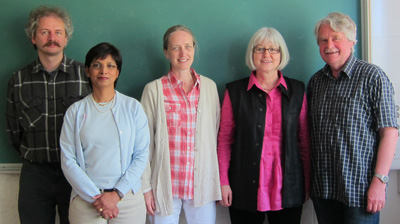 |
|
In connection with his visit to the Tagore celebration event in Uppsala, Lars Eklund also met with researchers involved in Uppsala University’s Seminar for South Asian Studies. 
On Monday 9 May 2011, a meeting was organised at the Dept. of Linguistics
and Philology.
Heinz Werner Wessler, Christiane Schaefer, and Anju Saxena, all from the Linguistics department, along with Gunnel Cederlöf from the Dept. of History, presented among other things their current plans to form a more formalised Forum for South Asian Studies at the university.
They also informed about discussions being held with the Embassy of India and ICCR to establish an ICCR professorship at Uppsala University along the same lines that Lund University has since 2010.
Lars Eklund stressed SASNET’s continued commitment to support such South Asia oriented intiatives at all Swedish universities, in spite of the fact that SASNET since 2010 is only funded by Lund University. Collaborative efforts in the field of establishing masters programmes in South Asian Studies is one specific field where SASNET could play a key role.
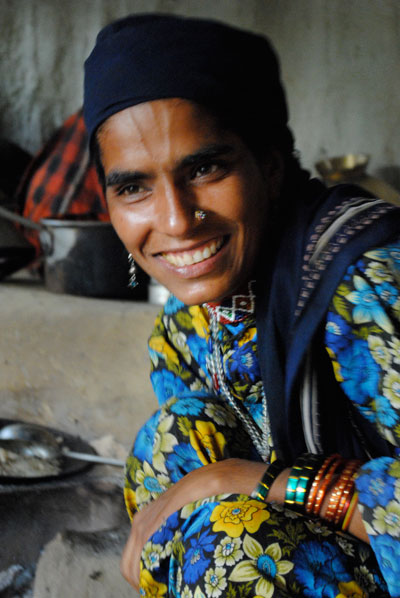 The Swedish South Asian Studies Network (SASNET) at Lund University; Lund University Centre for
Sustainability Studies (LUCSUS);
and The Swallows India Bangladesh jointly organised a seminar on ”Forest Rights in India” on Wednesday 4 may 2011, 13.00–17.00. The seminar, that drew an audience of about 30 people, was organised because 2011 has been selected to be the United Nation's International Year of Forests. Issues related to forests and deforestation in India were discussed, as well as the problems that the tribal people who live there face. The Swedish South Asian Studies Network (SASNET) at Lund University; Lund University Centre for
Sustainability Studies (LUCSUS);
and The Swallows India Bangladesh jointly organised a seminar on ”Forest Rights in India” on Wednesday 4 may 2011, 13.00–17.00. The seminar, that drew an audience of about 30 people, was organised because 2011 has been selected to be the United Nation's International Year of Forests. Issues related to forests and deforestation in India were discussed, as well as the problems that the tribal people who live there face.
The speakers were Dr. Beppe Karlsson, Dept. of Social Antropology, Stockholm University;
Dr. Pernille Gooch, Human Ecology Division, Lund University; PhD candidate Nabikanta Jha, from the same department; and Mr. Praveen Kaushal Manto from SOPHIA organisation in India.
All presentations are now available on the Net. More information.
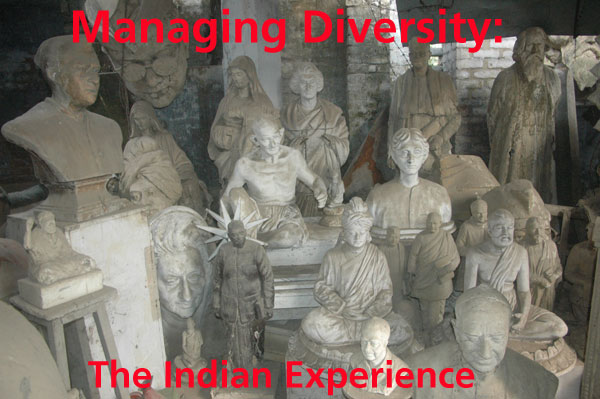
SASNET
successfully organised a full-day seminar on "Managing Diversity: The Indian Experience",
in collaboration with the Embassy of India in Stockholm on Thursday 14 April 2011, 09.30–17.00
and with a concluding cultural programme from 17.30–19.30.
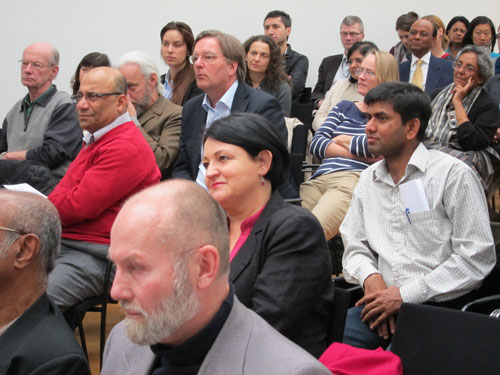 The events gathered an audience of more than 100 people, in the Pictura hall, inside the main Lund University Building for the dat session, and then in The Old Bishop’s Palace. The events gathered an audience of more than 100 people, in the Pictura hall, inside the main Lund University Building for the dat session, and then in The Old Bishop’s Palace.
The seminar was attended by Lund University Vice Chancellor Per Eriksson, the Governor of Skåne County, Göran Tunhammar ,and Ashok Sajjanhar,
Ambassador of India to Sweden and Latvia, who introduced the theme for the day, Managing Diversity: The Indian Experience.
See Lars Eklund’s photos from the day. 
The invited speakers included Professor Sushil Khanna,
Indian Institute of Management (IIM) Kolkata;
Dr. Stig Toft Madsen, Nordic Institute of Asian Studies, Copenhagen; Dr. Christina Nygren,
Visiting Research Fellow, Dept. of Oriental Languages, Stockholm University; Professor Staffan Lindberg, Dept. of Sociology, Lund University; and Mr. Ulf Pehrsson,
Vice President, Government and Industry Relations at Ericsson.
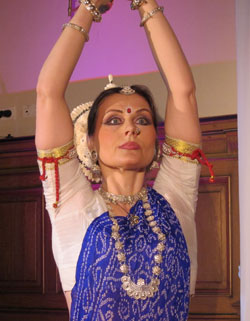 The reception at the Old Bishop’s Palace was hosted by the Embassy of India in Sweden.
A mixed crowd consisting both by Lund University academicians and students, and members of the Indian/South Asian community in Malmö/Lund, enjoyed a marvellous performance by Anette Pooja (photo to the right), eminent classical Odissi dancer from Gothenburg. The reception at the Old Bishop’s Palace was hosted by the Embassy of India in Sweden.
A mixed crowd consisting both by Lund University academicians and students, and members of the Indian/South Asian community in Malmö/Lund, enjoyed a marvellous performance by Anette Pooja (photo to the right), eminent classical Odissi dancer from Gothenburg.
More information on the 14th April 2011 Managing Diversity seminar in Lund. 
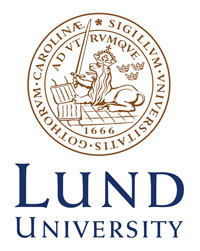 A high-level multi-disciplinary delegation from Lund University, led by Pro Vice-Chancellor Dr Eva Åkesson visited India on 21-25 March 2011. The reasons for the visit, partially planned for by the Swedish Embassy in New Delhi, are the already substantial collaborations with India and expectations of further increased cooperation in the coming years. The delegation consisted of deans and outstanding scientists, representing several of Lund University's faculties. SASNET’s Director, Dr. Anna Lindberg was part of the delegation. Read her report from the March 2011 India tour. A high-level multi-disciplinary delegation from Lund University, led by Pro Vice-Chancellor Dr Eva Åkesson visited India on 21-25 March 2011. The reasons for the visit, partially planned for by the Swedish Embassy in New Delhi, are the already substantial collaborations with India and expectations of further increased cooperation in the coming years. The delegation consisted of deans and outstanding scientists, representing several of Lund University's faculties. SASNET’s Director, Dr. Anna Lindberg was part of the delegation. Read her report from the March 2011 India tour. 
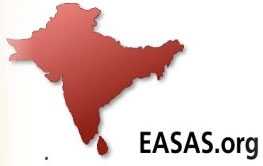 On 1 April 2011, SASNET’s director Dr. Anna Lindberg participated in the European Association of South Asian Studies (EASAS) Council meeting. The meeting was held at L’Ecole des Hautes Etudes en Sciences Sociales (EHSS) in Paris. The following members were present: Professor Roger Jeffrey (University of Edinburgh, President EASAS);
Dr. Margret Frenz (University of Leister, Vice President EASAS);
Professor Ulrike Müller-Böker (University of Zürich, Treasurer EASAS);
Dr. Heinz-Werner Wessler (University of Uppsala;
Professor Danuta Stasik (University of Warzaw);
Dr. Nicolas Jaoul (EHESS; and
Dr. Anna Lindberg (SASNET/Lund University. On 1 April 2011, SASNET’s director Dr. Anna Lindberg participated in the European Association of South Asian Studies (EASAS) Council meeting. The meeting was held at L’Ecole des Hautes Etudes en Sciences Sociales (EHSS) in Paris. The following members were present: Professor Roger Jeffrey (University of Edinburgh, President EASAS);
Dr. Margret Frenz (University of Leister, Vice President EASAS);
Professor Ulrike Müller-Böker (University of Zürich, Treasurer EASAS);
Dr. Heinz-Werner Wessler (University of Uppsala;
Professor Danuta Stasik (University of Warzaw);
Dr. Nicolas Jaoul (EHESS; and
Dr. Anna Lindberg (SASNET/Lund University.
Discussion were held regarding the upcoming 22nd EASAS conference to be held in Lisbon, Portugal in July 2012 (more information), and also future conferences in 2014 and 2016. The Council also discussed EASAS’ updated web page, www.easas.org, and all agreed that it has improved greatly, thanks to design work carried out by Ms. Julia Velkova from SASNET.
Finally, the Council members welcomed the coming collaboration between EASAS and SAMAJ – a peer reviewed on-line academic journal run by researchers from the Centre for South Asian Studies at EHESS. Dr. Loraine Kennedy and Dr. Stephanie Tawa Lama-Rewal, both from Centre for South Asian Studies at EHESS, were also present at this part of the meeting.
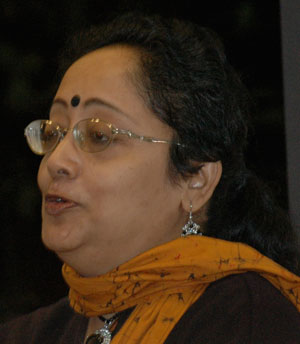 Professor Lipi Ghosh from the Dept. of South and South East Asian Studies, Calcutta University in Kolkata, India served as the first Visiting ICCR (Indian Council for Cultural Relations) Chair Professor at Lund University.
She stayed in Sweden from November 2010 till 5 April 2011. During this period she was hosted by the Faculty of Social Sciences, and had a workplace at the university’s Centre for Gender Studies.
As a visiting professor at Lund University, Prof. Ghosh was primarily engaged in research, but also took an active role in teaching. Professor Lipi Ghosh from the Dept. of South and South East Asian Studies, Calcutta University in Kolkata, India served as the first Visiting ICCR (Indian Council for Cultural Relations) Chair Professor at Lund University.
She stayed in Sweden from November 2010 till 5 April 2011. During this period she was hosted by the Faculty of Social Sciences, and had a workplace at the university’s Centre for Gender Studies.
As a visiting professor at Lund University, Prof. Ghosh was primarily engaged in research, but also took an active role in teaching. 
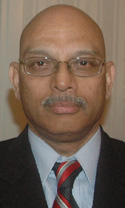 |
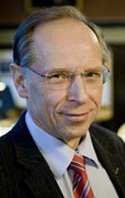 |
The ICCR professorship at Lund University is an outcome of a Memorandum of Understanding between the Indian Council for Cultural Relations (ICCR) and Lund University, that was signed on 22 June 2010 by Mr. Balkrishna Shetty, former Indian Ambassador to Sweden, and Prof. Per Eriksson, Vice-Chancellor, Lund University. In a first phase, the agreement is valid for four years, with a new Indian Professor to be selected each year.
SASNET was actively involved in finalizing the ICCR professorship at Lund University, with strong support from the Embassy of India in Stockholm. In April 2010, SASNET’s director, Dr. Anna Lindberg, participated in an official Lund University delegation to Delhi (more information), where final negotiations were held with representatives of the Ministry of External Affairs, Government of India, and the Indian Council for Cultural Relations, regarding the proposed Indian visiting guest professorship at Lund University.
A new ICCR Visiting Professor will come to Lund University in September 2011. More information will follow. 
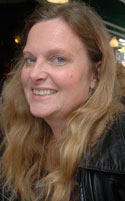 Associate Professor Maria Lantz from the Dept. of Art & Architecture at Royal Institute of Art (KKH), Stockholm, held a SASNET/Lund University seminar on Thursday 31 March 2011, 09.15–12.00. Her lecture was entitled ”Informal Cities” and was based on a 2008 book about the Dharavi slums in Mumbai, India, produced by Dr. Lantz and colleagues at KKH in collaboration with local organisations. The name of the book was ”Dharavi: Documenting Informalities” (more information). Associate Professor Maria Lantz from the Dept. of Art & Architecture at Royal Institute of Art (KKH), Stockholm, held a SASNET/Lund University seminar on Thursday 31 March 2011, 09.15–12.00. Her lecture was entitled ”Informal Cities” and was based on a 2008 book about the Dharavi slums in Mumbai, India, produced by Dr. Lantz and colleagues at KKH in collaboration with local organisations. The name of the book was ”Dharavi: Documenting Informalities” (more information).
The seminar was hosted by the Division of Housing Development and Management, Dept. of Architecture
and Built Environment, Lund University. Venue for the seminar: Design Lilla Hörsalen (DC:Lhö), Ingvar Kamprad Design Centre, Sölvegatan 26, Lund. 
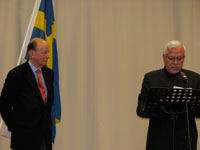 On the 27 January 2011, SASNET's acting webmaster/ deputy director, Julia Velkova, attended a reception organised by the Embassy of India in Stockholm on the occasion of the 62nd Republic Day of India. The reception was inaugurated with an Indian dance performance. It was followed by a speech by H.E. Mr. Ashok Sajjanhar, Ambassador of India in Sweden (photo, right). After him, the word was taken by Mr. Frank Belfrage, secretary of the state of Sweden (photo, left) who emphasized the active collaboration and positive relations between the two countries. The reception was accompanied by an exhibition of paintings by prominent Indian artists. On the 27 January 2011, SASNET's acting webmaster/ deputy director, Julia Velkova, attended a reception organised by the Embassy of India in Stockholm on the occasion of the 62nd Republic Day of India. The reception was inaugurated with an Indian dance performance. It was followed by a speech by H.E. Mr. Ashok Sajjanhar, Ambassador of India in Sweden (photo, right). After him, the word was taken by Mr. Frank Belfrage, secretary of the state of Sweden (photo, left) who emphasized the active collaboration and positive relations between the two countries. The reception was accompanied by an exhibition of paintings by prominent Indian artists. 
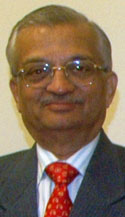 In the second week of December 2010, a delegation from DM Foundation, a private business corporation based in Kolhapur, Maharashtra, India, visited Lund University. Led by the eminent Indian nuclear scientist Dr. Anil Kakodkar (photo), they are involved in a dialogue with Lund University Commissioned Education and the Department of Biology, Lund University regarding plans to establish a new university campus in India and staff it with teachers from Lund University. SASNET has been involved as a consultant to Lund University. More information on the visit. In the second week of December 2010, a delegation from DM Foundation, a private business corporation based in Kolhapur, Maharashtra, India, visited Lund University. Led by the eminent Indian nuclear scientist Dr. Anil Kakodkar (photo), they are involved in a dialogue with Lund University Commissioned Education and the Department of Biology, Lund University regarding plans to establish a new university campus in India and staff it with teachers from Lund University. SASNET has been involved as a consultant to Lund University. More information on the visit.
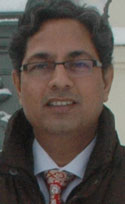 • Prof Swaran Singh from the Center for International Politics, Organisation and Disarmament, School of International Studies, Jawaharlal Nehru University (JNU) in Delhi, gave a SASNET lecture at Lund University on Friday 17 December 2010, 10.15-12.00. The seminar was co-organised by the university’s Department of Political Science.
The presentation was entitled ”India's Disarmament Policy: Past, Present, Future”, and included discussions on India's nuclear policy and India's foreign policy in general. Prof. Singh teaches in Diplomacy & Disarmament Studies, and has written extensively on Asian Affairs, China’s foreign and security policy issues with special focus on China-India confidence building measures as also on Arms Control and Disarmament, Peace and Conflict Resolution, India’s foreign and security policy issues. Besides, he is President of the Association of Asia Scholars (an Asia-Wide Network with Secretariat in Delhi), General Secretary of Indian Association of Asian & Pacific Studies (Varanasi) and Member, Bangkok-based Asian Scholarship Foundation’s Regional Review Committee for South Asia.
Venue for the seminar:
Lilla konferensrummet, 2nd floor, Dept. of Political Science (Eden),
Paradisgatan 5 H, Lund. More information, including abstract. • Prof Swaran Singh from the Center for International Politics, Organisation and Disarmament, School of International Studies, Jawaharlal Nehru University (JNU) in Delhi, gave a SASNET lecture at Lund University on Friday 17 December 2010, 10.15-12.00. The seminar was co-organised by the university’s Department of Political Science.
The presentation was entitled ”India's Disarmament Policy: Past, Present, Future”, and included discussions on India's nuclear policy and India's foreign policy in general. Prof. Singh teaches in Diplomacy & Disarmament Studies, and has written extensively on Asian Affairs, China’s foreign and security policy issues with special focus on China-India confidence building measures as also on Arms Control and Disarmament, Peace and Conflict Resolution, India’s foreign and security policy issues. Besides, he is President of the Association of Asia Scholars (an Asia-Wide Network with Secretariat in Delhi), General Secretary of Indian Association of Asian & Pacific Studies (Varanasi) and Member, Bangkok-based Asian Scholarship Foundation’s Regional Review Committee for South Asia.
Venue for the seminar:
Lilla konferensrummet, 2nd floor, Dept. of Political Science (Eden),
Paradisgatan 5 H, Lund. More information, including abstract. 
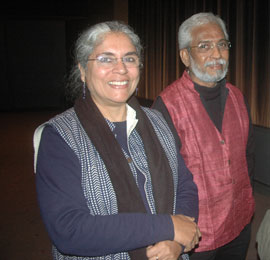 SASNET was partly involved when two Indian researchers cum film makers from the Centre for Media
and Cultural Studies, Tata Institute of Social
Sciences (TISS) in Mumbai, Professor K.P. Jayasankar and Professor Anjali
Monteiro, visited Lund University from 7–10 December 2010. They were invited to to participate in the second Focus Asia Documentary Film Festival, organised by Dr. Marina Svensson at the Centre for East and South-East Asian Studies (ACE). SASNET was partly involved when two Indian researchers cum film makers from the Centre for Media
and Cultural Studies, Tata Institute of Social
Sciences (TISS) in Mumbai, Professor K.P. Jayasankar and Professor Anjali
Monteiro, visited Lund University from 7–10 December 2010. They were invited to to participate in the second Focus Asia Documentary Film Festival, organised by Dr. Marina Svensson at the Centre for East and South-East Asian Studies (ACE).
During their stay in Lund, Jayasankar and Monteiro were introduced to SASNET, meeting the director, Dr. Anna Lindberg and deputy director, Mr. Lars Eklund. They also met other Lund University researchers and a number of Indian PhD students currently studying in Lund as being scholarship holders through the Erasmus Mundus Action 2 Indo-European mobility programme. More information. 
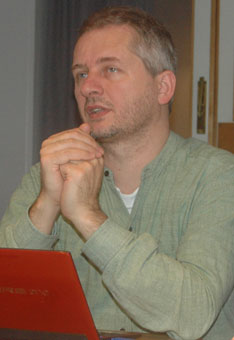 Dr. Heinz Werner Wessler,
Guest Professor at the Dept. of Linguistics
and Philology, Uppsala University, held a SASNET lecture at Lund University on ”The Liberating
Force of Hindi and ‘Goddess English‘.
Language Policies and Identity Politics in India”, on Monday 6 December 2010. The seminar was organised in collaboration with the Dept. of Political Science. Dr. Wessler took his starting point in the early anti-colonial classical “Hind Swaraj”,
published a hundred years ago (1910), in which Mahatma Gandhi stressed the importance of a shift away from English to the Hindi/Hindustani language as a basic tool of cultural decolonization. More information, including abstract. Dr. Heinz Werner Wessler,
Guest Professor at the Dept. of Linguistics
and Philology, Uppsala University, held a SASNET lecture at Lund University on ”The Liberating
Force of Hindi and ‘Goddess English‘.
Language Policies and Identity Politics in India”, on Monday 6 December 2010. The seminar was organised in collaboration with the Dept. of Political Science. Dr. Wessler took his starting point in the early anti-colonial classical “Hind Swaraj”,
published a hundred years ago (1910), in which Mahatma Gandhi stressed the importance of a shift away from English to the Hindi/Hindustani language as a basic tool of cultural decolonization. More information, including abstract.
During his two-days stay in Lund, Dr. Wessler interacted with SASNET’s deputy director Lars Eklund, discussing ongoing joint plans to commemorate the 150th birth anniversary of Gurudev Rabindranath Tagore in Sweden and Denmark in March 2011. Academic seminars are planned to be held in both Lund and Uppsala, besides Stockholm, Copenhagen and Aarhus.
Heinz Werner
also participated in in a seminar with Peter Leifland, Executive Vice President, Alfa Laval Group, that was organised in Lund on Tuesday 7 December by the Sweden India Business Council (SIBC). More information on this seminar. 
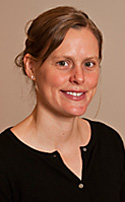 |
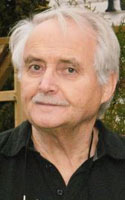 |
A SASNET/UPF seminar on ”Sri Lanka after the War was held in Lund on Wednesday 24 November 2010.
The first speaker was Dr. Camilla Orjuela, Peace and Development Studies, School of Global Studies, University of Gothenburg, who talked about ”Sri Lanka after the War: Sustainable Peace or new Conflicts?”, focusing on the fact that the 26 year long and brutal war came to an end in May 2009 as the Sri Lankan government
defeated the separatist Liberation Tigers of Tamil Eelam (LTTE). However, an end to the war
does not mean that the underlying conflicts that led to and sustained it have been dealt with. Camilla presented the challenges for post-war Sri Lanka: what are the underlying
conflicts that caused and were caused by the war and that have to be dealt with to reach
sustainable peace?
Then followed Professor Peter Schalk, Chair in the History of Religions (in particular in Hinduism and Buddhism) at the Faculty of Theology, Uppsala university. He held a presentation entitled ”Defeated but Defiant. The Ilamtamil Resistance Movement after May 2009”, largely focusing on the resistance movements still exisiting among
the Tamil speaking Diaspora in London, Sidney, Oslo, Paris, Berlin and Toronto demonstrating
defiance by keeping theur loyalty towards the Vattukottai resolution from 1976 that
demanded the recognition of the right of self-determination of the Tamil speaking people in
Ilam/Lanka.
The seminar was co-organised by SASNET and the Association of Foreign Affairs at Lund University (UPF). Venue for the seminar: Café Athen, Sandgatan 2, Lund.
See the poster for the seminar, including abstracts.
The entire seminar was recorded on video by the Association of Foreign Affairs, and can be seen on the web.
Go for the seminar video recording, part 1. 
Go for the seminar video recording, part 2. 
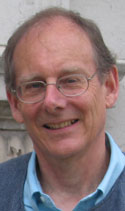 |
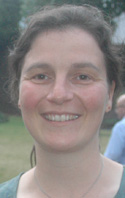 |
Professor Roger Jeffery and Dr. Margret Frenz, President and Vice-President respectively for the European Association of South Asian Studies (EASAS) visited SASNET and Lund University 8–10 November 2010. They came to discuss closer collaboration between EASAS and SASNET, as well as strenghtening links between Lund University and University of Edinburgh, UK in the field of South Asian studies. Prof. Jeffery is the Director for the Centre for South Asian Studies in Edinburgh, and Dr. Frenz is currently a Visiting Research Fellow at the University of Edinburgh’s Institute for Advanced Studies in the Humanities (but otherwise connected to the University of Leicester).
During their stay in Lund, they had long and fruitful discussions with Anna Lindberg and Lars Eklund from SASNET, but they also given an opportunity to meet representatives of the university’s Division of International Relations; the succcessful International Masters programme on Applied Management in Development (LUMID); and Lund University’s Centre of Excellence for Sustainability Studies (LUCSUS). 
See some photos.
SASNET and LUCSUS jointly organised a seminar with Roger Jeffery on Tuesday 9 November. The theme for the lecture was ”Trust and the Regulation of Pharmaceuticals: South Asia in a Globalised World”, based on material from a recently-concluded research project comparing the trajectories of pharmaceuticals from producer to patient in South Asia. In his presentation, Prof. Jeffery focused on ongoing disputes over quality standards in Indian generic drug manufacturering,
including allegations that they are responsible for a plague of counterfeit and spurious medicines, within India and globally.
Venue: Java Hall, Scheelevägen 15 B, Lund.
More information about the seminar. 
Later the same day, on Tuesday 9 November, Margret Frenz held another SASNET lecture, this time in collaboration with the Dept. of Sociology. She spoke about ”Making the World One’s Home. Goan Migration across the Indian Ocean and Beyond”, focusing on the migration of Goans (from the present day Indian state of Goa) from South Asia to East Africa in the 19th and 20th centuries, and their second migration from East Africa to countries such as the UK and Canada. By analysing their migration patterns, their economic, social and political engagement in East Africa and in this process, their ability to recreate material and social practices, Dr. Frenz highlights how one community has made the world its home.
Venue for the seminar: Conference room 3, Lund University, Dept. of Sociology, Paradisgatan 5, Lund.
More information about the seminar. 
 The Indian Council for Cultural Relations is actively working to set up more visiting professorships and chairs in Indian studies in foreign universities. Currently there are about 60 visiting ICCR professorships worldwide, but within a few years the ambition is that there should be 30 more such chairs around the world. In the Nordic countries ICCR professorships exist at Lund University and Copenhagen Business School. See the complete list of ICCR professorships. The Indian Council for Cultural Relations is actively working to set up more visiting professorships and chairs in Indian studies in foreign universities. Currently there are about 60 visiting ICCR professorships worldwide, but within a few years the ambition is that there should be 30 more such chairs around the world. In the Nordic countries ICCR professorships exist at Lund University and Copenhagen Business School. See the complete list of ICCR professorships.
The council is working to make the chairs “virtual hubs of Indian studies”. Programmes for youth audiences and lecture tours are being linked to institutions that have received ICCR endowments. This is all part of India’s efforts to project the country’s soft power. Currently, ICCR has 24 centres around the world, but it plans to add 15 new centres in the coming year. Related to the university focus has been ICCR’s move to sponsor academic seminars, an introduction of 30 ICCR fellowships to bring foreign scholars to India and 3,500 scholarships for overseas students, 1600 of which go to Afghans. The once iconic “festivals of India”, characteristic of the 1980s, have also been resurrected. In 2010, two long festivals are organised in China and France and half-a-dozen shorter ones in seven other countries. More information in a June 19, 2010 Hindustan Times article. 
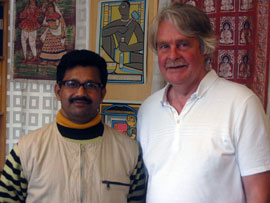 On Monday 8 November 2010, Dr. Sujit Kumar Paul, Senior Lecturer and Vice Principal for the Institute of Rural Reconstruction at Visva-Bharati University in Sriniketan, West Bengal, India, visited SASNET/Lund University. He met with SASNET’s deputy director Lars Eklund (seen on photo together), and also Dr. Olle Frödin from the School of Social Work, Lund University. On Monday 8 November 2010, Dr. Sujit Kumar Paul, Senior Lecturer and Vice Principal for the Institute of Rural Reconstruction at Visva-Bharati University in Sriniketan, West Bengal, India, visited SASNET/Lund University. He met with SASNET’s deputy director Lars Eklund (seen on photo together), and also Dr. Olle Frödin from the School of Social Work, Lund University.
Dr. Paul has spent four weeks in Denmark on invitation by the Association for World Education (AWE). He has been associated with this Denmark based organisation since 2001, and at its general meeting held at the International People's College (IPC) in Helsingør on 21-23 October 2010, Dr. Paul was elected as new Vice President.
AWE, started in 1995, has a consultative status of the United Nations. It has chapters and individual members all over the world. More information about AWE. 
During his stay in Denmark, Dr. Paul has also met researchers working on India related projects at the The Danish School of Education (DPU) in Copenhagen, and on 11-13 November he participates in the Asian Dynamics Initiative conference at Copenhagen University. During a panel on Indigenous Peoples in the 21st Century, he gives a presentation on ”Socio-Economic Development of the Tribals. The Changing Scenario Through Self Help Groups” (more information on the panel, convened by Dr. Peter B Andersen).
The two successful conferences for young Nordic scholars involved in South Asia related studies and research that SASNET organised 2009 and 2010 (more information about the 2010 conference), will get a follow-up in 2011. This time the conference, aimed at masters students, PhD candidates and young post-docs, will be jointly organised by SASNET and the Nordic Institute of Asian Studies (NIAS).
A decision regarding collaboration was taken at a meeting in Copenhagen on Tuesday 28 September 2010, between Anna Lindberg and Lars Eklund from SASNET, and NIAS Director Dr. Geir Helgesen, and other representatives of the institute. More information on the 2011 conference, that again will be held at Höllviken, south of Malmö, will be posted soon. 
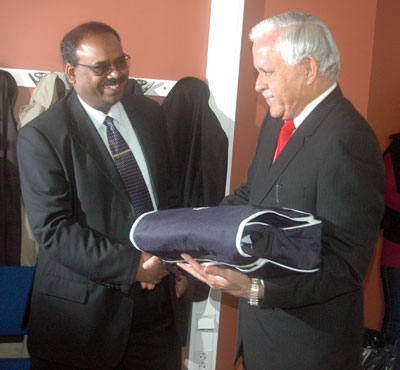 On Monday 1 November 2010, SASNET’s deputy director Lars Eklund participated in a half-day seminar at Stockholm University on Mahatma Gandhi, organised by the Embassy of India in Sweden. The seminar, entitled ”Is the Mahatma still relevant?”, was hosted by Prof. Vinayagum Chinapah and the Institute of International Education at Stockholm University and featured presentations by the Ambassador H.E. Mr. Ashok Sajjanhar and Prof. Chinapah (seen on the photo above). On Monday 1 November 2010, SASNET’s deputy director Lars Eklund participated in a half-day seminar at Stockholm University on Mahatma Gandhi, organised by the Embassy of India in Sweden. The seminar, entitled ”Is the Mahatma still relevant?”, was hosted by Prof. Vinayagum Chinapah and the Institute of International Education at Stockholm University and featured presentations by the Ambassador H.E. Mr. Ashok Sajjanhar and Prof. Chinapah (seen on the photo above).
Two other prominent speakers with a deep knowledge of Mahatma Gandhi were invited to elaborate on the subject, namely Prof. Björn Wittrock from Uppsala University, Principal of the Swedish Collegium for Advanced Study (SCAS); and Prof. Emeritus Ishtiaq Ahmed, Dept. of Political Science, Stockholm University. 
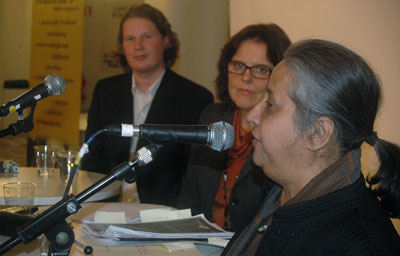 A SASNET seminar on ”Emancipation or Dependency: Microcredits in South Asia” was held in Lund on Wednesday 20 October 2010. The seminar was co-organised by The Association of Foreign Affairs at Lund University (UPF), and The Swallows India Bangladesh, an NGO based at Lund, and drew an audience of more than 100 people. The seminar featured Markus Pauli, Doctoral Candidate, University of Heidelberg, Germany who talked about ”Microfinance in India – assessing its impact with the capability approach”; and Ms. Khushi Kabir, Coordinator for Nijera Kori, a non governmental development organization in Bangladesh. Ms. Kabir gave a presentation entitled ”Setting Development Priorities: Economic Well Being or Empowerment for the Poorest”. The following discussion was moderated by Dr. Anna Lindberg, SASNET. A SASNET seminar on ”Emancipation or Dependency: Microcredits in South Asia” was held in Lund on Wednesday 20 October 2010. The seminar was co-organised by The Association of Foreign Affairs at Lund University (UPF), and The Swallows India Bangladesh, an NGO based at Lund, and drew an audience of more than 100 people. The seminar featured Markus Pauli, Doctoral Candidate, University of Heidelberg, Germany who talked about ”Microfinance in India – assessing its impact with the capability approach”; and Ms. Khushi Kabir, Coordinator for Nijera Kori, a non governmental development organization in Bangladesh. Ms. Kabir gave a presentation entitled ”Setting Development Priorities: Economic Well Being or Empowerment for the Poorest”. The following discussion was moderated by Dr. Anna Lindberg, SASNET.
More information about the seminar.
The entire seminar was recorded on video by the Association of Foreign Affairs, and can be seen on the web.
Go for the seminar video recording, part 1. 
Go for the seminar video recording, part 2. 
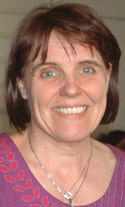 SASNET’s director, Dr. Anna Lindberg, held an informal public lecture at Lund University on Tuesday 2 November 2010, 15.15-17.00. She talked about ”Gender, Dowry, and the Marriage of Children in South India”. The seminar was organized by the University’s Global Gender Matters Network, hosted by the Department of Gender Studies. SASNET’s director, Dr. Anna Lindberg, held an informal public lecture at Lund University on Tuesday 2 November 2010, 15.15-17.00. She talked about ”Gender, Dowry, and the Marriage of Children in South India”. The seminar was organized by the University’s Global Gender Matters Network, hosted by the Department of Gender Studies.
The Global Gender Matters Network examines the transnational ways in which gender is configured socio-culturally, economically, and politically in Africa, Asia, the Caribbean, and Latin America.
The Network encourages scholars with a particular interest in global gender matters to meet and discuss how sexualized and racialized roles, relationships, powers, and conflicts inform gender ideas and practices in particular non-Western contexts. More information. 
 On 30 September 2010, SASNET’s national board was dissolved. This is an adaptation to the fact that SASNET is now entirely funded by Lund University. The board had its last meeting at Uppsala University on 11 May 2010. The main issue for the meeting was to discuss the changed situation for SASNET since the funding from the Swedish International Development Cooperation Agency (Sida) ended on December 31, 2009. On 30 September 2010, SASNET’s national board was dissolved. This is an adaptation to the fact that SASNET is now entirely funded by Lund University. The board had its last meeting at Uppsala University on 11 May 2010. The main issue for the meeting was to discuss the changed situation for SASNET since the funding from the Swedish International Development Cooperation Agency (Sida) ended on December 31, 2009.
The extensive work report for 2009 (go for it) was presented to the board by Anna and Lars, and the accounts were approved. The most important point was however the decision by the board, hitherto representing several Swedish universities (and also with representation for NGOs and other Nordic universities, see the organisation) to dissolve itself when the current term of office ended, by 30 September 2010. The decision was unanimous, and at the same time the board thanked Lund University for its decision to give extra funding for SASNET to survive through 2010 (more information). Since SASNET has evolved a strong position among Swedish researchers nationwide, the board members hope to continue collaborative work even with a new organisation of SASNET.
Read the Minutes from the last board meeting. 
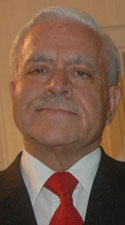 • On Monday 11 October 2010, the new Indian Ambassador to Sweden, H.E. Mr. Ashok Sajjanhar made a first visit to Lund University. The programme was planned for by SASNET, and included a lunch meeting with Ingalill Rahm Hallberg, Lund University Assistant Vice Chancellor (and Professor in Health Care Science);
Ann-Katrin Bäcklund, Dean for the Faculty of Social Sciences; and Gunilla Carlecrantz, Acting Head, Division of International Relations. Representatives of Division of International Relations informed te Ambassador about the Erasmus Mundus Action 2 mobility programmes that Lund university currently coordinates with Indian partner universities (more information). Per Malmberg, Sales Manager, Lund University Commissioned Education, discussed possible new India projects. The Ambassador also met a number of university professors, working on India related projects. • On Monday 11 October 2010, the new Indian Ambassador to Sweden, H.E. Mr. Ashok Sajjanhar made a first visit to Lund University. The programme was planned for by SASNET, and included a lunch meeting with Ingalill Rahm Hallberg, Lund University Assistant Vice Chancellor (and Professor in Health Care Science);
Ann-Katrin Bäcklund, Dean for the Faculty of Social Sciences; and Gunilla Carlecrantz, Acting Head, Division of International Relations. Representatives of Division of International Relations informed te Ambassador about the Erasmus Mundus Action 2 mobility programmes that Lund university currently coordinates with Indian partner universities (more information). Per Malmberg, Sales Manager, Lund University Commissioned Education, discussed possible new India projects. The Ambassador also met a number of university professors, working on India related projects.
A separate meting was held with SASNET’s director, Dr. Anna Lindberg, and deputy director, Mr. Lars Eklund, on details regarding the new ICCR professorship at Lund University, a position that will be taken up by Prof. Lipi Ghosh, Calcutta University from November 1st, 2010 (more information).
In the morning, the Ambassador also visited the university's Faculty of Engineering (LTH) where he was introduced by its Vice-Dean for International Relations, Prof. Per Warfvinge. He then got an opportunity to visit the Department of Electrical and Information Technology, where Prof. Ove Edfors presented its Masters programmes in System-on-Chip (SoC) and Wireless Communication. There, the Ambassador was introduced to Indian students/PhD candidates.

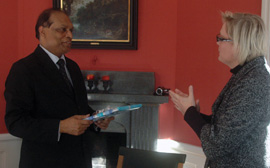 The Ambassador of Sri Lanka to Sweden, H.E. Mr. R.P. Jayasooriya also visited Lund University on Monday 11 October 2010. SASNET was involved in organising a meeting for the Ambassador, who came with a mission from the University Grants Commission of Sri Lanka to inform about the Srilankan government’s keen interest to promote strenghtened academic collaboration between universities in Sri Lanka and Sweden, and not the least with Lund University. A recent changed legislation that also opens up Sri Lanka for private university initiatives facilitates such efforts, according to Mr. Jayasooriya. The Ambassador of Sri Lanka to Sweden, H.E. Mr. R.P. Jayasooriya also visited Lund University on Monday 11 October 2010. SASNET was involved in organising a meeting for the Ambassador, who came with a mission from the University Grants Commission of Sri Lanka to inform about the Srilankan government’s keen interest to promote strenghtened academic collaboration between universities in Sri Lanka and Sweden, and not the least with Lund University. A recent changed legislation that also opens up Sri Lanka for private university initiatives facilitates such efforts, according to Mr. Jayasooriya.
Srilankan universities are already involved in several collaboration projects with Swedish universities, especially with the Royal Institute of Technology (KTH), Uppsala University and Gävle University. A few joint projects are also running with Lund University researchers. Besides, Lund University Commissioned Education is involved in a number of ongoing professional training courses with Srilankan participants.
The meeting with Mr. Jayasooriya was hosted by Ms. Gunilla Carlecrantz, Acting Head of Lund University’s International Relations division (seen on photo with the Ambassador above). The other participants were Ms. Emma Alfredsson, Project Manager, Lund University Commissioned Education; Mr. Henrik Hofvendahl, Programme Officer in charge of Asia activities, International Relations Office; plus Anna Lindberg and Lars Eklund from SASNET. 
In mid-August 2010, H.E. Mr. Ashok Sajjanhar took over as new Ambassador of India to Sweden and Latvia, based at Stockholm. Mr. Sajjanhar presented his Credentials to His Majesty Carl XVI Gustaf, King of Sweden, on Thursday 30 September 2010. In the evening a reception for invited guests was held at the Ambassador’s residence. SASNET was represented by Lars and Bubu Eklund. More information. 
 SASNET has been closely involved in the planning for a new Asia Regional Erasmus Mundus Action 2 mobility programme that was decided upon by the European Commission in July 2010 (more information). The project is led by Lund University that already since 2008 successfully coordinates an existing Indo-European Erasmus Mundus mobility programme. Now the university will also administer a new Asia Regional project that includes seven South Asian universities, four in India (Delhi University; Jadavpur University, Kolkata; Indian Institute of Technology Kanpur (IITK); and Tata Instititute of Social Sciences, Mumbai), and one each in Pakistan (Karachi University), Nepal (Tribhuvan University), and Bangladesh (Jahangirnagar University). SASNET has been closely involved in the planning for a new Asia Regional Erasmus Mundus Action 2 mobility programme that was decided upon by the European Commission in July 2010 (more information). The project is led by Lund University that already since 2008 successfully coordinates an existing Indo-European Erasmus Mundus mobility programme. Now the university will also administer a new Asia Regional project that includes seven South Asian universities, four in India (Delhi University; Jadavpur University, Kolkata; Indian Institute of Technology Kanpur (IITK); and Tata Instititute of Social Sciences, Mumbai), and one each in Pakistan (Karachi University), Nepal (Tribhuvan University), and Bangladesh (Jahangirnagar University).
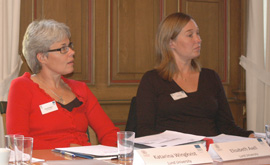 The project has been named EMEA – Erasmus Mundus Europe Asia – and will be open for applications from November 1, 2010 and remain open until December 15.
The project coordinators are Ms. Elisabeth Axell and Ms. Katarina Wingkvist, International Relations, Lund University (photo). The project has been named EMEA – Erasmus Mundus Europe Asia – and will be open for applications from November 1, 2010 and remain open until December 15.
The project coordinators are Ms. Elisabeth Axell and Ms. Katarina Wingkvist, International Relations, Lund University (photo).
Go for the EMEA project web site. 
A first consortium meeting was held in Lund 23–24 September 2010, when Vice Chancellors and international coordinators from the consortium member universities came to Lund for a hectic meeting to decide upon the principles for the selection process, discuss the implementation of the project, and to elect a steering committeee. During the kick-off meeting, it was also decided to set up four thematic groups – on quality assurance, on
development of joint projects, on events/conferences, and finally on a
visibility strategy for the project. SASNET’s deputy director Lars Eklund is a member of this visibility strategy group.
More information about the Lund kick-off meeting. 
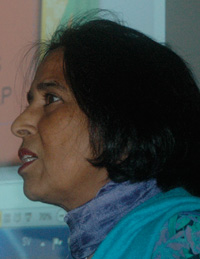 Professor Shahana Urooj Kazmi,
Pro-Vice Chancellor at the University of Karachi, Pakistan gave an engaged presentation entitled ”Devastating Floods in Pakistan:
A story of Pain, Grief and
Suffering – Can We Help?” at Lund University on Wednesday 22 September 2010. Prof. Kazmi, on a short visit to Lund to participate in the consortium meeting of the Erasmus Mundus Asia Regional mobility programme, mentioned above, gave an overview regarding the flood relief activities carried out
by teachers and students at her university in the Northern part of Sindh province, through the Karachi University
Disaster Management Volunteer Corps, a work carried out under the patronage of Chancellor Dr. Ishrat-ul Ibaad,
Vice Chancellor Dr. Przada Qasim R. Siddiqui and Pro VC Dr. Shahana Urooj Kazmi. She was introduced by SASNET’s deputy director, Lars Eklund. Professor Shahana Urooj Kazmi,
Pro-Vice Chancellor at the University of Karachi, Pakistan gave an engaged presentation entitled ”Devastating Floods in Pakistan:
A story of Pain, Grief and
Suffering – Can We Help?” at Lund University on Wednesday 22 September 2010. Prof. Kazmi, on a short visit to Lund to participate in the consortium meeting of the Erasmus Mundus Asia Regional mobility programme, mentioned above, gave an overview regarding the flood relief activities carried out
by teachers and students at her university in the Northern part of Sindh province, through the Karachi University
Disaster Management Volunteer Corps, a work carried out under the patronage of Chancellor Dr. Ishrat-ul Ibaad,
Vice Chancellor Dr. Przada Qasim R. Siddiqui and Pro VC Dr. Shahana Urooj Kazmi. She was introduced by SASNET’s deputy director, Lars Eklund.
A large audience of students and faculty from Lund University, some of them actually coming from University of Karachi, attended the
seminar and afterwards a group was formed to discuss immediate relief efforts. The seminar was jointly organised by SASNET and Lund University Centre for Sustainability Studies (LUCSUS).
Venue: Lecture Hall Världen,
Geocentrum 1, Sölvegatan 10, Lund.
More information about the seminar. 
The daily newspaper Sydsvenskan published an interview with Prof. Kazmi, on the new Erasmus Mundus mobility programme, on Thursday 23 September. Read the article entitled ”Utbytet med Asien ökar”. 
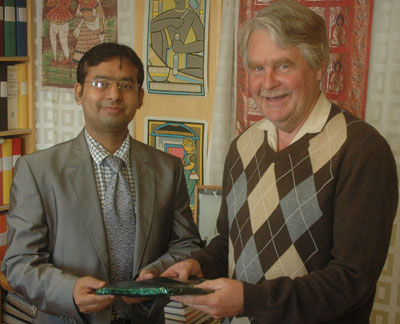 Associate Professor Jagannath Prasad Panda from the Institute for Defense
Studies and Analysis (ISDA) in New Delhi, India,
held a SASNET lecture on ”The Pattern of Sino-Indian Relations:
Evaluating the Strategic Discourse” at Lund University on
Wednesday 29 September 2010. The seminar was organised in collaboration with Associate Professor Catarina Kinnvall at the Department of
Political Science, Lund University. Dr. Panda works as a Research Fellow at IDSA, a premier think-tank body in India,
since August 2010. He is also the Managing Editor for the Peace and Development
Digest, published by Foundation for Peace and Sustainable Development in New Delhi.
He defended his doctoral dissertation in 2007 at the School of International Studies,
Jawaharlal Nehru University (JNU), New Delhi.
His research interests focuses on Sino-Indian relations. He has come to Sweden in connection with collaborative research work at the Institute for Security
and Development Policy (ISDP) in Nacka/Stockholm.
He is preparing a paper on ”China, India
and BRIC: Realist Interpretation of a Multi-polar World Order”. Venue for the seminar: Main conference hall (room 366), 2nd floor,
Dept. of Political Science, Paradisgatan 5, Lund. More information about the seminar. Associate Professor Jagannath Prasad Panda from the Institute for Defense
Studies and Analysis (ISDA) in New Delhi, India,
held a SASNET lecture on ”The Pattern of Sino-Indian Relations:
Evaluating the Strategic Discourse” at Lund University on
Wednesday 29 September 2010. The seminar was organised in collaboration with Associate Professor Catarina Kinnvall at the Department of
Political Science, Lund University. Dr. Panda works as a Research Fellow at IDSA, a premier think-tank body in India,
since August 2010. He is also the Managing Editor for the Peace and Development
Digest, published by Foundation for Peace and Sustainable Development in New Delhi.
He defended his doctoral dissertation in 2007 at the School of International Studies,
Jawaharlal Nehru University (JNU), New Delhi.
His research interests focuses on Sino-Indian relations. He has come to Sweden in connection with collaborative research work at the Institute for Security
and Development Policy (ISDP) in Nacka/Stockholm.
He is preparing a paper on ”China, India
and BRIC: Realist Interpretation of a Multi-polar World Order”. Venue for the seminar: Main conference hall (room 366), 2nd floor,
Dept. of Political Science, Paradisgatan 5, Lund. More information about the seminar.
During his stay in Lund, Dr. Panda also visited SASNET’s office and discussed with its deputy director Lars Eklund on possible future collaboration projects between the Indian Institute for Defense
Studies and Analysis, and SASNET. Photo from the meeting. 
During September 2010, SASNET’s Director, Dr. Anna Lindberg, spent one month at the Centre for Gender Studies, Kerala University, India. Anna was selected for a scholarship by the Erasmus Mundus Indo-European mobility program administered by Lund University (more information). At Kerala University, Anna collected research material for a forthcoming book on gender issues in South India. She also gave a guest lectures at the Centre for Development Studies (CDS) in Thiruvananthapuram. She talked about 'The Marriage of Children in Late Travencore:
Gender Discourses, Dowry, and the
Commercialization of Marriage'. See the poster for her September 20th seminar at CDS. 
While in Kerala, Anna was interviewed on her research work by the journalist Bhawani Cheerath. Read the article ”An ‘insider' in Kerala” that was published in The Hindu on 18 September 2010. 
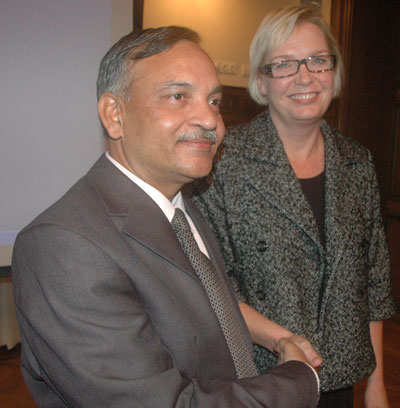 |
On Wednesday 1 September 2010, a delegation of Indian government officials from the Ministry of New and Renewable Energy, researchers and business people working in the field of Biogas production and utilization in India visited Lund University in order to meet Indian students, and representatives of the International Relations department in charge of the university’s ongoing and coming Indo-European and South Asian regional-European Erasmus Mundus mobility programmes. The delegation was headed by Dr. Atma Ram Shukla from the Indian Ministry of New and Renewable Energy, and accompanied by Mr. Mikael Kullman, Counsellor and Special Attaché for Environment, Climate Control and Energy at the Swedish Embassy in New Delhi.
SASNET’s deputy director Lars Eklund also got time to present the Lund University based SASNET network. More information.
 • Prof. Venkatesh B. Athreya, R.S.S. Swaminathan Research Foundation in Chennai, India, held a well-attended lecture on ”Food Security Challenge in India” at Lund University on Friday 17 September 2010, 10.15–12.00. The seminar was jointly organised by SASNET and the Research group Society, Development, Environment (Samhälle, utveckling och miljö) at the Department of Sociology. • Prof. Venkatesh B. Athreya, R.S.S. Swaminathan Research Foundation in Chennai, India, held a well-attended lecture on ”Food Security Challenge in India” at Lund University on Friday 17 September 2010, 10.15–12.00. The seminar was jointly organised by SASNET and the Research group Society, Development, Environment (Samhälle, utveckling och miljö) at the Department of Sociology.
Prof. Athreya has been co-operating for many years with Prof. Göran Djurfeldt and Prof. Emeritus Staffan Lindberg at Lund University. Among his most well-known publications are “Literacy and Empowerment” (Sage 1996) and “Barriers Broken” (with Djurfeldt and Lindberg, Sage 1990). Currently he is, just like Dr. Rajagopal mentioned above, co-operating with Djurfeldt and Lindberg at Lund University in a restudy after 25 years of 213 agricultural households in the Cauvery delta in Tamilnadu.
The lecture at Lund University was based on the 2009 World Food programme report ”State of Food Insecurity in Rural India”, to which he contributed (more information). Venue for the seminar:
Dept. of Sociology, Conference room no. 1 (335), Paradisgatan 5, Lund.
See the poster for the lecture. 
• Dr. A. Rajagopal, R.S.S. Swaminathan Research Foundation in Chennai, India, lectured on ”Water Management and Agrarian change in India” at Lund University on Monday 13 September 2010, 13.15–15.00. The seminar was jointly organised by SASNET and the Research group Society, Development, Environment (Samhälle, utveckling och miljö) at the Department of Sociology. Dr. Rajagopal received his PhD on Water Management in 1991. After that, he worked for many years as a researcher with the South Asia Consortium for Inter Disciplinary Water Resources Studies at Hyderabad, India. Currently he is co-operating with Prof. Göran Djurfeldt and Prof. Emeritus Staffan Lindberg at Lund University in a restudy after 25 years of 213 agricultural households in the Cauvery delta in Tamil Nadu. Dr. Rajagopal’s lecture is based on a paper presented at the 2010 World Water Week at Stockholm (more information). Venue for the seminar:
Dept. of Sociology, Conference room no. 2 (405), Paradisgatan 5, Lund. 
 The 21st European Conference on (Modern) South Asian Studies, ECMSAS, was successfully organised by the University of Bonn on 26–29 July 2010. More then 300 scholars involved in research related
to the South Asian region participated in
the conference, featuring a total number of 41 panels,
covering a broad range of research subjects. SASNET’s deputy director Lars Eklund participated in the conference. He has posted on SASNET’s web site a personal report full with photos. Go for Lars’ report from Bonn. The 21st European Conference on (Modern) South Asian Studies, ECMSAS, was successfully organised by the University of Bonn on 26–29 July 2010. More then 300 scholars involved in research related
to the South Asian region participated in
the conference, featuring a total number of 41 panels,
covering a broad range of research subjects. SASNET’s deputy director Lars Eklund participated in the conference. He has posted on SASNET’s web site a personal report full with photos. Go for Lars’ report from Bonn. 
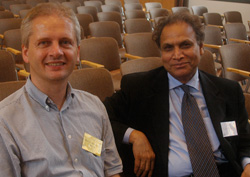 |
The conference convener was Dr. Heinz Werner Wessler, scientific collaborator at the Institute for Oriental and Asian Studies, University of Bonn, but also since last year connected to the Department of Linguistics and Philology, Uppsala University, Sweden as a guest Professor in Hindi.
Prof. Sukhadeo Thorat, Chairman for the Indian University Grants Commission had been invited to hold the Ambedkar Lecture. His engaged presentation was entitled ”Identity, Social Exclusion and Deprived Groups. Search for Inclusive Society in Contemporary International Context”.
The ECMSAS conferences are held biannually under the aegis of the European Association of South Asian Studies (EASAS), a professional, non-profit organisation of scholars engaged in research and teaching concerning South Asia with regard to all periods and fields of study.
The council of the EASAS consists of a president (Prof. Roger Jeffery, University of Edinburgh, UK), vice-president and treasurer, and in addition, of six other European members reflecting the various academic disciplines represented by the Association. At EASAS’ General Meeting, held on 27 July 2010, SASNET’s Director, Dr. Anna Lindberg, was elected to become one of the new members to the council for the two-year period 2010-12. More information about EASAS.
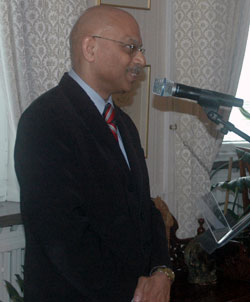 On Tuesday 8 June 2010, SASNET’s director Anna Lindberg and deputy director Lars Eklund participated in the farewell party for the outgoing Ambassador of India to Sweden and Latvia, Mr. Balkrishna Shetty. The reception was held at the Embassy of India in Stockholm (photo from the event). Mr. Shetty, with whom SASNET has had much positive interaction during the past two years, now retires from diplomatic service and returns to Delhi. On Tuesday 8 June 2010, SASNET’s director Anna Lindberg and deputy director Lars Eklund participated in the farewell party for the outgoing Ambassador of India to Sweden and Latvia, Mr. Balkrishna Shetty. The reception was held at the Embassy of India in Stockholm (photo from the event). Mr. Shetty, with whom SASNET has had much positive interaction during the past two years, now retires from diplomatic service and returns to Delhi. 
 During their stay in Stockholm, Anna and Lars also met with Dr. Maria Lantz, Department of Art & Architecture, Royal University College of Fine Arts (KKH), to discuss a coming one-year KKH course on ”Textilism”, focusing on Sri Lanka. To some extent, the course has been planned in collaboration with the artist Jesper Nordahl who has spent long time in the country, and recently produced the “Katunayake FTZ/Kotmale Project”, including a series of videos investigating the political context and impact of the neoliberal restructuring policies initiated in the late seventies by IMF and the World Bank. Information about the course (in Swedish only). During their stay in Stockholm, Anna and Lars also met with Dr. Maria Lantz, Department of Art & Architecture, Royal University College of Fine Arts (KKH), to discuss a coming one-year KKH course on ”Textilism”, focusing on Sri Lanka. To some extent, the course has been planned in collaboration with the artist Jesper Nordahl who has spent long time in the country, and recently produced the “Katunayake FTZ/Kotmale Project”, including a series of videos investigating the political context and impact of the neoliberal restructuring policies initiated in the late seventies by IMF and the World Bank. Information about the course (in Swedish only). 
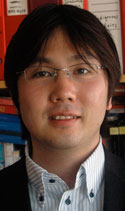 On Wednesday 2 June 2010, PhD candidate Naonori Kusakabe from the Center for South Asian Studies at Gifu Women's University in Japan visited SASNET’ office in Lund, where he met with its deputy director Lars Eklund. From the spring 2010, Mr. Kusakabe is connected to the Stockholm School of Economics, and its European Institute of Japanese Studies as a Visiting researcher, first in Stockholm and then from July 2010 based at the University of Dhaka in Bangladesh.
He is currently working on a comparative study of Swedish and Japanese Official Development Assistance (ODA) towards Bangladesh both now and in the past. He has spent more than four years in Bangladesh, and in 2006 he wrote his Masters thesis on ”NGOs and Local People: A Case Study of Hatiya Island in Bangladesh”. More information. On Wednesday 2 June 2010, PhD candidate Naonori Kusakabe from the Center for South Asian Studies at Gifu Women's University in Japan visited SASNET’ office in Lund, where he met with its deputy director Lars Eklund. From the spring 2010, Mr. Kusakabe is connected to the Stockholm School of Economics, and its European Institute of Japanese Studies as a Visiting researcher, first in Stockholm and then from July 2010 based at the University of Dhaka in Bangladesh.
He is currently working on a comparative study of Swedish and Japanese Official Development Assistance (ODA) towards Bangladesh both now and in the past. He has spent more than four years in Bangladesh, and in 2006 he wrote his Masters thesis on ”NGOs and Local People: A Case Study of Hatiya Island in Bangladesh”. More information. 
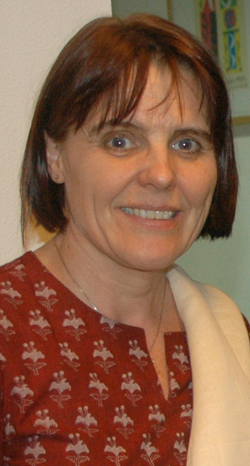 SASNET’s director, Dr. Anna Lindberg, participated in an official Lund University (LU) delegation travelling to India in the last week of April 2010. The group was led by Eva Åkesson, Lund University Pro Vice-Chancellor, who participated in the Universitas 21 Symposium held at Delhi University. Universitas 21 is an international network of 21 leading research-intensive universities in thirteen countries, among them Lund and Delhi (more information). SASNET’s director, Dr. Anna Lindberg, participated in an official Lund University (LU) delegation travelling to India in the last week of April 2010. The group was led by Eva Åkesson, Lund University Pro Vice-Chancellor, who participated in the Universitas 21 Symposium held at Delhi University. Universitas 21 is an international network of 21 leading research-intensive universities in thirteen countries, among them Lund and Delhi (more information).
During the visit,
negotiations were held with representatives of the Ministry of External Affairs, Government of India, and the Indian Council for Cultural Relations (ICCR), regarding details of a Memorandum of Understanding (MoU) concerning a proposed Indian visiting guest professorship at Lund University that was later realized already from the academic year 2010/11.
Anna also participated in the Lund University delegation’s official visits to Jawaharlal Nehru University, the India-EU Study Centres Programme (IESCP), and Delhi University, where another MoU was signed.
Read Anna’s report from the delegation visit to Delhi. 
 • A successful seminar on Arsenic in Drinking Water was held at Lund University on Wednesday 5 May 2010. The well-attended seminar drew a mixed audience of researchers, students and other interested people. The seminar was organized by SASNET in collaboration with Lund University Centre for Sustainability Studies (LUCSUS); the Division of Water Resources Engineering, Lund University; KTH-International Groundwater Arsenic Research Group at the Dept. of Land and Water Resources Engineering, Royal Institute of Technology (KTH), Stockholm; and The Swallows India-Bangladesh section. H.E. Mr. Imtiaz Ahmed, Ambassador of Bangladesh to Sweden was the guest of honour during the day. • A successful seminar on Arsenic in Drinking Water was held at Lund University on Wednesday 5 May 2010. The well-attended seminar drew a mixed audience of researchers, students and other interested people. The seminar was organized by SASNET in collaboration with Lund University Centre for Sustainability Studies (LUCSUS); the Division of Water Resources Engineering, Lund University; KTH-International Groundwater Arsenic Research Group at the Dept. of Land and Water Resources Engineering, Royal Institute of Technology (KTH), Stockholm; and The Swallows India-Bangladesh section. H.E. Mr. Imtiaz Ahmed, Ambassador of Bangladesh to Sweden was the guest of honour during the day.
More information.
Read a full report from the seminar.
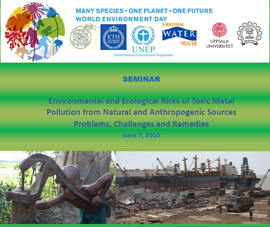 SASNET again co-organised a similar seminar on Toxic Metal Pollution in Stockholm on the World Environmental Day 2010, that is Monday 7 June 2010. The seminar, entitled ”Environmental and Ecological Risks of Toxic Metal Polution from Natural and Anthropogenic Sources. Problems, Challenges and Remedies”, was held at the Royal Institute of Technology (KTH) and was organised in collaboration with the KTH-International Groundwater Arsenic Research Group (based at the Dept. of Land and Water Resources Engineering); Uppsala University; Swedish Maritime Environmental Markets (SMEM) in Uppsala, representing a group of Swedish companies with expertise in safety, health and environmental technology; and the
Centre for Environmental Science and Engineering (CESE) at the
Indian Institute of Technology Bombay (IITB), India. The key persons behind the workshop were Prof. Shyam R. Asolekar from CESE, Prof. Prosun Bhattacharya from KTH, and Mr. Alexander Kinigalakis, SMEM Coordinator. SASNET again co-organised a similar seminar on Toxic Metal Pollution in Stockholm on the World Environmental Day 2010, that is Monday 7 June 2010. The seminar, entitled ”Environmental and Ecological Risks of Toxic Metal Polution from Natural and Anthropogenic Sources. Problems, Challenges and Remedies”, was held at the Royal Institute of Technology (KTH) and was organised in collaboration with the KTH-International Groundwater Arsenic Research Group (based at the Dept. of Land and Water Resources Engineering); Uppsala University; Swedish Maritime Environmental Markets (SMEM) in Uppsala, representing a group of Swedish companies with expertise in safety, health and environmental technology; and the
Centre for Environmental Science and Engineering (CESE) at the
Indian Institute of Technology Bombay (IITB), India. The key persons behind the workshop were Prof. Shyam R. Asolekar from CESE, Prof. Prosun Bhattacharya from KTH, and Mr. Alexander Kinigalakis, SMEM Coordinator.
Whereas Prof. Bhattacharya focused on the Arsenic problem in his seminar presentation – the same as in Lund, Prof. Asolekar spoke about ”The Environmental and Ecological Implications of Trace Metal Pollution caused by Ship Dismantling and Recycling”. He also moderated the concluding panel debate.
Read the conference report.
 In early November 2010, SASNET had planned to organise a one and a half day conference at Lund University, on the constitution-making process in Nepal. The conference would be jointly organised by SASNET and the Institute for Security& Development Policy (ISDP) in Stockholm. As a preparation, SASNET’s director Anna Lindberg, and SASNET intern Nihat Ulusoy, visited ISDP on 30 November 2009. They met with the ISDP’s director Niklas Swanström, and its deputy director Robert Nilsson.
The 2010 conference is supposed not only to discuss the constitution-making process in Nepal, but also support the Nepalese in their task by exchanging new ideas and brain storming. The background is the fact that the Constituent Assembly was endowed with drafting a new permanent constitution after the 10 April 2008 elections in Nepal. The deadline for this work is now approaching.
Participants for the forum are supposed to be invited from four Nordic countries: Finland, Sweden, Norway, and Denmark. Another 4-5 researchers from Nepal will be invited, as well as the Nepalese Ambassador to Scandinavia. However, enough funding has so far not been procured, so the prospects for actually holding the conference are uncertain. In early November 2010, SASNET had planned to organise a one and a half day conference at Lund University, on the constitution-making process in Nepal. The conference would be jointly organised by SASNET and the Institute for Security& Development Policy (ISDP) in Stockholm. As a preparation, SASNET’s director Anna Lindberg, and SASNET intern Nihat Ulusoy, visited ISDP on 30 November 2009. They met with the ISDP’s director Niklas Swanström, and its deputy director Robert Nilsson.
The 2010 conference is supposed not only to discuss the constitution-making process in Nepal, but also support the Nepalese in their task by exchanging new ideas and brain storming. The background is the fact that the Constituent Assembly was endowed with drafting a new permanent constitution after the 10 April 2008 elections in Nepal. The deadline for this work is now approaching.
Participants for the forum are supposed to be invited from four Nordic countries: Finland, Sweden, Norway, and Denmark. Another 4-5 researchers from Nepal will be invited, as well as the Nepalese Ambassador to Scandinavia. However, enough funding has so far not been procured, so the prospects for actually holding the conference are uncertain. 
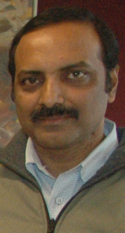 Professor Sudipta Bhattacharya from the Dept. of Economics and Politics, Visva-Bharati University, Santiniketan, India, and currently Visiting Professor at the Asia Research Centre, Copenhagen Business School (CBS), held a SASNET lecture on ”Neo-liberalism, Weaking State and
Peasant Differentiation in Indian Agriculture” at Lund University on Wednesday 26 May 2010. The seminar was organized in collaboration with the Department of Sociology, Lund University, and is based on Prof. Bhattacharya’s Survey Findings from Panel Data in West Bengal during the periods 1993-94, and 2004-05. He analyses the changing structure of investment and production over a
period of neo-liberal policy regime in India that the Left Front government in West Bengal had to accept as a constitutional compulsion. The interventionist legacy of empowerment of rural poor through land reform and rural transformation through decentralized
participatory governance in the state had been disturbed since 1991 when the Indian government adopted neo-liberal policies of cutting fertilizer, food and credit subsidies in agriculture, conversion of 8 millions hectares of land from food to export oriented crops, making PDS and nationalized/co-operative banks less effective for the poor. Venue: Department of Sociology,
room 335, Paradisgatan 5, Lund. More information. Professor Sudipta Bhattacharya from the Dept. of Economics and Politics, Visva-Bharati University, Santiniketan, India, and currently Visiting Professor at the Asia Research Centre, Copenhagen Business School (CBS), held a SASNET lecture on ”Neo-liberalism, Weaking State and
Peasant Differentiation in Indian Agriculture” at Lund University on Wednesday 26 May 2010. The seminar was organized in collaboration with the Department of Sociology, Lund University, and is based on Prof. Bhattacharya’s Survey Findings from Panel Data in West Bengal during the periods 1993-94, and 2004-05. He analyses the changing structure of investment and production over a
period of neo-liberal policy regime in India that the Left Front government in West Bengal had to accept as a constitutional compulsion. The interventionist legacy of empowerment of rural poor through land reform and rural transformation through decentralized
participatory governance in the state had been disturbed since 1991 when the Indian government adopted neo-liberal policies of cutting fertilizer, food and credit subsidies in agriculture, conversion of 8 millions hectares of land from food to export oriented crops, making PDS and nationalized/co-operative banks less effective for the poor. Venue: Department of Sociology,
room 335, Paradisgatan 5, Lund. More information.
• Professor Gitiara Nasreen, Professor & Chair, Department of Mass Communication and Journalism, Dhaka University, Bangladesh, held a SASNET lecture on ”Images of Gender on Media in Bangladesh” at Lund University on Monday 24 May 2010. The seminar was organized in collaboration with the Department of Sociology, Lund University. More information about the seminar.
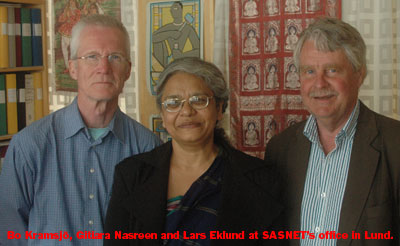 Prof. Nasreen had come to Sweden on invitation by The Global School Sweden (Globala Skolan), a programme run by the International Programme Office for Education and Training and supported by Sida, in order to participate in a Sida-funded seminar on the responsibility of the rich world – twenty-four hours for global learning, held in Stockholm 20–21 May (more information), but then travelled to Lund to visit researchers and students at relevant departments at Lund University – a visit planned for by SASNET’s Lars Eklund. Prof. Nasreen had come to Sweden on invitation by The Global School Sweden (Globala Skolan), a programme run by the International Programme Office for Education and Training and supported by Sida, in order to participate in a Sida-funded seminar on the responsibility of the rich world – twenty-four hours for global learning, held in Stockholm 20–21 May (more information), but then travelled to Lund to visit researchers and students at relevant departments at Lund University – a visit planned for by SASNET’s Lars Eklund.
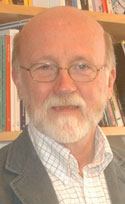 Accompanied by Mr. Bo Kramsjö, representative for Globala Skolan, she visited Lund University’s Dept. of Media and Communication Studies, where Prof. Peter Dahlgren (photo) had organised a programme including meeting with students and researchers. Before the afternoon seminar at the Dept. of Sociology, Prof. Nasreen was also given an opportunity to visit SASNET’s office at Scheelevägen. Accompanied by Mr. Bo Kramsjö, representative for Globala Skolan, she visited Lund University’s Dept. of Media and Communication Studies, where Prof. Peter Dahlgren (photo) had organised a programme including meeting with students and researchers. Before the afternoon seminar at the Dept. of Sociology, Prof. Nasreen was also given an opportunity to visit SASNET’s office at Scheelevägen.
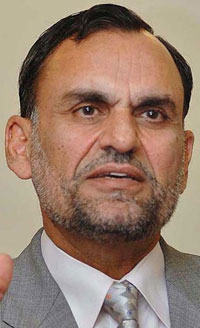 • Muhammad Azam Khan Swati,
federal minister of Science and Technology from Pakistan, participated in a seminar on ”The Role of Overseas Pakistani
Students in Nation Building” at Lund University on
Saturday 22 May 2010. As a minister, Mr. Khan Swati has among other things played a pivotal role in establishing the Hazara University in District
Mansehra. It is the only institution of higher learning in the area with special emphasis on universal
values.
The seminar was organised by Pakistani students of Asian Studies at Lund University,
and Mr. Muhammad Athar Javed, South Asia expert in Copenhagen, Denmark (who also spoke at the seminar),
with support from SASNET.
The seminar was introduced by Dr. Anna Lindberg, Director of SASNET. After the Minister’s lecture, time was provided for an interactive
debate/question-answer session. Refreshments along with Pakistani food were served. Venue: Hörsalen, Kårhuset, Faculty of Engineering (LTH), John Ericssons väg 3, Lund. More information. • Muhammad Azam Khan Swati,
federal minister of Science and Technology from Pakistan, participated in a seminar on ”The Role of Overseas Pakistani
Students in Nation Building” at Lund University on
Saturday 22 May 2010. As a minister, Mr. Khan Swati has among other things played a pivotal role in establishing the Hazara University in District
Mansehra. It is the only institution of higher learning in the area with special emphasis on universal
values.
The seminar was organised by Pakistani students of Asian Studies at Lund University,
and Mr. Muhammad Athar Javed, South Asia expert in Copenhagen, Denmark (who also spoke at the seminar),
with support from SASNET.
The seminar was introduced by Dr. Anna Lindberg, Director of SASNET. After the Minister’s lecture, time was provided for an interactive
debate/question-answer session. Refreshments along with Pakistani food were served. Venue: Hörsalen, Kårhuset, Faculty of Engineering (LTH), John Ericssons väg 3, Lund. More information.
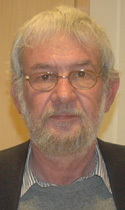 Nils Finn Munch-Petersen, Senior expert at the Nordic Institute of Asian Studies (NIAS) in Copenhagen, Denmark, held an open SASNET lecture at Lund University on Tuesday 27 April 2010. Nils Finn Munch-Petersen talked about ”The Maldives – Paradise Lost?”, focusing on the current developments in the Indian Ocean republic, claimed to be threatened by a rise in sea level due to expected global warming. However, more immediate threats are issues such as a break-down of society caused by a growing economic and demographic imbalance precipitated by uncontrolled tourism growth and the influx of lowly-paid foreign workers. This leads to social inequality, a growing number of unemployed youth, narcotics related criminality and a growing Islamic fundamentalism. Nils Finn Munch-Petersen, Senior expert at the Nordic Institute of Asian Studies (NIAS) in Copenhagen, Denmark, held an open SASNET lecture at Lund University on Tuesday 27 April 2010. Nils Finn Munch-Petersen talked about ”The Maldives – Paradise Lost?”, focusing on the current developments in the Indian Ocean republic, claimed to be threatened by a rise in sea level due to expected global warming. However, more immediate threats are issues such as a break-down of society caused by a growing economic and demographic imbalance precipitated by uncontrolled tourism growth and the influx of lowly-paid foreign workers. This leads to social inequality, a growing number of unemployed youth, narcotics related criminality and a growing Islamic fundamentalism.
Nils Finn Munch-Petersen is a social anthropologist who first visited the Maldives in the 1970s, and has since travelled extensively in the Northern and Southern Atolls for research and work for international organizations such as UNDP, UNICEF, UNFPA, and the World Bank. He is considered to be one of the leading, non-Maldivian, world specialists on the Maldives.
Another leading Nordic Maldives expert, Professor Emeritus Nils-Axel Mörner, previously connected to the Unit of Palegeophysics and Geodynamics, Stockholm University, was one among the audience, and his presence ensured a vital debate on the real problems that the Indian Ocean republic currently faces.
Venue for the seminar: Conference room, Centre for East and South-East Asian Studies (ACE), Lund University. More information.
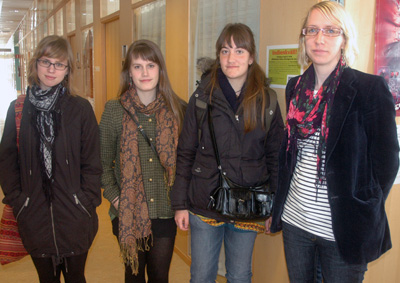 |
A group of folk highschool students from Geijerskolan in Ransäter, and their teacher MS. Lina Bernäng, visited SASNET’s root node office in Lund on Monday 26 April 2010. The students participate in a one-year course entitled ”Filosofi och Världsbild”, where they study both Western Philosophy and Indian Religions and History, partly in collaboration with Karlstad University. The course includes a tour to India. More information about the course.
They now came to Lund in order to meet SASNET’s deputy director Lars Eklund, and from him get a presentation of India related research at the Swedish universities. 
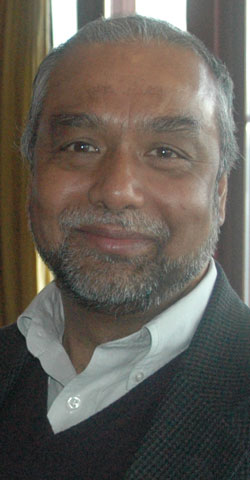 Anthony P. D'Costa,
Professor of Indian Studies at the
Asia Research Centre (ARC),
Copenhagen Business School, held an open SASNET lecture at Lund University on Monday 19 April 2010, 11.15–13.00. He talked about ”India's Changing
Role in the Global Political Economy”. Anthony P. D'Costa,
Professor of Indian Studies at the
Asia Research Centre (ARC),
Copenhagen Business School, held an open SASNET lecture at Lund University on Monday 19 April 2010, 11.15–13.00. He talked about ”India's Changing
Role in the Global Political Economy”.
The seminar was inaugurated
by the Indian Ambassador to Sweden, H.E. Mr. Balkrishna Shetty, who also gave some some opening remarks.
Prior he came to ARC in 2008, Prof. Anthony D’Costa was with the University of Washington for eighteen years. He has written extensively on the global steel, Indian automobile and IT industries, globalization, development, innovations, and industrial restructuring. He is currently working on globalization and the international mobility of IT workers examining migration pattern, immigration policies, national innovation systems, and tertiary education in India, China, Japan, and the US, co-authoring a photographic essay on Indian modernity and industrialization, and editing volumes on economic nationalism and the development experiences of India and China. More information about Anthony D’Costa.
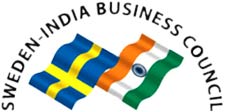 The seminar was co-organised by the Sweden India Business Council (SIBC), and held with kind support from the Embassy of India in Sweden. The seminar was co-organised by the Sweden India Business Council (SIBC), and held with kind support from the Embassy of India in Sweden.
Venue for the seminar: Museum of Cultural History/Auditorium (Kulturens hörsal), Tegnérplatsen, Lund.
More information about the seminar.
 After the seminar, Lund University Vice Chancellor Prof. Per Eriksson invited the Indian Ambassador, the First Secretary Mrs. Madhumita Bhagat and Prof. D’Costa for an official lunch at the Old Bishop’s House. After the seminar, Lund University Vice Chancellor Prof. Per Eriksson invited the Indian Ambassador, the First Secretary Mrs. Madhumita Bhagat and Prof. D’Costa for an official lunch at the Old Bishop’s House.
The lunch was also attended by the University Director Dr. Marianne Granfelt, Anna Lindberg and Lars Eklund from SASNET, SIBC Senior Advisor Mr. Stig Victorin, and a few invited guests from Lund University. 
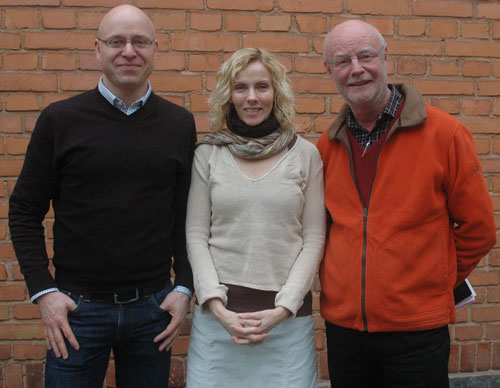 |
On Wednesday 31 March 2010, SASNET’s deputy director Lars Eklund visited the Stockholm Environment Institute (SEI) at Kräftriket in Stockholm. The aim of the visit was, like so many previous visits to other Swedish universities, to meet some of the researchers involved in South Asia related activities. SEI is an eminent independent, international
research institute specializing in sustainable development and environment
issues. It works at local, national, regional and global policy
levels from seven research centres all over the world. The SEI research programmes aim to clarify the requirements,
strategies and policies for a transition to sustainability. SEI is also a leading partner in The Stockholm Resilience Centre, a Swedish Centre of Excellence established in 2007 (more information).
A fruitful meeting was held where Lars met with Mats Lannerstad, Elisabeth Kvarnström, and Göran Nilsson Axberg, Research Fellows at SEI that partly works with South Asia related projects. They presented the projects of interest that are carried out by them and their SEI colleagues in Stockholm, York, Bangkok and other places, e g programmes on sustainable sanitation in India and Nepal, Agroecosystems in India, Pollution monitoring programmes in South Asia, etc. More information about South Asia related research at SEI. 
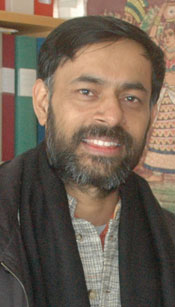 Prof. Yogendra Yadav, Senior Fellow at the Centre for the Study of Developing Societies, Delhi, India, held a SASNET lecture on ”Democracy and Poverty in India”, on Thursday 18 March 2010. The well-attended seminar was organised in collaboration with the Centre for East and South-East Asian Studies (ACE). Yadav is a Fellow at the Institute of Advanced Study at Berlin, Germany, during the academic year 2009–2010. His areas of interests include democratic theory, election studies, survey research, political theory, modern Indian political thought and Indian socialism. He has co-authored State of Democracy in South Asia (OUP, 2008) and co-edited (with Sandeep Shastri and K C Suri) Electoral Politics in Indian States (OUP, 2009). He has also been involved in designing and coordinating the National Election Studies, the most comprehensive series of academic surveys of the Indian electorate, from 1996 to 2009. In his presentation, he focused on the co-existence of democracy and poverty, specifically the continued existence of electoral democracy with popular participation along with mass poverty. The paradox is not trivial: we have good reasons to be surprised about it. Making sense of this paradox takes us to the explanatory framework that may shed light on the mechanism that makes this paradoxical co-existence possible. The framework may also enable us to do a little more: understand the changes over time and differences across the various states in the relationship of democracy with poverty. More information. Prof. Yogendra Yadav, Senior Fellow at the Centre for the Study of Developing Societies, Delhi, India, held a SASNET lecture on ”Democracy and Poverty in India”, on Thursday 18 March 2010. The well-attended seminar was organised in collaboration with the Centre for East and South-East Asian Studies (ACE). Yadav is a Fellow at the Institute of Advanced Study at Berlin, Germany, during the academic year 2009–2010. His areas of interests include democratic theory, election studies, survey research, political theory, modern Indian political thought and Indian socialism. He has co-authored State of Democracy in South Asia (OUP, 2008) and co-edited (with Sandeep Shastri and K C Suri) Electoral Politics in Indian States (OUP, 2009). He has also been involved in designing and coordinating the National Election Studies, the most comprehensive series of academic surveys of the Indian electorate, from 1996 to 2009. In his presentation, he focused on the co-existence of democracy and poverty, specifically the continued existence of electoral democracy with popular participation along with mass poverty. The paradox is not trivial: we have good reasons to be surprised about it. Making sense of this paradox takes us to the explanatory framework that may shed light on the mechanism that makes this paradoxical co-existence possible. The framework may also enable us to do a little more: understand the changes over time and differences across the various states in the relationship of democracy with poverty. More information. 
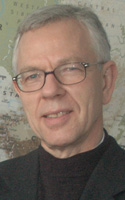 |
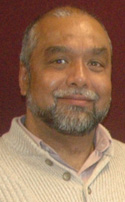 |
On Thursday 4 March 2010, Anna Lindberg and Lars Eklund visited the Nordic Institute of Asian Studies (NIAS), and the Asia Research Centre (ARC) at Copenhagen Business School in Copenhagen. At NIAS, fruitful discussions were held with the Director, Dr. Geir Helgesen, and at ARC a meeting was organised with the Research Director Anthony D’Costa, Professor of Indian Studies, Kjeld Erik Brødsgaard, Director for Asia Research Centre, Ms. Bente Faurby, ARC Administrator, and Dr. Sudipta Bhattacharyya, holding the first visiting ICCR Chair in Indian Economics at ARC during the academic year 2009-2010. More information about the Copenhagen visit. 
The SASNET visit to Copenhagen was part of an ongoing strategic work to strenghten collaboration with Nordic institutions engaged in South Asia related research and other activities. Earlier Lars and Anna have also visited researchers at the University of Copenhagen, and representatives for the university’s Asian Dynamics Initiative (ADI).
 On Wednesday 9 December 2009, SASNET held an extra board meeting. The main reason was the urgent need to discuss the future prospects for SASNET after December 31, 2009, when the Sida funding ended. On Wednesday 9 December 2009, SASNET held an extra board meeting. The main reason was the urgent need to discuss the future prospects for SASNET after December 31, 2009, when the Sida funding ended. 
Anna Lindberg reported from the meeting at the Ministry of Education in Stockholm on November 30, 2009, her discussions with the Swedish Research Council regarding possible infrastructural support, and from the meeting with Lund University’s Assistant Vice Chancellor Sven Strömqvist on December 7th.
The meeting in Stockholm did not lead to any positive results – see below.
Discussions with Lund University, on the other hand, were more positive. Lund has promised to keep its funding on the same level as before, and may even be willing to provide extra funding for the network in 2010.
The board was much engaged in discussing options for the future, and several members suggested that SASNET should actively try to find solutions that may get the Swedish funding agencies and authorities interested to support the network and its activities. It was also suggested that SASNET should explore Nordic and European collaboration. It was pointed out that in the current globalizing world, a network like SASNET is more relevant than ever, and that this gives us a great potential for the future if we just can survive through the current crisis.
Board members also stressed the importance of qualified research on Afghanistan and Islam, and that SASNET may play a positive role in this.
Besides this main discussion, the board also approved
a decision by the Lund University Vice Chancellor to reappoint Anna Lindberg as SASNET’s Director, for the period January 1, 2010 – December 31, 2012, and a decision to prolong the period for the current SASNET board with 9 months until September 30, 2010.
Finally, the board also decided to redistribute one SASNET guest lecture programme grant, since Prof. Margareta Petersson, Växjö University, had decided to withdraw her already accepted grant application. Instead the grant was distributed to Dr. Ann-Kristin Boström, Jönköping University.
Read the verified Minutes from the board meeting. 
SASNET’s next board meeting will be held at Uppsala University on Tuesday 11 May 2010.
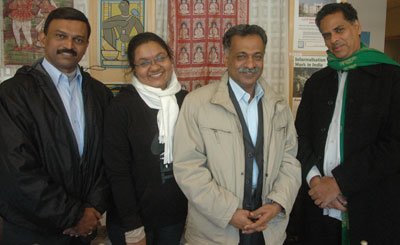 |
On Thursday 11 February 2010, a delegation from the University of Kerala visited SASNET’s office in Lund. The group consisted of Dr. J. Prabhash, Pro Vice Chancellor, University of Kerala in Kariavattom, Thiruvananthapuram; Dr. Achuthsankar S. Nair, Director, Centre for Bioinformatics, and a member of the Kerala State Higher Education Council; and Mr. R. Dilip, Administrative Officer, Centre for Bioinformatics. They had come to Lund to participate in the Erasmus Mundus External Cooperation Window (EMECW) India lot 13 consortium meeting. Kerala University is a member of this Indo-European university consortium coordinated by Lund University. The Kerala University delegation was accompanied to SASNET’s office by Dr. Maya Raman from the School of Industrial Fisheries, Cochin University of Science and Technology, Kerala, India, but currently working as a post-doc EMECW scholarship holder at the Dept. of Applied Nutrition and Food Chemistry, Lund University. 
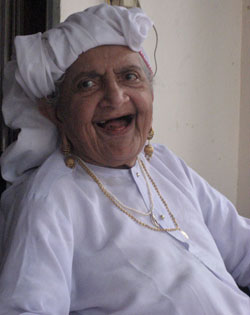 In February 2010, SASNET’s Director Anna Lindberg made a short tour to Kerala. She visited the Centre for Research and Education for Social Transformation (CREST) in Kozhikode, the Centre for Bioinformatics at Kerala University, the Centre for Women’s Studies, also at Kerala University, and the Centre for Development Studies in Thiruvananthapuram. She also met Kerala’s finance minister Thomas Isaac in order to discuss the development in Kerala over the past ten years. Read her Kerala report. In February 2010, SASNET’s Director Anna Lindberg made a short tour to Kerala. She visited the Centre for Research and Education for Social Transformation (CREST) in Kozhikode, the Centre for Bioinformatics at Kerala University, the Centre for Women’s Studies, also at Kerala University, and the Centre for Development Studies in Thiruvananthapuram. She also met Kerala’s finance minister Thomas Isaac in order to discuss the development in Kerala over the past ten years. Read her Kerala report. 
On Tuesday 9 February 2010, deputy director Lars Eklund presented SASNET, and its current activities as a Lund University run South Asian Studies network, for visiting Indian and European university representatives to the ongoing consortium meeting in Lund for the Erasmus Mundus External Cooperation Window (EMECW) India lot 13, a meeting held in Lund. 
The first application for this India lot, coordinated by Lund University and now running for the second year (more information), was prepared by SASNET. It was almost entirely based on contacts established by Anna Lindberg and Lars Eklund during their SASNET contact journey to India in late 2007 (visiting five of the current eight Indian consortium member universities – Delhi, Pune, Pravara, Kerala, and Tata Institute of Social Science).
More information about the contact journey 2007.
The contacts with another Indian consortium member university, Jadavpur in Kolkata, was based on a previous SASNET contact journey by Lars Eklund and Staffan Lindberg in 2005.
More information about the contact journey 2005.
 2009 was a turbulent year for SASNET, with many wonderful
events, but also some problems. The network grew tremendously. Our web site developed in a large scale, and our newsletters
reached 2,000 recipients. 2009 was a turbulent year for SASNET, with many wonderful
events, but also some problems. The network grew tremendously. Our web site developed in a large scale, and our newsletters
reached 2,000 recipients.
The conference for young Nordic scholars working on South Asia related
projects held at Falsterbo in August became a success, and we (Anna Lindberg and Lars Eklund, with assistance from Stig Toft Madsen during the spring, and Nihat Ulusoiy during the fall), have also organised a large number of other conferences and seminars on important issues.
SASNET’s networking activities within Sweden consisted of visits to the universities of Jönköping, Växjö, Skövde, Västerås, and the Royal Institute of Technology (KTH) in Stockholm. We have also been strongly involved in networking with
the South Asian diplomatic representatives in Scandinavia.
Our networking/planning grants were distributed to five new research
projects, and financial support was also given to three guest lecture programmes and two South Asia-related interdisciplinary research
workshops.
In addition to these activities, we spent a great deal of time seeking
new funding to replace the subsidy that Sida/SAREC has generously provided for
the ten-year period that ended December 31, 2009. But all efforts to resolve this problem have failed.
 However, Lund University has finally promised to continue their underwriting,
which till now has comprised about one-third of our budget, and we are in the process of negotiating with the University for additional funds. Their support will make it possible for us to keep our doors through 2010. Furthermore, Lund University has expressed its firm commitment to maintain SASNET’s extensive web site, its databases and its newsletters, whatever other changes in directions that may come. However, Lund University has finally promised to continue their underwriting,
which till now has comprised about one-third of our budget, and we are in the process of negotiating with the University for additional funds. Their support will make it possible for us to keep our doors through 2010. Furthermore, Lund University has expressed its firm commitment to maintain SASNET’s extensive web site, its databases and its newsletters, whatever other changes in directions that may come. 
Nevertheless, due to the precarious current situation, with SASNET no longer
receiving Swedish government funding and other Swedish universities unwilling
to co-fund SASNET with membership fees (we had proposed that each university
contribute SEK 50,000 a year – equivalent to EUR 5,000), the situation for SASNET as such is very unclear.
Read a full report on the 2009 activities, and our efforts to secure continued funding in our Christmas letter 2009.
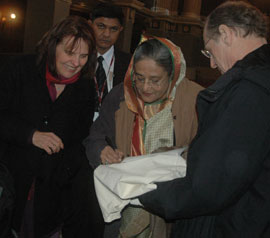 On Saturday 19 December 2009, Her Excellency Sheikh Hasina,
Prime Minister of Bangladesh, visited
Lund University to hold a public lecture on ”Climate Change in
Bangladesh – Facing the Challenges”. Sheikh Hasina was invited to visit Lund by SASNET and the
Association of Foreign Affairs at Lund University (UPF), and was hosted by Lund University Vice Chancellor Per Eriksson. A large delegation of ministers and around 20 members of the Bangladeshi parliament (who have attended the COP 15 climate conference in Copenhagen) accompanied the Prime Minister from Copenhagen during this high-security visit to Lund. The interest from Lund University students and researchers, as well as from the local Bangladeshi community was overwhelming. The lecture hall was crowded, and the event was documented by a couple of Bangladeshi TV company crews. More information. On Saturday 19 December 2009, Her Excellency Sheikh Hasina,
Prime Minister of Bangladesh, visited
Lund University to hold a public lecture on ”Climate Change in
Bangladesh – Facing the Challenges”. Sheikh Hasina was invited to visit Lund by SASNET and the
Association of Foreign Affairs at Lund University (UPF), and was hosted by Lund University Vice Chancellor Per Eriksson. A large delegation of ministers and around 20 members of the Bangladeshi parliament (who have attended the COP 15 climate conference in Copenhagen) accompanied the Prime Minister from Copenhagen during this high-security visit to Lund. The interest from Lund University students and researchers, as well as from the local Bangladeshi community was overwhelming. The lecture hall was crowded, and the event was documented by a couple of Bangladeshi TV company crews. More information. 
See Lars Eklund’s photos from Sheikh Hasina’s visit to Lund.
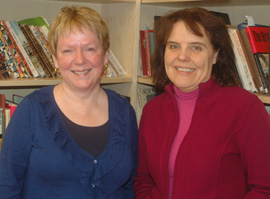 |
• Dr. Martha Garrett from International Maternal and Child Health (IMCH), Department of Women’s
and Children’s Health, Uppsala University, visited SASNET’s root node office in Lund on Thursday 28 January 2010. INFORM (International Network for Online Resources & Materials) is a Swedish-based networking programme that provides onsite information training in low-income countries (more information). Since INFORM’s next major activity will be a regional programme in Asia, Dr. Garrett extended an invitation to SASNET to become a partner in this programme. Health professionals working on reproductive health and maternal-and-child health in 10-12 Asian countries, mostly in south Asia, will receive intensive training about where to find free, high-quality materials for teaching, clinical practice and policy formulation. After the training, they will carry out their own information projects and also exchange information through an online forum. 
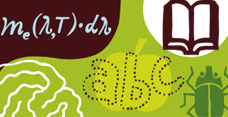 On Monday 30 November 2009, SASNET’s director Anna Lindberg held a crucial meeting to discuss chances of securing future funding for SASNET with officials at the Swedish Ministry of Education in Stockholm. Anna was accompanied by Dr. Ann-Katrin Bäcklund, Dean of the Faculty for Social Sciences, Lund University, and Dr. Camilla Orjuela (PADRIGU), School of Global Studies, University of Gothenburg (and a member of SASNET’s board). They met with Katarina
Bjelke and Mattias Jennerholm from the Division of Research Policy (forskningspolitiska enheten) within the Ministry of Education. On Monday 30 November 2009, SASNET’s director Anna Lindberg held a crucial meeting to discuss chances of securing future funding for SASNET with officials at the Swedish Ministry of Education in Stockholm. Anna was accompanied by Dr. Ann-Katrin Bäcklund, Dean of the Faculty for Social Sciences, Lund University, and Dr. Camilla Orjuela (PADRIGU), School of Global Studies, University of Gothenburg (and a member of SASNET’s board). They met with Katarina
Bjelke and Mattias Jennerholm from the Division of Research Policy (forskningspolitiska enheten) within the Ministry of Education.
 The background is that SASNET after 10 years in existence loses its main funding from the Swedish International Development Cooperation Agency, Sida, from 1 January 2010. Sida has so far contributed with two thirds of SASNET’s yearly budget of SEK 2.4 m, whereas the rest has come from Lund University. Lund University will continue with its part-funding in 2010, but is not willing to take over the full responsibility to pay for SASNET’s national networking activities. Other Swedish universities have been approached to find out their willingness to contribute financially to SASNET on a membership basis, but the response has been negative. We have also during the past year explored possibilities to secure alternate forms of grants from Sida and other funding agencies, but without any success. To a large extent, this is due to the truly multidisciplinary character of SASNET, that makes the network fall out of the framework for most funding agency programmes. The background is that SASNET after 10 years in existence loses its main funding from the Swedish International Development Cooperation Agency, Sida, from 1 January 2010. Sida has so far contributed with two thirds of SASNET’s yearly budget of SEK 2.4 m, whereas the rest has come from Lund University. Lund University will continue with its part-funding in 2010, but is not willing to take over the full responsibility to pay for SASNET’s national networking activities. Other Swedish universities have been approached to find out their willingness to contribute financially to SASNET on a membership basis, but the response has been negative. We have also during the past year explored possibilities to secure alternate forms of grants from Sida and other funding agencies, but without any success. To a large extent, this is due to the truly multidisciplinary character of SASNET, that makes the network fall out of the framework for most funding agency programmes.
The meeting at the Ministry of Education was organised with an intent to discuss whether the Swedish government would be willing to set aside some basic funding for SASNET, in order to continue the networking activities on a national basis. However, no such promises were given. The argument given is that the users of the network, i e the Swedish universities, should pay for it themselves, and besides the Ministry could not earmark funding for national activities at one specific Swedish university.
The consequences were that SASNET faced an acute risk to close down its national activities from 1 January 2010.

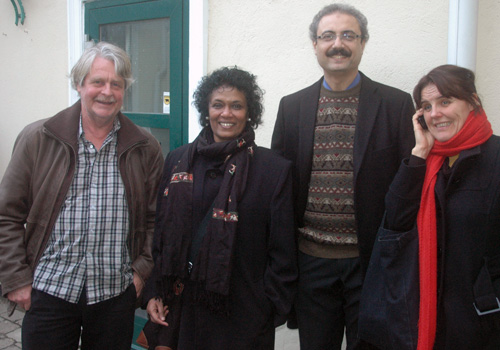 Kumudu Wijewardena and Mohsin Saeed Khan, two members of SASNET’s South Asian Reference Group visited Lund on Tuesday 24 November 2009. The purpose was to have informal discussions with Anna Lindberg and Lars Eklund about the future direction of SASNET from 2010. Kumudu Wijewardena and Mohsin Saeed Khan, two members of SASNET’s South Asian Reference Group visited Lund on Tuesday 24 November 2009. The purpose was to have informal discussions with Anna Lindberg and Lars Eklund about the future direction of SASNET from 2010.
Both Kumudu and Mohsin have spent the recent months in Sweden. Professor Wijewardena from the Faculty of Graduate Studies, University of Sri Jayewardenepura in
Sri Lanka, has been involved in a long-standing collaborative research programme on ”Health
and Social Care for the Socially Marginalized People” with the Division of International Maternal and Child Health (IMCH) at the Dept. of Women’s
and Children’s Health, Uppsala University. This programme is now near its completion. More information.
Mohsin Saeed Khan is a Health Specialist from Islamabad, Pakistan, but also PhD Candidate in a sandwich programme with the Division of Global health
(IHCAR) at Karolinska Institutet in Stockholm. His doctoral thesis project deals with ”HIV and STI infections among Female Sex Workers
in Lahore, Pakistan”, and is in its final stage. More information. 
 From its inception in January 2001, SASNET’s web site has grown enormously. On the 26th November 2009, the web site consisted of a little more than 1,600 pages, and with 2,773 photos and images. Furthermore, the statistics continuosly provided to us by the web tracking company StatCounter show that the number of visitors to SASNET is steadily growing. In 2007 the number was 31,581 unique visitors, in 2008 it grew to 37,763, and for 2009 the number will most probably touch 40,000. From its inception in January 2001, SASNET’s web site has grown enormously. On the 26th November 2009, the web site consisted of a little more than 1,600 pages, and with 2,773 photos and images. Furthermore, the statistics continuosly provided to us by the web tracking company StatCounter show that the number of visitors to SASNET is steadily growing. In 2007 the number was 31,581 unique visitors, in 2008 it grew to 37,763, and for 2009 the number will most probably touch 40,000.
Interestingly, currently most visitors come from India, Sweden and United States in this specific order, and the most popular page to visit is the one where we present South Asia related conferences all over the world. The general Research News and Nordic Researcher pages are also very popular, as well as the page where we present 250 Swedish university departments, and the one providing links to 500 South Asian research institutions worldwide, and finally the Newsletters produced by SASNET’s webmaster, Mr. Lars Eklund.
See some statistics from November 26th (as a pdf-file). 
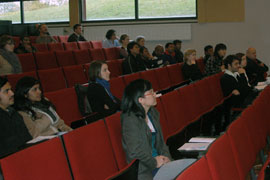 On Thursday 22 October 2009, SASNET invited Lund University Masters students, Ph.D. candidates and senior researchers interested in studies and research related to South Asia (India, Pakistan, Bangladesh, Afghanistan, Sri Lanka, Nepal, Bhutan, and Maldives) to an open meeting. Nearly 50 people turned up for the meeting that was intended to increase the interest in pursuing South Asia related education and research at Lund University. Eminent researchers involved in South Asia related projects, including Prof. Baboo Nair, Dept. of Applied Nutrition, Prof. Staffan Lindberg, Dept. of Sociology, Prof. Rajni Hatti Kaul, Dept. of Biotechnology, and Dr. Catarina Kinnvall, Dept. of Political Science, gave presentations on their work. Dr. Vipin Negi, Centre for East and South-East Asian Studies, and Dr. Gupinath Bhandari, Lund University Centre for Risk Assessment and Management (LUCRAM), also told about their experiences being scholarship holders through the Erasmus Mundus External Cooperation Window Programme.
After the meeting, the participants stayed on for snacks and refreshments.
Venue for the meeting: Kårhuset, Hörsalen, John Ericssons väg 3, Lund. Read a report from the meeting (with photos). On Thursday 22 October 2009, SASNET invited Lund University Masters students, Ph.D. candidates and senior researchers interested in studies and research related to South Asia (India, Pakistan, Bangladesh, Afghanistan, Sri Lanka, Nepal, Bhutan, and Maldives) to an open meeting. Nearly 50 people turned up for the meeting that was intended to increase the interest in pursuing South Asia related education and research at Lund University. Eminent researchers involved in South Asia related projects, including Prof. Baboo Nair, Dept. of Applied Nutrition, Prof. Staffan Lindberg, Dept. of Sociology, Prof. Rajni Hatti Kaul, Dept. of Biotechnology, and Dr. Catarina Kinnvall, Dept. of Political Science, gave presentations on their work. Dr. Vipin Negi, Centre for East and South-East Asian Studies, and Dr. Gupinath Bhandari, Lund University Centre for Risk Assessment and Management (LUCRAM), also told about their experiences being scholarship holders through the Erasmus Mundus External Cooperation Window Programme.
After the meeting, the participants stayed on for snacks and refreshments.
Venue for the meeting: Kårhuset, Hörsalen, John Ericssons väg 3, Lund. Read a report from the meeting (with photos). 
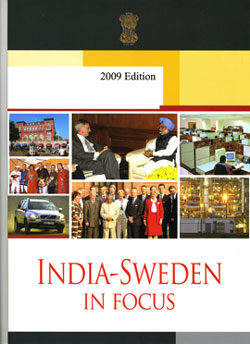 SASNET’s deputy director Lars Eklund has written an article about the achievements that SASNET has been able to contribute with during its nine years of existence, in the 2009 edition of the glossy magazine India-Sweden in Focus, published in mid-August. This magazine has been produced by Krest Publications in New Delhi, India, on behalf of the Embassy of India in Sweden. Besides Lars’ article entitled ”SASNET builds up Indo-Swedish collaborations”, the magazine also features articles on other important Indo-Swedish collaboration initiatives in business, research and culture. Robin Sukhia writes about the Sweden India Business Council (SIBC); Göran Baurne writes about INSTEC – the Indo-Swedish Network for Cooperation on Technical Research and Education; and Anita Nair writes about the Indo-Swedish translation project Indiska Biblioteket (Indian Library). Read the article on SASNET in India-Sweden in Focus. SASNET’s deputy director Lars Eklund has written an article about the achievements that SASNET has been able to contribute with during its nine years of existence, in the 2009 edition of the glossy magazine India-Sweden in Focus, published in mid-August. This magazine has been produced by Krest Publications in New Delhi, India, on behalf of the Embassy of India in Sweden. Besides Lars’ article entitled ”SASNET builds up Indo-Swedish collaborations”, the magazine also features articles on other important Indo-Swedish collaboration initiatives in business, research and culture. Robin Sukhia writes about the Sweden India Business Council (SIBC); Göran Baurne writes about INSTEC – the Indo-Swedish Network for Cooperation on Technical Research and Education; and Anita Nair writes about the Indo-Swedish translation project Indiska Biblioteket (Indian Library). Read the article on SASNET in India-Sweden in Focus. 
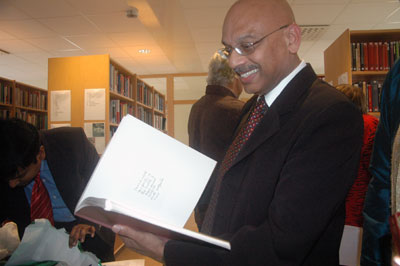 The Mahatma Gandhi Book Collection (part of the Karl Reinhold Haellquist Memorial Collection) was formally inaugurated by the Indian Ambassador to Sweden, Mr. Balkrishna Shetty, on Thursday 10 September 2009. On behalf of the Indian government, the Ambassador also took the opportunity to donate to Lund University and SASNET another 120 volumes of Mahatma Gandhi literature, either works written by Gandhi himself or books focusing on him. The Mahatma Gandhi Book Collection (part of the Karl Reinhold Haellquist Memorial Collection) was formally inaugurated by the Indian Ambassador to Sweden, Mr. Balkrishna Shetty, on Thursday 10 September 2009. On behalf of the Indian government, the Ambassador also took the opportunity to donate to Lund University and SASNET another 120 volumes of Mahatma Gandhi literature, either works written by Gandhi himself or books focusing on him.
The function, including a puja ceremony by Ms. Bubu Munshi-Eklund, took place at Lund University’s Asia Library at Scheelevägen 15. A large number of Lund University professors and researchers, and also Indian students and guest researchers who have come to Lund University through the Erasmus Mundus External Cooperation Window India lot 15, participated. Lund University was officially represented by the Assistant Vice-Chancellor, Prof. Sven Strömqvist. The daily newspaper Sydsvenskan carried a report from the inauguration, and also Lund University magazine LUM in its issue No. 8/2009. See the newspaper reports. (as a pdf-file).
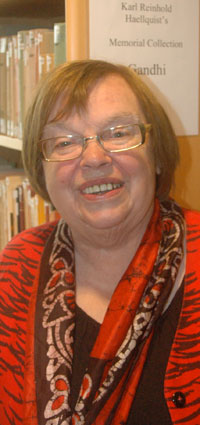 Ms. Inger Sondén Haellquist (photo) was the guest of honour since she is the person who in 2004 donated the extensive private book collection of her late husband, Karl Reinhold Haellquist, to Lund University. This collection, consisting of nearly 7 000 volumes of South Asia related literature, was selected by Lund University researchers Neelambar Hatti and Jan Magnusson, and has since been catalogued by SASNET. A small part of the collection, primarily the Mahatma Gandhi collection, is exhibited in the Asia Library. More information about the Karl Reinhold Haellquist Memorial Collection. Ms. Inger Sondén Haellquist (photo) was the guest of honour since she is the person who in 2004 donated the extensive private book collection of her late husband, Karl Reinhold Haellquist, to Lund University. This collection, consisting of nearly 7 000 volumes of South Asia related literature, was selected by Lund University researchers Neelambar Hatti and Jan Magnusson, and has since been catalogued by SASNET. A small part of the collection, primarily the Mahatma Gandhi collection, is exhibited in the Asia Library. More information about the Karl Reinhold Haellquist Memorial Collection.
After the inauguration ceremony, and the presentation of the new book donation by the Indian Ambassador, a 45 minutes documentary on the life of Mahatma Gandhi was shown. The film, entitled ”Mahatma – A Great Soul of the 20th Century”, has been jointly produced by the Public Diplomacy Division, Ministry of External Affairs, Government of India; and the Gandhi Films Foundation.
Not only the book collection was inaugurated. Also SASNET’s web site on the Mahatma Gandhi collection (www.sasnet.lu.se/gandhi) was officially launched. The web site has been prepared for SASNET by the librarian Erik Svanström. 
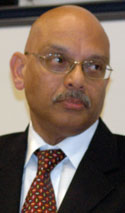 |
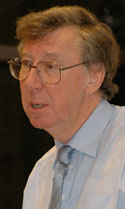 |
SASNET’s seminar on the Role of Mahatma Gandhi in Today’s Society became a major success. More than 120 people, Lund University professors, researchers and students but also many interested persons from outside the academic world, gathered for the seminar featuring David Arnold, Professor of Asian and Global History at the University of Warwick, UK, and the Indian Ambassador to Sweden, Mr. Balkrishna Shetty. The two-hour seminar was held on Thursday 10 September 2009, 19–21, at Lund University’s Centre for Languages and Literature (SOL-Centrum) and was moderated by SASNET’s Director, Dr. Anna Lindberg.
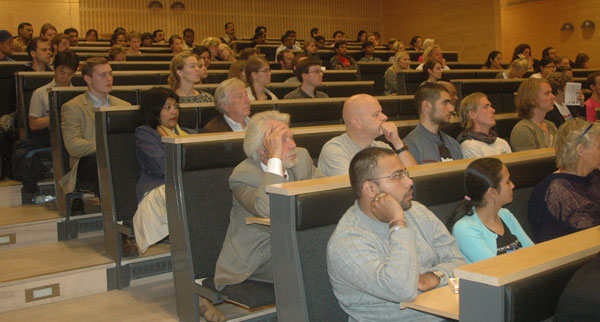 The Ambassador, Mr. Balkrishna Shetty, was the first speaker, and he gave a personal narrative on Mahatma Gandhi’s life, the important role he has played in history, and the basic values that he stands for, values that should still play an important role. The Ambassador, Mr. Balkrishna Shetty, was the first speaker, and he gave a personal narrative on Mahatma Gandhi’s life, the important role he has played in history, and the basic values that he stands for, values that should still play an important role.
Prof. David Arnold came next. His presentation, entitled ”Gandhi: The Mahatma and the Machine”, differed in its specific focus on Mahatma Gandhi’s complicated relation to machines. Whereas Gandhi was well-known for his resentment against modern industrial inventions that robbed people of their employment, he was still very much dependent on the radio, microphones, and trains, in order to reach out to the masses with his message.
Full information about SASNET’s Gandhi seminar. 
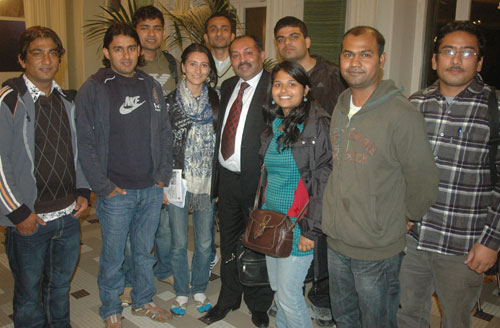 • A joint SASNET/UPF (Association of Foreign Affairs at Lund University) seminar on ”Political Transitions affecting the Peace Process in Nepal” was held in Lund on Wednesday 23 September 2009, 19.30–21.00. Anjoo Sharan Upadhyaya, Professor of Political Science and Director, Centre for the Study of Nepal at Banaras Hindu University (BHU) in Varanasi, India, participated in the seminar along with Mr. Vijaykant Lal Karna, Nepalese ambassador to Scandinavia (based in Denmark) who is also a political scientist by profession, having worked at Tribhuvan University for 20 years. • A joint SASNET/UPF (Association of Foreign Affairs at Lund University) seminar on ”Political Transitions affecting the Peace Process in Nepal” was held in Lund on Wednesday 23 September 2009, 19.30–21.00. Anjoo Sharan Upadhyaya, Professor of Political Science and Director, Centre for the Study of Nepal at Banaras Hindu University (BHU) in Varanasi, India, participated in the seminar along with Mr. Vijaykant Lal Karna, Nepalese ambassador to Scandinavia (based in Denmark) who is also a political scientist by profession, having worked at Tribhuvan University for 20 years.
The audience consisted of more than 70 people, mostly Lund University students, but also visiting Nepalese students (see photo with the Ambassador and a gathering of these).
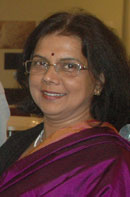 In her 35 years of teaching career at Banaras Hindu University, Prof. Anjoo Sharan Upadhyayay (photo) has been the Dean, Faculty of Social Sciences; and served twice as the Head, Department of Political Science and also as the Director of Center for Rural Development. Outside of India, she has worked for example as Research Director at UNU/Ulster University INCORE (Institute of Conflict Resolution and Ethnicity), UK; as Fellow at London School of Economics & Politics (LSE), and as Scholar-in Residence at the Woodrow Wilson Centre for International Scholars, Washington DC, USA. Professor Upadhyaya has published extensively both nationally and internationally on themes related to issues of self-determination, ethnicity, conflict, federalism, gender, development and peace. She has undertaken post-doctoral studies at LSE, Department of Peace and Conflict Research, Uppsala University, Sweden, and Brown University, USA. Currently she is engaged in a collaboration project with Karlstad University. In her 35 years of teaching career at Banaras Hindu University, Prof. Anjoo Sharan Upadhyayay (photo) has been the Dean, Faculty of Social Sciences; and served twice as the Head, Department of Political Science and also as the Director of Center for Rural Development. Outside of India, she has worked for example as Research Director at UNU/Ulster University INCORE (Institute of Conflict Resolution and Ethnicity), UK; as Fellow at London School of Economics & Politics (LSE), and as Scholar-in Residence at the Woodrow Wilson Centre for International Scholars, Washington DC, USA. Professor Upadhyaya has published extensively both nationally and internationally on themes related to issues of self-determination, ethnicity, conflict, federalism, gender, development and peace. She has undertaken post-doctoral studies at LSE, Department of Peace and Conflict Research, Uppsala University, Sweden, and Brown University, USA. Currently she is engaged in a collaboration project with Karlstad University.
Dr. Leif Bjellin from the the Dept. of Cell and Organism Biology, Lund University, was the moderator for the seminar.
Venue: Café Athen, Akademiska Föreningen (AF), Sandgatan 2, Lund. More information. 
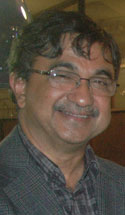 • Professor Priyankar Upadhyaya from Benaras Hindu University (BHU), Varanasi, India, held a lecture at Lund University on ”Religious Peace Building in India” on Thursday 24 September, 10.15–12.00. The seminar was jointly organised by the Dept.of History of Religions, Lund University, and SASNET. Prof. Upadhyaya is Director at the Malaviya Centre for Peace Research at BHU. He holds a PhD of Jawaharlal Nehru University, and Advance International Diploma(s) in Conflict Resolution from Uppsala University, Sweden.
In Sweden, he has also served as a Visiting Professor at Karlstad University. During September 2009 he has been based at the International Peace Research Institute (PRIO) in Oslo. Venue: Room 438, Centre for Theology and Religious Studies (CTR), Allhelgona Kyrkogata 8, Lund. More information. • Professor Priyankar Upadhyaya from Benaras Hindu University (BHU), Varanasi, India, held a lecture at Lund University on ”Religious Peace Building in India” on Thursday 24 September, 10.15–12.00. The seminar was jointly organised by the Dept.of History of Religions, Lund University, and SASNET. Prof. Upadhyaya is Director at the Malaviya Centre for Peace Research at BHU. He holds a PhD of Jawaharlal Nehru University, and Advance International Diploma(s) in Conflict Resolution from Uppsala University, Sweden.
In Sweden, he has also served as a Visiting Professor at Karlstad University. During September 2009 he has been based at the International Peace Research Institute (PRIO) in Oslo. Venue: Room 438, Centre for Theology and Religious Studies (CTR), Allhelgona Kyrkogata 8, Lund. More information. 
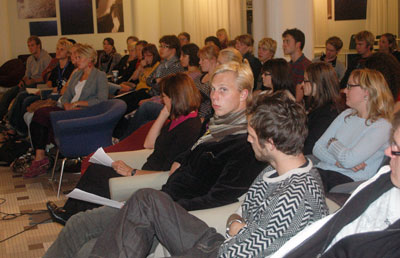 • The joint SASNET/UPF (Association of Foreign Affairs at Lund University) seminar on ”Contemporary Pakistan: Islamism, Human Rights and Terrorism”, held in Lund on Wednesday 16 September 2009, drew an audience of more than 100 people. The speakers were Prof. Ishtiaq Ahmed, working as Visiting Research Professor at the Institute of South Asian Studies (ISAS), National University of Singapore; and Dr. Rubya Mehdi, University of Copenhagen. • The joint SASNET/UPF (Association of Foreign Affairs at Lund University) seminar on ”Contemporary Pakistan: Islamism, Human Rights and Terrorism”, held in Lund on Wednesday 16 September 2009, drew an audience of more than 100 people. The speakers were Prof. Ishtiaq Ahmed, working as Visiting Research Professor at the Institute of South Asian Studies (ISAS), National University of Singapore; and Dr. Rubya Mehdi, University of Copenhagen.
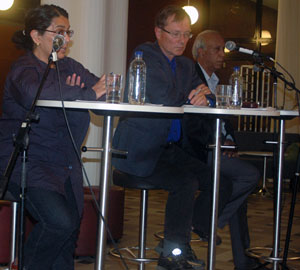 Prof. Ahmed is currently on leave from the Dept. of Political Science, Stockholm University. At ISAS, he is working on a research project ebtitled ”Is Pakistan a Garrison State?” The aim of the study is to generate a comprehensive analysis of the reasons why the military came to play the dominant role in Pakistani politics. He is also in the process of completing a major study based on first-hand accounts of the partition of the Punjab in 1947. Ishtiaq has taught and carried out research on issues of human rights, women's rights and minorities extensively in South Asian contexts in general and in Pakistan in particular. He has also written extensively on the politics of South Asia, especially Pakistan. He wrote a weekly column in the Pakistan English-language newspapers, The Daily Times and The News International during May 2002 and June 2007. Besides, he is on the editorial advisory board of Asian Ethnicity, Journal of Punjab Studies, IPRI Journal and PIPS Journal of Conflict and Peace Studies. Prof. Ahmed is currently on leave from the Dept. of Political Science, Stockholm University. At ISAS, he is working on a research project ebtitled ”Is Pakistan a Garrison State?” The aim of the study is to generate a comprehensive analysis of the reasons why the military came to play the dominant role in Pakistani politics. He is also in the process of completing a major study based on first-hand accounts of the partition of the Punjab in 1947. Ishtiaq has taught and carried out research on issues of human rights, women's rights and minorities extensively in South Asian contexts in general and in Pakistan in particular. He has also written extensively on the politics of South Asia, especially Pakistan. He wrote a weekly column in the Pakistan English-language newspapers, The Daily Times and The News International during May 2002 and June 2007. Besides, he is on the editorial advisory board of Asian Ethnicity, Journal of Punjab Studies, IPRI Journal and PIPS Journal of Conflict and Peace Studies.
Rubya Mehdi (photo to the right) has a PhD in Law, and is a senior researcher at the Carsten Niebuhr Institute, Dept. of Cross-Cultural and Regional Studies, University of Copenhagen. She is one of Denmark’s leading experts in Islamic law, and has conducted research in Denmark for 20 years. She is also a visiting professor with the Higher Education Commission of Pakistan, and she was involved in the Protection of Women Act 2006, which was passed to improve the situation of women in Pakistan. It also tried to make some changes in the Hudood ordinance which was very much discriminating against women in rape cases.
Dr. Stig Toft Madsen, SASNET, was the moderator for the discussion. Venue: Café Athen, Akademiska Föreningen (AF), Sandgatan 2, Lund. More information. 
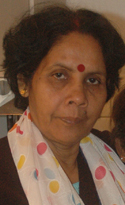 Dr. Ruby Sain from the Dept. of Sociology, Jadavpur University, India, held an open lecture at Lund University on Wednesday 16 September 2009. The seminar was jointly organised by the School of Social Work at Lund university,
Vårdalinstitutet and SASNET. Dr. Sain, who mostly works on health, illness, ageing, religion and research methodology issues, talked about “Depression – a social problem of the elderly
population in India”. She is the founding editor of the Jadavpur University Journal of Sociology, and her forthcoming books are titled ”Contemporary Social Problems in India-Vol I” (ed.) and ”Folk Religion in Bengal”. Besides, Dr Sain is secretary of the International Forum for the Study of Society and Religion (IFFSR), a forum that links researchers and scholars from Jadavpur University, University of Gothenburg and the Oxford Center for Hindu Studies. She came to Sweden on a SASNET guest lecture programme grant, invited by the Department of Literature, History of Ideas, and Religion, Gothenburg University. More information. Dr. Ruby Sain from the Dept. of Sociology, Jadavpur University, India, held an open lecture at Lund University on Wednesday 16 September 2009. The seminar was jointly organised by the School of Social Work at Lund university,
Vårdalinstitutet and SASNET. Dr. Sain, who mostly works on health, illness, ageing, religion and research methodology issues, talked about “Depression – a social problem of the elderly
population in India”. She is the founding editor of the Jadavpur University Journal of Sociology, and her forthcoming books are titled ”Contemporary Social Problems in India-Vol I” (ed.) and ”Folk Religion in Bengal”. Besides, Dr Sain is secretary of the International Forum for the Study of Society and Religion (IFFSR), a forum that links researchers and scholars from Jadavpur University, University of Gothenburg and the Oxford Center for Hindu Studies. She came to Sweden on a SASNET guest lecture programme grant, invited by the Department of Literature, History of Ideas, and Religion, Gothenburg University. More information.
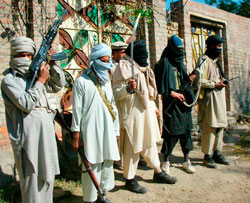 A joint SASNET/UPF (Association of Foreign Affairs at Lund University) seminar on ”Contemporary Pakistan: Islamism, Human Rights and Terrorism” was held in Lund on Wednesday 16 September 2009. The speakers were Prof. Ishtiaq Ahmed, working as Visiting Research Professor at the Institute of South Asian Studies (ISAS), National University of Singapore; and Dr. Rubya Mehdi, University of Copenhagen. A joint SASNET/UPF (Association of Foreign Affairs at Lund University) seminar on ”Contemporary Pakistan: Islamism, Human Rights and Terrorism” was held in Lund on Wednesday 16 September 2009. The speakers were Prof. Ishtiaq Ahmed, working as Visiting Research Professor at the Institute of South Asian Studies (ISAS), National University of Singapore; and Dr. Rubya Mehdi, University of Copenhagen.
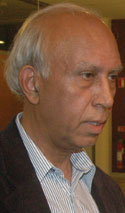 Ishtiaq Ahmed (photo to the left) is currently on leave from the Dept. of Political Science, Stockholm University. At ISAS, he is working on a research project entitled ”Is Pakistan a Garrison State?” The aim of the study is to generate a comprehensive analysis of the reasons why the military came to play the dominant role in Pakistani politics. He is also in the process of completing a major study based on first-hand accounts of the partition of the Punjab in 1947. Ishtiaq has taught and carried out research on issues of human rights, women's rights and minorities extensively in South Asian contexts in general and in Pakistan in particular. He has also written extensively on the politics of South Asia, especially Pakistan. He wrote a weekly column in the Pakistan English-language newspapers, The Daily Times and The News International during May 2002 and June 2007. Besides, he is on the editorial advisory board of Asian Ethnicity, Journal of Punjab Studies, IPRI Journal and PIPS Journal of Conflict and Peace Studies. Ishtiaq Ahmed (photo to the left) is currently on leave from the Dept. of Political Science, Stockholm University. At ISAS, he is working on a research project entitled ”Is Pakistan a Garrison State?” The aim of the study is to generate a comprehensive analysis of the reasons why the military came to play the dominant role in Pakistani politics. He is also in the process of completing a major study based on first-hand accounts of the partition of the Punjab in 1947. Ishtiaq has taught and carried out research on issues of human rights, women's rights and minorities extensively in South Asian contexts in general and in Pakistan in particular. He has also written extensively on the politics of South Asia, especially Pakistan. He wrote a weekly column in the Pakistan English-language newspapers, The Daily Times and The News International during May 2002 and June 2007. Besides, he is on the editorial advisory board of Asian Ethnicity, Journal of Punjab Studies, IPRI Journal and PIPS Journal of Conflict and Peace Studies.
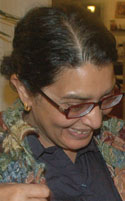 Rubya Mehdi (photo to the left) has a PhD in Law, and is a senior researcher at the Carsten Niebuhr Institute, Dept. of Cross-Cultural and Regional Studies, University of Copenhagen. She is one of Denmark’s leading experts in Islamic law, and has conducted research in Denmark for 20 years. She is also a visiting professor with the Higher Education Commission of Pakistan, and she was involved in the Protection of women Act 2006, which was passed to improve the situation of women in Pakistan. It also tried to make some changes in the Hudood ordinance which was very much discriminating against women in rape cases. Rubya Mehdi (photo to the left) has a PhD in Law, and is a senior researcher at the Carsten Niebuhr Institute, Dept. of Cross-Cultural and Regional Studies, University of Copenhagen. She is one of Denmark’s leading experts in Islamic law, and has conducted research in Denmark for 20 years. She is also a visiting professor with the Higher Education Commission of Pakistan, and she was involved in the Protection of women Act 2006, which was passed to improve the situation of women in Pakistan. It also tried to make some changes in the Hudood ordinance which was very much discriminating against women in rape cases.
Dr. Stig Toft Madsen, SASNET, will be the moderator for the discussion. Venue: Café Athen, Akademiska Föreningen (AF), Sandgatan 2, Lund. More information.
On 3–4 August 2009, SASNET’s director Anna Lindberg and deputy director Lars Eklund went to Stockholm to meet the Ambassadors of India, Pakistan and Bangladesh, as part of ongoing discussions about the future of SASNET and possibilities of cooperation between South Asian institutions.
At the Embassy of India they were received by the Ambassador Mr. Balkrishna Shetty, and the First Secretary Mrs. Madhumita Bhagat; at the Embassy of Pakistan they were received by the new Ambassador Mr. Nadeem Riyaz; and at the Embassy of Bangladesh they were received by outgoing Ambassador Mr. Muhammad Azizul Haque. Fruitful discussions were held at all the three embassies.
On Monday 31 August 2009, Anna Lindberg and Lars Eklund went to Hellerup north of Copenhagen, to meet the Ambassador of Nepal to Scandinavia, Mr, Vijaykant Lal Karna. 
Visits are also planned to soon meet both the Ambassador of Sri Lanka to Sweden in Stockholm, and the Ambassador of Afghanistan to Scandinavia in Oslo.
 An internal evaluation of SASNET’s activities during the period 2005–2009 has been carried out. SASNET was founded in 2001 and has since its inception been funded jointly by the Swedish International Development Cooperation Agency, Sida, and Lund University. The latter contributes roughly one-third of its annual budget of approximately SEK 2.6 million. This funding remains in effect until the end of 2009. An internal evaluation of SASNET’s activities during the period 2005–2009 has been carried out. SASNET was founded in 2001 and has since its inception been funded jointly by the Swedish International Development Cooperation Agency, Sida, and Lund University. The latter contributes roughly one-third of its annual budget of approximately SEK 2.6 million. This funding remains in effect until the end of 2009.
Unfortunately, Sida will most probably not be able to fund SASNET after that date for reasons that are reportedly bureaucratic or political, and not in any way related to the quality of SASNET’s work. An external evaluation conducted in 2005 by Sida concluded that SASNET has been highly successful (see this evaluation report written by Carla Risseeuw, Ghanshyam Shah and Lennart
Wohlgemuth). Recently, a brief internal evaluation of SASNET was conducted by Dr. Stig Toft-Madsen, who worked as assistant director of SASNET during the period December 2008 to June 2009. At present, staff at SASNET are actively seeking underwriting to keep the organisation viable for the foreseeable future. Read the 2009 internal evaluation review report of SASNET activities. 
 Do not miss out on Lars Eklund’s new blog sasnettoday.blogspot.com. This is a blog that may focus on the day-to-day activities of Lars, working as deputy director/webmaster with the Swedish South Asian Studies Network since 2001. However, it may just as well deal with Lars’ many extramural South Asia/India related activities in Sweden and elsewhere. He used to be editor for the SYDASIEN magazine for a period of 25 years, has travelled extensively in all the South Asian countries from 1972 and onwards, and lives with his Indian wife Bubu. Besides he is well acquainted with South Asian history and religion, culture and music. Go for Lars Eklund’s SASNETTODAY blog. Do not miss out on Lars Eklund’s new blog sasnettoday.blogspot.com. This is a blog that may focus on the day-to-day activities of Lars, working as deputy director/webmaster with the Swedish South Asian Studies Network since 2001. However, it may just as well deal with Lars’ many extramural South Asia/India related activities in Sweden and elsewhere. He used to be editor for the SYDASIEN magazine for a period of 25 years, has travelled extensively in all the South Asian countries from 1972 and onwards, and lives with his Indian wife Bubu. Besides he is well acquainted with South Asian history and religion, culture and music. Go for Lars Eklund’s SASNETTODAY blog. 
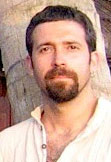 SASNET engaged Mr. Geoffrey Gardella on a short-term assignment during the summer 2009 to assist the webmaster, Lars Eklund, to improve the graphic design on important SASNET web pages. Geoffrey is both a geographic and academic wanderer. With a master's degree in German from University of California Berkeley, he has also studied Hindi in Mussoorie and Saami at Umeå University. In between academic careers, he has worked in Silicon Valley. He is now a Master's degree student within the South Asia track at the Centre for East and South-East Asian Studies, Lund University. His area of focus is the intersection of food, culture and identity in India. He participated in the June 2009 Asian Dynamics Initiative conference at the University of Copenhagen, where he presented a paper entitled ”Udupi Hotels: Entrepreneurship, Reform and Revival”, written together with Stig Toft-Madsen from SASNET. SASNET engaged Mr. Geoffrey Gardella on a short-term assignment during the summer 2009 to assist the webmaster, Lars Eklund, to improve the graphic design on important SASNET web pages. Geoffrey is both a geographic and academic wanderer. With a master's degree in German from University of California Berkeley, he has also studied Hindi in Mussoorie and Saami at Umeå University. In between academic careers, he has worked in Silicon Valley. He is now a Master's degree student within the South Asia track at the Centre for East and South-East Asian Studies, Lund University. His area of focus is the intersection of food, culture and identity in India. He participated in the June 2009 Asian Dynamics Initiative conference at the University of Copenhagen, where he presented a paper entitled ”Udupi Hotels: Entrepreneurship, Reform and Revival”, written together with Stig Toft-Madsen from SASNET. 
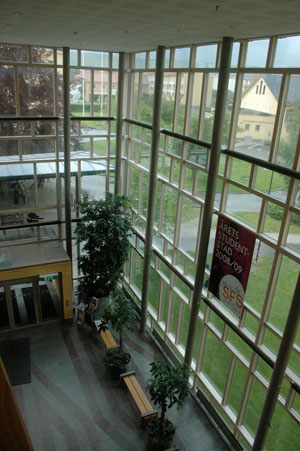 SASNET’s deputy director Lars Eklund visited the University of Skövde on 28 May 2009. He was invited to participate in the signing ceremony of a Memorandum of Understanding (MoU) between the universities of Skövde and Rajshahi, Bangladesh. The MoU focuses on student exchange and research collaboration within Biomedicine, Bioinformatics, Ecology, Molecular Biology, Physiology, and Systematic Biology. The initiative comes from Dr. Abul Mandal and his colleagues at the School of Life Sciences, University of Skövde. SASNET has been instrumental in promoting the Skövde–Rajshahi collaboration by providing a planning grant for a project on ”Development of new varieties of crops for avoiding loss of harvest caused by climatic instability in Bangladesh” in 2008 (more information). To further celebrate the visit to Skövde by a delegation from the University of Rajshahi, a “Bengali Evening” was held at 20.15 with a cultural programme that included a Bharata Natyam performance by Ms. Shivapriya Bagchi from Kolkata, India. More information. SASNET’s deputy director Lars Eklund visited the University of Skövde on 28 May 2009. He was invited to participate in the signing ceremony of a Memorandum of Understanding (MoU) between the universities of Skövde and Rajshahi, Bangladesh. The MoU focuses on student exchange and research collaboration within Biomedicine, Bioinformatics, Ecology, Molecular Biology, Physiology, and Systematic Biology. The initiative comes from Dr. Abul Mandal and his colleagues at the School of Life Sciences, University of Skövde. SASNET has been instrumental in promoting the Skövde–Rajshahi collaboration by providing a planning grant for a project on ”Development of new varieties of crops for avoiding loss of harvest caused by climatic instability in Bangladesh” in 2008 (more information). To further celebrate the visit to Skövde by a delegation from the University of Rajshahi, a “Bengali Evening” was held at 20.15 with a cultural programme that included a Bharata Natyam performance by Ms. Shivapriya Bagchi from Kolkata, India. More information. 
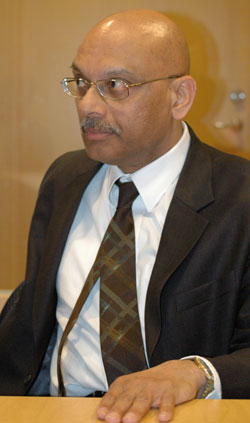 On Thursday 14 May 2009, SASNET organised a visit to Lund and Malmö by the new Ambassador of India to Sweden, H.E. Mr. Balkrishna Shetty. During his stay in Lund he had discussions with SASNET’s director Anna Lindberg and deputy director Lars Eklund. He also met with the University Director Dr. Marianne Granfelt and participated in a seminar with researchers, teachers, students, and international
coordinators involved in India related projects at Lund University. Mr. Shetty was accompanied by Mrs. Madhumita Hazarika Bhagat, First Secretary
(Commercial, Consular, Culture), Embassy of India. The Ambassador
listened to a few selected presentations: Dr. Sidsel Hansson presented the Erasmus Mundus External Cooperation Window lot 15 programme, coordinated by Lund University; Prof. Baboo Nair, Dept. of Applied Nutrition and Food Chemistry, informed about the SASNET Fermented Foods project; and Prof. Olle Qvarnström presented the Division of Indic Religions at the Centre for Theology and Religious Studies, Lund University. More information about the seminar. On Thursday 14 May 2009, SASNET organised a visit to Lund and Malmö by the new Ambassador of India to Sweden, H.E. Mr. Balkrishna Shetty. During his stay in Lund he had discussions with SASNET’s director Anna Lindberg and deputy director Lars Eklund. He also met with the University Director Dr. Marianne Granfelt and participated in a seminar with researchers, teachers, students, and international
coordinators involved in India related projects at Lund University. Mr. Shetty was accompanied by Mrs. Madhumita Hazarika Bhagat, First Secretary
(Commercial, Consular, Culture), Embassy of India. The Ambassador
listened to a few selected presentations: Dr. Sidsel Hansson presented the Erasmus Mundus External Cooperation Window lot 15 programme, coordinated by Lund University; Prof. Baboo Nair, Dept. of Applied Nutrition and Food Chemistry, informed about the SASNET Fermented Foods project; and Prof. Olle Qvarnström presented the Division of Indic Religions at the Centre for Theology and Religious Studies, Lund University. More information about the seminar.
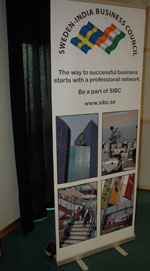 SASNET also co-hosted an India seminar in co-operation with SIBC (Sweden-India Business Council) and Ideon Research park, where the Ambassador was the key speaker. With his wide experiences he gave an interesting presentation. In recent years he has been posted at the Embassy of India in Paris, as
Minister (Economic), dealing with all bilateral economic matters and
relations with Organisation for Economic Cooperation and Development
(OECD). He has also been associated with
the establishment of TEAM–9 (Techno-Economic Cooperation for Africa–India Movement), a regional economic cooperation mechanism between
India and eight West African countries. From September 2005 to January
2009, he was Ambassador of India to Bahrain.
Besides the speech by the Ambassador, the seminar also included a presentation by Prof. Baboo Nair, who talked about ”Doing Business in India”. SASNET’s Director, Dr. Anna Lindberg, was the moderator. More information (as a pdf-file). SASNET also co-hosted an India seminar in co-operation with SIBC (Sweden-India Business Council) and Ideon Research park, where the Ambassador was the key speaker. With his wide experiences he gave an interesting presentation. In recent years he has been posted at the Embassy of India in Paris, as
Minister (Economic), dealing with all bilateral economic matters and
relations with Organisation for Economic Cooperation and Development
(OECD). He has also been associated with
the establishment of TEAM–9 (Techno-Economic Cooperation for Africa–India Movement), a regional economic cooperation mechanism between
India and eight West African countries. From September 2005 to January
2009, he was Ambassador of India to Bahrain.
Besides the speech by the Ambassador, the seminar also included a presentation by Prof. Baboo Nair, who talked about ”Doing Business in India”. SASNET’s Director, Dr. Anna Lindberg, was the moderator. More information (as a pdf-file).
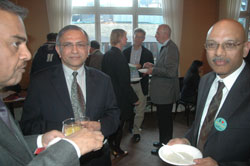 During his stay in Lund and Malmö, the Ambassador also visited the Mayor of Lund, Ms Annica Annerby Jansson, visited Lund University’s Faculty of Engineering, and especially its Department of Electrical and Information Technology. In the evening Mr. Shetty went to Malmö, first to visit the Bollywood cinema hall in Limhamn, and then to host a reception at Hipp for 100 invited guests, mostly from the Indian community in Malmö/Lund, but also a delegation from Malmö University, and people working on India related projects within art, music, and theatre (photo from reception). During his stay in Lund and Malmö, the Ambassador also visited the Mayor of Lund, Ms Annica Annerby Jansson, visited Lund University’s Faculty of Engineering, and especially its Department of Electrical and Information Technology. In the evening Mr. Shetty went to Malmö, first to visit the Bollywood cinema hall in Limhamn, and then to host a reception at Hipp for 100 invited guests, mostly from the Indian community in Malmö/Lund, but also a delegation from Malmö University, and people working on India related projects within art, music, and theatre (photo from reception).
Read the full programme for the Ambassador’s visit to Lund on May 14, 2009, and see photos. 
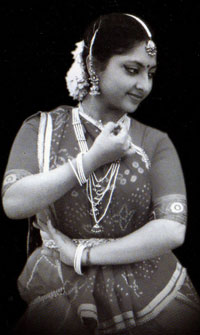 The Tabla player Subrata Manna, the classical singer Sudokshina Chatterjee Manna, and the Kathak dancer Sohini Debnath (photo), all from Kolkata, India, participated in an well-attended academic seminar on intercultural education research in Malmö on Tuesday 26 May 2009, 13.30–16.00. They gave a presentation titled ”Application of Classical Indian
Music in World Music of today”. The artists visited Scandinavia as part of a European tour (with concerts in Copenhagen on May 26th and in Lund on May 27th). The Malmö seminar was jointly organised by Lund University Intercultural Education
Research Forum (since November 2008 coordinated by the International Art and Cultural Education Competency Centre, KIKK, at Lund University’s Academy of Music in Malmö), and SASNET. Besides the three Indian artists, who discussed Indian forms of music and dance and show their skills, two presentations of ongoing research projects at Lund University were given. Dr.
Bosse Bergstedt, Dept. of Education talked about ”The Genuine Voice – on a Prelinguistic Fellowship”; and Senior Lecturer Eva Sæther, Dept. of Music Education Research talked about ”To play oneself Persian or Swedish – or?”. Venue: Musikhögskolan i Malmö, Ystadvägen 25. More information (as a pdf-file). The Tabla player Subrata Manna, the classical singer Sudokshina Chatterjee Manna, and the Kathak dancer Sohini Debnath (photo), all from Kolkata, India, participated in an well-attended academic seminar on intercultural education research in Malmö on Tuesday 26 May 2009, 13.30–16.00. They gave a presentation titled ”Application of Classical Indian
Music in World Music of today”. The artists visited Scandinavia as part of a European tour (with concerts in Copenhagen on May 26th and in Lund on May 27th). The Malmö seminar was jointly organised by Lund University Intercultural Education
Research Forum (since November 2008 coordinated by the International Art and Cultural Education Competency Centre, KIKK, at Lund University’s Academy of Music in Malmö), and SASNET. Besides the three Indian artists, who discussed Indian forms of music and dance and show their skills, two presentations of ongoing research projects at Lund University were given. Dr.
Bosse Bergstedt, Dept. of Education talked about ”The Genuine Voice – on a Prelinguistic Fellowship”; and Senior Lecturer Eva Sæther, Dept. of Music Education Research talked about ”To play oneself Persian or Swedish – or?”. Venue: Musikhögskolan i Malmö, Ystadvägen 25. More information (as a pdf-file). 
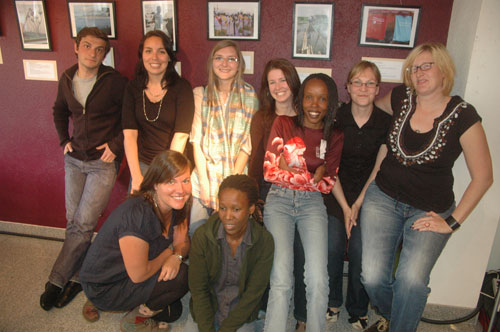 SASNET has sponsored a photographic project set up by second-year students from Lund University’s Masters programme in Development and Management (LUMID) 2007–09 batch. During the period 25 May – 4 June 2009, they exhibit photos from their fieldworks in Asian and African countries. The exhibition is part of the LFA (LUMID Fotographic Art) Project, as it is called. Opening hours: Monday–Saturday 14.00 – 19.00, with a festive vernissage that was held on Friday 29 May 2009. Anna Lindberg, Lars Eklund and Stig Toft Madsen from SASNET participated in the event. Venue: Wickmanska gården, Bredgatan 2 in central Lund (close to the City Library). More information. SASNET has sponsored a photographic project set up by second-year students from Lund University’s Masters programme in Development and Management (LUMID) 2007–09 batch. During the period 25 May – 4 June 2009, they exhibit photos from their fieldworks in Asian and African countries. The exhibition is part of the LFA (LUMID Fotographic Art) Project, as it is called. Opening hours: Monday–Saturday 14.00 – 19.00, with a festive vernissage that was held on Friday 29 May 2009. Anna Lindberg, Lars Eklund and Stig Toft Madsen from SASNET participated in the event. Venue: Wickmanska gården, Bredgatan 2 in central Lund (close to the City Library). More information. 
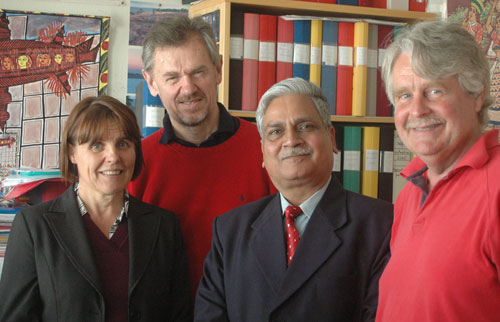 Professor G.N. Tiwari from the Centre for Energy Studies at Indian Institute of Technology (IIT) Delhi visited SASNET’s root node office in Lund on Tuesday 19 May 2009. He was accompanied by Professor Krister Håkansson, Dept. of Psychology, Växjö University, with whom Prof. Tiwari is involved in a collaboration project to organise research and a conference on hybrid photovoltaic-thermal technology (H-PV/T), to be held in New Delhi. The conference, entitled ”Implementation strategies for the transfer of hybrid photovoltaic-thermal technology (H-PV/T) from research to lab to field” should have been held already in March 2009, but due to the Indian elections it was postponed, and new dates will be in the end of August.
Prof. Tiwari is a leading expert in the research on how solar energy can be introduced in Indian villages without electricity. In 2007 he organised the 3rd International Conference on Solar Radiation and Day Lighting, ”SOLARIS 2007” at IIT Delhi.
Then he established contact with Dr. Om Prakash at the School of Technology and Design, Växjö University, and originally they were supposed to plan for the new conference. But due to illness, Dr. Prakash had to give up the project, and he gave it over to Christer Håkansson. Being a psychologist, Håkansson is interested to launch a broader interdisciplinary research project on issues widely connected to village development and the introduction of solar energy in India. More information. Professor G.N. Tiwari from the Centre for Energy Studies at Indian Institute of Technology (IIT) Delhi visited SASNET’s root node office in Lund on Tuesday 19 May 2009. He was accompanied by Professor Krister Håkansson, Dept. of Psychology, Växjö University, with whom Prof. Tiwari is involved in a collaboration project to organise research and a conference on hybrid photovoltaic-thermal technology (H-PV/T), to be held in New Delhi. The conference, entitled ”Implementation strategies for the transfer of hybrid photovoltaic-thermal technology (H-PV/T) from research to lab to field” should have been held already in March 2009, but due to the Indian elections it was postponed, and new dates will be in the end of August.
Prof. Tiwari is a leading expert in the research on how solar energy can be introduced in Indian villages without electricity. In 2007 he organised the 3rd International Conference on Solar Radiation and Day Lighting, ”SOLARIS 2007” at IIT Delhi.
Then he established contact with Dr. Om Prakash at the School of Technology and Design, Växjö University, and originally they were supposed to plan for the new conference. But due to illness, Dr. Prakash had to give up the project, and he gave it over to Christer Håkansson. Being a psychologist, Håkansson is interested to launch a broader interdisciplinary research project on issues widely connected to village development and the introduction of solar energy in India. More information. 
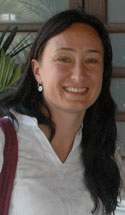 PhD candidate Malin Jordahl, Division of International Maternal and Child Health (IMCH), Uppsala University, visited SASNET’s root node office in Lund on Friday 22 May 2009, and had a meeting with the Director
Anna Lindberg. It was a follow-up meeting of a discussion that took place
in February 2009 at the SASNET conference in Colombo, Sri Lanka (more information). Malin and Anna now discussed the possibility of
creating a sub-network within SASNET on the topic for the Colombo workshop, viz.,
Migration, Gender, and Health. PhD candidate Malin Gregersen, Dept. of History, Lund University, and Dr. Kristina Myrvold, Dept. of History of Religions, Lund University, participated in the meeting as well. Malin Gregersen
is monitoring the SASNET Student Forum and Kristina Myrvold is a leading
member of the committee organising SASNET’s coming conference for Young Scholars to be held in Falsterbo in
August 2009 (more information). PhD candidate Malin Jordahl, Division of International Maternal and Child Health (IMCH), Uppsala University, visited SASNET’s root node office in Lund on Friday 22 May 2009, and had a meeting with the Director
Anna Lindberg. It was a follow-up meeting of a discussion that took place
in February 2009 at the SASNET conference in Colombo, Sri Lanka (more information). Malin and Anna now discussed the possibility of
creating a sub-network within SASNET on the topic for the Colombo workshop, viz.,
Migration, Gender, and Health. PhD candidate Malin Gregersen, Dept. of History, Lund University, and Dr. Kristina Myrvold, Dept. of History of Religions, Lund University, participated in the meeting as well. Malin Gregersen
is monitoring the SASNET Student Forum and Kristina Myrvold is a leading
member of the committee organising SASNET’s coming conference for Young Scholars to be held in Falsterbo in
August 2009 (more information). 
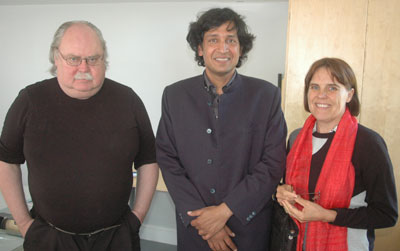 |
Dr. Tabish Khair from the Dept. of English, University of Aarhus, Denmark, held a SASNET lecture in Lund on ”The Gothic and Postcolonialism:
Alterity, Difference and Narration” on Monday 18 May 2009, 13.15–15.00. The seminar was co-organised by the Dept. of Comparative Literature, Lund University. Born and educated mostly in Gaya, India, Tabish Khair is the author of various
books. His honours and prizes include the All India Poetry Prize
(awarded by the Poetry Society and the British Council).
Academic papers, reviews, essays, fiction and poems by Khair have appeared in
Indian, British, Danish, American,
German, Italian, South African, Chinese and other publications. Khair has just finished a study, entitled ”The Gothic, Postcolonialism and Otherness”, which will be published in USA and UK by Palgrave (Macmillan) in August 2009. Venue for the Lund seminar: Room L 201, Lund University’s Centre for Languages and
Literature (SOL-Centrum), Helgonabacken 14, Lund. More information. 
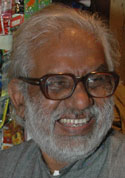 Prof. Dipak Malik, Director of the Gandhian Institute in Varanasi, India, held an open SASNET lecture at Lund University on ”Riots and Elections in India” on Monday 11 May 2009. Prof. Malik, also working at the Dept. of Commerce, Banaras Hindu University (BHU) in Varanasi, discussed
the factors deciding the ongoing elections for the Indian parliament, Lok Sabha (results to be announced
on May 16th), and the profile of Indian communal riots, now and in the past. The seminar was organised in collaboration with the Research group on Development
and Environment at the Dept. of Sociology, Lund University, being part of a Swedish guest lecture tour that also brings him to the universities of Gothenburg and Karlstad (funded by a SASNET grant).
Venue: Conference room 1 (335), Dept.of Sociology,
Lund University, Paradisgatan 5 (house G). More information. Prof. Dipak Malik, Director of the Gandhian Institute in Varanasi, India, held an open SASNET lecture at Lund University on ”Riots and Elections in India” on Monday 11 May 2009. Prof. Malik, also working at the Dept. of Commerce, Banaras Hindu University (BHU) in Varanasi, discussed
the factors deciding the ongoing elections for the Indian parliament, Lok Sabha (results to be announced
on May 16th), and the profile of Indian communal riots, now and in the past. The seminar was organised in collaboration with the Research group on Development
and Environment at the Dept. of Sociology, Lund University, being part of a Swedish guest lecture tour that also brings him to the universities of Gothenburg and Karlstad (funded by a SASNET grant).
Venue: Conference room 1 (335), Dept.of Sociology,
Lund University, Paradisgatan 5 (house G). More information. 
All Administrative reports regarding SASNET’s
work and activities from the first planning process
in 1999 till today are available at SASNET’s web site, see
below. The
latest report to be added is the Administrative report no. 9,
for the period 1 January – 31
december 2008. Go for the Work Report. 
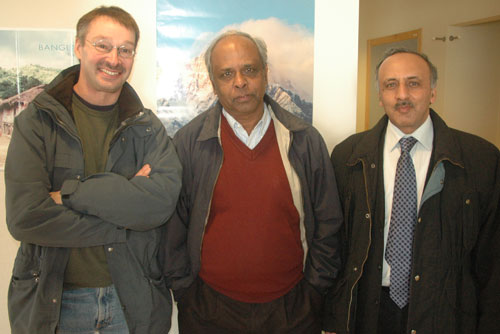 |
The Vice Chancellor from Jahangirnagar University in Bangladesh, Prof. Shariff Enamur Kabir, visited SASNET’s root node office in Lund on Wednesday 25 March 2009. He was accompanied by Professor Pradeep Mathur from the Dept. of Chemistry at the Indian Institute of Technology (IIT) in Mumbai, and Dr. Ebbe Nordlander, Dept. of Chemical Physics, Lund University. The three researchers are involved in a joint reserach project on ”Modelling of hydrodesulfurization reactions and development of new molecular hydrodesulfurization catalyst” that received a SASNET planning grant in 2008, the planning of which was carried out during the stay in Lund. They also met with Lund University’s Pro vice-chancellor Eva Åkesson to discuss a possible Memorandum of Understanding (MoU) between Lund University and Jahangirnagar University. 
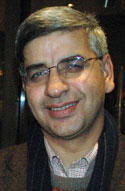 Dr. Daya Kishan Thussu from the University of Westminster, UK, was invited by SASNET to lecture at a Focus Asia conference on ”Media Cultures and Politics in Asia and Beyond” that was held at Lund University 26–27 February 2009. Focus Asia is a yearly event organised by the Centre for East and South-East Asian Studies (ACE) at Lund University, and this 10th Focus Asia event brings together leading media scholars who discussed media in Asia and beyond. Several of the lectures at the Focus Asia conference addressed the relationship between media, democracy and the public sphere in different national and regional contexts. Dr. Thussu talked about ”Infotainment – Indian Style: Changing Contours of TV News in the
World’s Largest Democracy” on Thursday 26 February, 16.00–17.30. Read the full programme for the Focus Asia February 2009 (as a pdf-file). Dr. Daya Kishan Thussu from the University of Westminster, UK, was invited by SASNET to lecture at a Focus Asia conference on ”Media Cultures and Politics in Asia and Beyond” that was held at Lund University 26–27 February 2009. Focus Asia is a yearly event organised by the Centre for East and South-East Asian Studies (ACE) at Lund University, and this 10th Focus Asia event brings together leading media scholars who discussed media in Asia and beyond. Several of the lectures at the Focus Asia conference addressed the relationship between media, democracy and the public sphere in different national and regional contexts. Dr. Thussu talked about ”Infotainment – Indian Style: Changing Contours of TV News in the
World’s Largest Democracy” on Thursday 26 February, 16.00–17.30. Read the full programme for the Focus Asia February 2009 (as a pdf-file). 
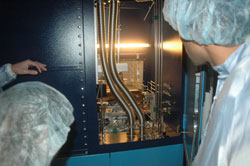 Two smart quizz winning Indian students from the Indian Institute of Technology (IIT) in Mumbai, Rahul Singh (from Jamshedpur) and Haripriya Mukundarajan (from Bangalore), visited SASNET and Lund University on Monday 23 February 2009. They were the winners of a Nobel prize quizz competition organised by the Embassy of Sweden in India in October 2008. The winners’ prize was an all-expenses paid, weeklong trip to Sweden where they would get an opportunity to visit Swedish universities and major technology companies in Lund, Göteborg, Linköping, Sandviken and Stockholm. SASNET’s deputy director Lars Eklund organised their visit to Lund University, that included visiting the Nanoscience laboratory at the Dept. of Physics (photo above). More information. Two smart quizz winning Indian students from the Indian Institute of Technology (IIT) in Mumbai, Rahul Singh (from Jamshedpur) and Haripriya Mukundarajan (from Bangalore), visited SASNET and Lund University on Monday 23 February 2009. They were the winners of a Nobel prize quizz competition organised by the Embassy of Sweden in India in October 2008. The winners’ prize was an all-expenses paid, weeklong trip to Sweden where they would get an opportunity to visit Swedish universities and major technology companies in Lund, Göteborg, Linköping, Sandviken and Stockholm. SASNET’s deputy director Lars Eklund organised their visit to Lund University, that included visiting the Nanoscience laboratory at the Dept. of Physics (photo above). More information. 
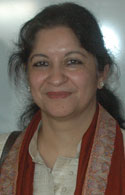 Professor Ravinder Kaur from the Dept. of Humanities and Social Sciences, Indian Institute of Technology (IIT) Delhi held a SASNET lecture at Lund University on Wednesday 11 March, 14.15–16. Prof. Kaur talked about ”Strangers as Spouses: Marriage Implications of India’s Skewed sex Ratio”, focusing on the continuing gender imbalance and the recent steep declines in the child sex ratio in India. The presentation is based on extensive fieldwork consisting of interviews with cross-region couples in the state of Haryana with additional evidence from Uttar Pradesh. Some fieldwork-based evidence has also been obtained from the bride-sending states of West Bengal and Kerala. An interesting finding and a hopeful sign is the positive sex ratio of the offspring of such marriages. The lecture was organised in collaboration with Lund University’s Dept. of Economic History, and the Centre for East and South-East Asian Studies (ACE). Venue: Conference room, Dept. of Economic History, Scheelevägen 15 B, 1st floor, Lund. More information (as a pdf-file). Professor Ravinder Kaur from the Dept. of Humanities and Social Sciences, Indian Institute of Technology (IIT) Delhi held a SASNET lecture at Lund University on Wednesday 11 March, 14.15–16. Prof. Kaur talked about ”Strangers as Spouses: Marriage Implications of India’s Skewed sex Ratio”, focusing on the continuing gender imbalance and the recent steep declines in the child sex ratio in India. The presentation is based on extensive fieldwork consisting of interviews with cross-region couples in the state of Haryana with additional evidence from Uttar Pradesh. Some fieldwork-based evidence has also been obtained from the bride-sending states of West Bengal and Kerala. An interesting finding and a hopeful sign is the positive sex ratio of the offspring of such marriages. The lecture was organised in collaboration with Lund University’s Dept. of Economic History, and the Centre for East and South-East Asian Studies (ACE). Venue: Conference room, Dept. of Economic History, Scheelevägen 15 B, 1st floor, Lund. More information (as a pdf-file). 
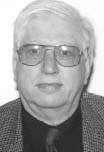 • Dr. Walter Andersen, Associate Director of the South Asia Studies Program at Paul H. Nitze School of Advanced International Studies, Johns Hopkins University, Washington, D.C., USA held a joint SASNET/UPF (Lund University Association of Foreign Affairs) lecture in Lund on Monday 16 March 2009, at 19.30. Dr. Andersen, who has a PhD in Political Science from the University of Chicago, lectured on ”Islamic militancy in India: A domestic issue with significant foreign policy implications” He has recently retired as chief of the U.S. State Department's South Asia Division in the Office of Analysis for the Near East and South Asia. Venue for the seminar: Café Athen, Sandgatan 2, Lund. More information about Dr. Andersen. • Dr. Walter Andersen, Associate Director of the South Asia Studies Program at Paul H. Nitze School of Advanced International Studies, Johns Hopkins University, Washington, D.C., USA held a joint SASNET/UPF (Lund University Association of Foreign Affairs) lecture in Lund on Monday 16 March 2009, at 19.30. Dr. Andersen, who has a PhD in Political Science from the University of Chicago, lectured on ”Islamic militancy in India: A domestic issue with significant foreign policy implications” He has recently retired as chief of the U.S. State Department's South Asia Division in the Office of Analysis for the Near East and South Asia. Venue for the seminar: Café Athen, Sandgatan 2, Lund. More information about Dr. Andersen. 
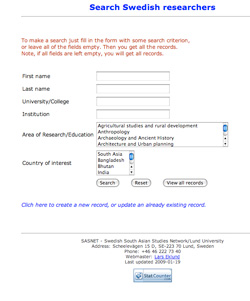 SASNET’s searchable database for Swedish and Nordic researchers involved in any kind of South Asia related research has been updated. The register, created in 2001 has been dormant for a long time but has now been reshuffled, more visibly presented, and with full interactivity for the users. The researchers already represented in the database are obliged to log in and do necessary changes. Log-in information has been sent by e-mail to them. Those Swedish and Nordic researchers not yet represented are kindly invited to join the register and enter information about current South Asia related research in the database. Please go to the entrance page www.sasnet.lu.se/updResearchers.php. As an old user click on the "update" button, as a new user click on the ”new user” button. Please note that your e-mail address will become your user name for future log-in. SASNET’s searchable database for Swedish and Nordic researchers involved in any kind of South Asia related research has been updated. The register, created in 2001 has been dormant for a long time but has now been reshuffled, more visibly presented, and with full interactivity for the users. The researchers already represented in the database are obliged to log in and do necessary changes. Log-in information has been sent by e-mail to them. Those Swedish and Nordic researchers not yet represented are kindly invited to join the register and enter information about current South Asia related research in the database. Please go to the entrance page www.sasnet.lu.se/updResearchers.php. As an old user click on the "update" button, as a new user click on the ”new user” button. Please note that your e-mail address will become your user name for future log-in. 
To search for individual researchers in the database, please go to www.sasnet.lu.se/registerf.html.
Please note that the database/register currently is only open for Swedish and Nordic researchers.
|
Our organisation
Office, staff and board members
SASNET activities at
Lund University 
How to find the SASNET
office
Magazines/Library
at SASNET’s root node office
SASNET Planning grants
Distribution cancelled after 2009 
Directions for SASNET 2001–2010
set up by Lund University.
New Directions expected in 2011

External evaluation report 2005
by Prof. Carla Risseeuw, Prof. Ghanshyam Shah and Director Lennart
Wohlgemuth
2009 internal evaluation review report of SASNET
by Dr. Stig Toft Madsen
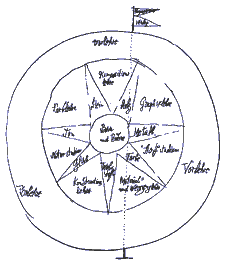
The inspiration came from the
artist Paul Klee, from whom we borrowed the wheel.
Click on his Principles for
the Bauhaus school from 1922 (above)
for enlargenment of the original sketch.
Project plan 2001–2005 Background history
of SASNET
SASNET workshop on Global
Networking in Lund,
27–28 August 2001
SASNET Contact
Journey Reports
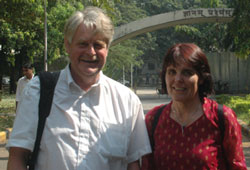 SASNET’s director Anna Lindberg and deputy director Lars Eklund travelled in Northern and Western/ Southwestern India during the period 1–30 November 2007.Totally, they visited more than 30 important universities and
research institutions, with an ambition to promote Indo-Swedish researcher cooperation
and student exchange in all fields, from medicine/natural sciences
to social sciences/humanities. A large number of fruitful meetings
were held in all the places visited, including Delhi, Thiruvananthapuram,
Kottayam, Kozhikode, Mumbai, Loni, Pune, Bangalore and Mysore.
In New Delhi, the Swedish Embassy also organised a reception/dinner
for the academic world in honour of the visiting SASNET delegation. Read
the short summary travel report, or read the more detailed travel report, with links to 34 special reports from each and every institution visited. SASNET’s director Anna Lindberg and deputy director Lars Eklund travelled in Northern and Western/ Southwestern India during the period 1–30 November 2007.Totally, they visited more than 30 important universities and
research institutions, with an ambition to promote Indo-Swedish researcher cooperation
and student exchange in all fields, from medicine/natural sciences
to social sciences/humanities. A large number of fruitful meetings
were held in all the places visited, including Delhi, Thiruvananthapuram,
Kottayam, Kozhikode, Mumbai, Loni, Pune, Bangalore and Mysore.
In New Delhi, the Swedish Embassy also organised a reception/dinner
for the academic world in honour of the visiting SASNET delegation. Read
the short summary travel report, or read the more detailed travel report, with links to 34 special reports from each and every institution visited.
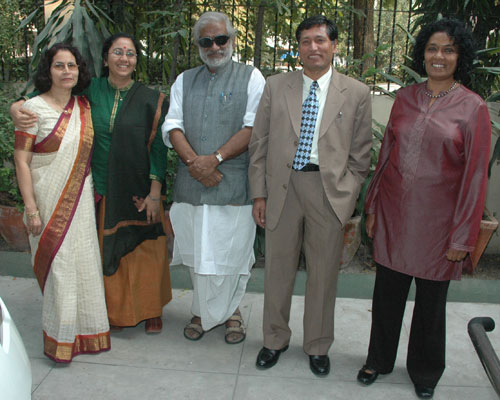 On Saturday 3 November 2007, a seminar meeting
was organised in New Delhi for SASNET’s South Asian Reference
group, consisting of a number of senior researchers from the
region,
who closely observe SASNET’s activities and give constructive
suggestions to the root node. On Saturday 3 November 2007, a seminar meeting
was organised in New Delhi for SASNET’s South Asian Reference
group, consisting of a number of senior researchers from the
region,
who closely observe SASNET’s activities and give constructive
suggestions to the root node.
SASNET’s
Director Anna Lindberg and the Deputy Director Lars Eklund
met and discussed with Dr. Rita Afsar, Bangladesh Institute
of Development Studies, Dhaka, Bangladesh; Dr.
Tek Nath Dhakal, Campus Chief of Public Administration Campus,
Tribhuvan University, Kathmandu, Nepal; Professor Kumudu Wijewardena,
University of Sri Jayewardenepura (SJP), Colombo, Sri Lanka;
Dr. Dipak Malik, Institute of Gandhian Studies,
Varanasi, India; and Dr. J. Devika, Centre for Development Studies (CDS), Thiruvananthapuram, Kerala, India. The only missing member was Professor Zulfiqar Bhutta,
Dept. of Paediatrics, Aga Khan University, Karachi, Pakistan. (More information about the group). The meeting was held at the Nordic Centre
in India (NCI) in Nizamuddin, New Delhi, and was organized informally as a “think tank” session. The atmosphere was conducive to an open and relaxed discussion, and the results were very fruitful. Read the report from the SASNET’s South Asian Reference Group meeting.
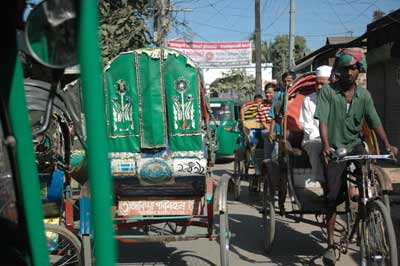 From 18 November
till 19 December 2005 SASNET’s director, Professor Staffan
Lindberg and the deputy director Lars Eklund travelled in the North-Eastern part of South Asia. They visited a great number of universities
and institutes in East and North-East
India (Kolkata, Bhubaneshwar, Patna, Siliguri, Guwahati and Shillong);
Bangladesh (Dhaka, Savar, Chittagong, Rajshahi and Sylhet); Bhutan
(Thimphu); and Nepal (Kathmandu). Go
for the extensive contact journey frame report. From 18 November
till 19 December 2005 SASNET’s director, Professor Staffan
Lindberg and the deputy director Lars Eklund travelled in the North-Eastern part of South Asia. They visited a great number of universities
and institutes in East and North-East
India (Kolkata, Bhubaneshwar, Patna, Siliguri, Guwahati and Shillong);
Bangladesh (Dhaka, Savar, Chittagong, Rajshahi and Sylhet); Bhutan
(Thimphu); and Nepal (Kathmandu). Go
for the extensive contact journey frame report.
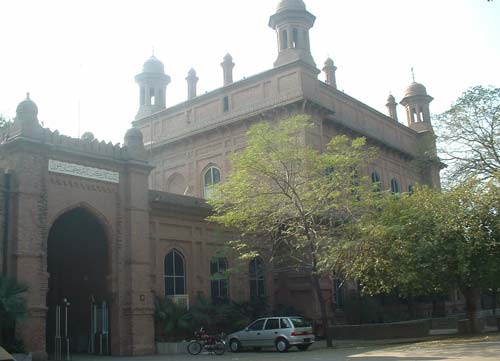 A SASNET contact journey to Pakistan and Afghanistan was made by SASNET’s director Staffan Lindberg, and webmaster/deputy
director Lars Eklund, 20 November – 7 December 2003. The aim
of the tour was to link up the SASNET activities with universities
and research institutions in the two countries. A SASNET contact journey to Pakistan and Afghanistan was made by SASNET’s director Staffan Lindberg, and webmaster/deputy
director Lars Eklund, 20 November – 7 December 2003. The aim
of the tour was to link up the SASNET activities with universities
and research institutions in the two countries.
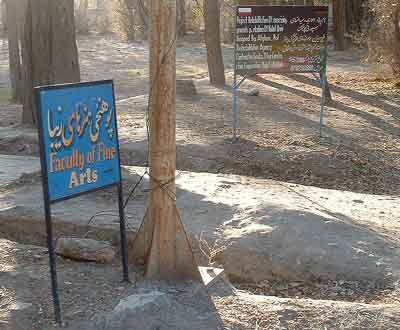 They visited Karachi, Islamabad, and Lahore in Pakistan; and Kabul
in Afghanistan. It turned out to be an extremely fruitful journey,
both building on the already existing academic links between a few
researchers/institutions in Sweden and Pakistan, and promoting new
forms of cooperation there as well as in Afghanistan. Read
the full reports on the journey. They visited Karachi, Islamabad, and Lahore in Pakistan; and Kabul
in Afghanistan. It turned out to be an extremely fruitful journey,
both building on the already existing academic links between a few
researchers/institutions in Sweden and Pakistan, and promoting new
forms of cooperation there as well as in Afghanistan. Read
the full reports on the journey.
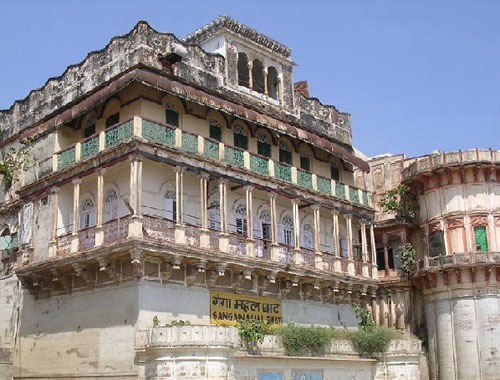 In the Spring 2002, Staffan Lindberg, and
Lars Eklund made a tour to South Asia in
order to link up the SASNET activities with universities and research
institutions in different countries of the region. The two visited
the Maldives (Male) 26–27 February, Sri Lanka 28 February–5
March, India (New Delhi, Varanasi, Hyderabad, Kolkata and Shantiniketan)
6–19 March; and finally Bangladesh 20–22 March. Read
their reports from the journey. In the Spring 2002, Staffan Lindberg, and
Lars Eklund made a tour to South Asia in
order to link up the SASNET activities with universities and research
institutions in different countries of the region. The two visited
the Maldives (Male) 26–27 February, Sri Lanka 28 February–5
March, India (New Delhi, Varanasi, Hyderabad, Kolkata and Shantiniketan)
6–19 March; and finally Bangladesh 20–22 March. Read
their reports from the journey.
 SASNET’s former Director, Prof. Staffan Lindberg, participated in the second biannual India Forum that was organised by the German Marshal Fund of
the United States (GMF) in Stockholm on 1–2 October 2010. The conference, co-organised by the Legatum Institute and the Swedish Ministry for Foreign Affairs focused on ‘India’s evolving foreign policy, the economic and commercial relationships between India and the West, common challenges in Afghanistan and Pakistan, the potential for convergence on climate and energy policy, and response to a more assertive China’. The invited participants included high-profile policymakers, intellectuals, academicians, journalists, and business people from Europe, the United States, and India. The purpose with this kind of closed-door conference is to facilitate cooperation and coordination through informal discussions. Read Staffan Lindberg’s report from the Stockholm India Forum 2010. SASNET’s former Director, Prof. Staffan Lindberg, participated in the second biannual India Forum that was organised by the German Marshal Fund of
the United States (GMF) in Stockholm on 1–2 October 2010. The conference, co-organised by the Legatum Institute and the Swedish Ministry for Foreign Affairs focused on ‘India’s evolving foreign policy, the economic and commercial relationships between India and the West, common challenges in Afghanistan and Pakistan, the potential for convergence on climate and energy policy, and response to a more assertive China’. The invited participants included high-profile policymakers, intellectuals, academicians, journalists, and business people from Europe, the United States, and India. The purpose with this kind of closed-door conference is to facilitate cooperation and coordination through informal discussions. Read Staffan Lindberg’s report from the Stockholm India Forum 2010. 
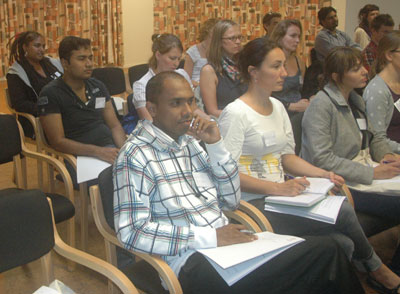 SASNET has organised two successful conferences on South Asian Studies for young Nordic scholars in August 2009 and August 2010. They were held at Falsterbo Kursgård in Höllviken (south of Malmö). The aim of the conference was to gather masters students, PhD candidates, and young post-docs in Sweden, Denmark, Finland, and Norway who focus on South Asia in their research studies, reminding of another successful conference that SASNET organised in Marstrand in October 2002 (more information about the 2002 conference). SASNET has organised two successful conferences on South Asian Studies for young Nordic scholars in August 2009 and August 2010. They were held at Falsterbo Kursgård in Höllviken (south of Malmö). The aim of the conference was to gather masters students, PhD candidates, and young post-docs in Sweden, Denmark, Finland, and Norway who focus on South Asia in their research studies, reminding of another successful conference that SASNET organised in Marstrand in October 2002 (more information about the 2002 conference).
The conferences have proved to make a difference from the standard academic conferences and paid attention explicitly to the students. Something that has been evaluated very positively from all participants.
A report on the 2009 conference was compiled by Ms. Julia Velkova from the conference organising committee. Read the report (as a pdf-file).
The conference drew 45 participants. It was planned by an organising committee led by Dr. Kristina Myrvold, Dept. of History of Religions, Lund University, PhD Candidate Ferdinando Sardella, Gothenburg University, and Julia Velkova, who is an M.A. in Eastern Philosophy and Culture from the University of Sofia, Bulgaria.
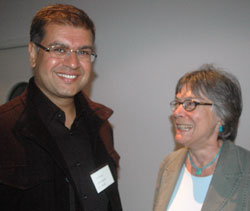 Prof. Vinayak Chaturvedi, University of California Irvine, was the keynote speaker. He lectured about ”Dialogues with M.K. Gandhi on History and Violence in India”. Prof. Vinayak Chaturvedi, University of California Irvine, was the keynote speaker. He lectured about ”Dialogues with M.K. Gandhi on History and Violence in India”.
See the programme for 2009 conference, including a list of participants (as a pdf-file)
Photos from the 2009 conference.
The second SASNET conference on
South Asian Studies for young Nordic scholars was held on 18–20 August 2010. 23 masters students, PhD candidates and recent PhDs from Sweden, Denmark, Norway and Finland participated in the three-day conference focusing on three major issues: Interdisciplinary Research; Field Work and Ethics; and Academic Career (Publishing, Teaching, Networking).
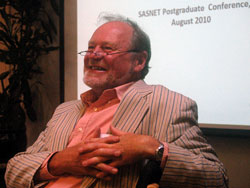 The keynote speaker was Prof. Emeritus Graham Chapman (photo) from the Dept. of Geography, Lancaster University, UK. Other main speakers were
Dr. Sirpa Tenhunen, Department of Social and Cultural Anthropology, University of Helsinki, Finland; Mr. Teddy Primack, Director of Academic Documents Associates, USA; Associate Professor Jan Vang, Department of Production, Aalborg University, Denmark; Dr. Anna Godhe, Department of Marine Ecology, University of Gothenburg; and Dr. Maria Lantz, Department of Art & Architecture, Royal University College of Fine Arts (KKH), Stockholm. The keynote speaker was Prof. Emeritus Graham Chapman (photo) from the Dept. of Geography, Lancaster University, UK. Other main speakers were
Dr. Sirpa Tenhunen, Department of Social and Cultural Anthropology, University of Helsinki, Finland; Mr. Teddy Primack, Director of Academic Documents Associates, USA; Associate Professor Jan Vang, Department of Production, Aalborg University, Denmark; Dr. Anna Godhe, Department of Marine Ecology, University of Gothenburg; and Dr. Maria Lantz, Department of Art & Architecture, Royal University College of Fine Arts (KKH), Stockholm.
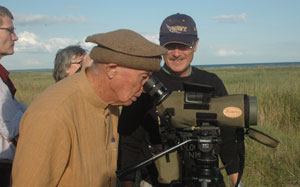 The 2010 conference was again held at Falsterbo conference retreat (Falsterbo kursgård) in Höllviken. This time an ornitological excursion led by Dr. Stig Toft Madsen was included in the programme, in order to watch birds and seals at the Falsterbo peninsula. (Prof. Bo Lindblad watches birds on photo above). The 2010 conference was again held at Falsterbo conference retreat (Falsterbo kursgård) in Höllviken. This time an ornitological excursion led by Dr. Stig Toft Madsen was included in the programme, in order to watch birds and seals at the Falsterbo peninsula. (Prof. Bo Lindblad watches birds on photo above).
More information on the conference web page.
See the full programme in the conference folder.
See Lars Eklund’s photos from the conference
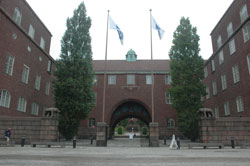 Anna Lindberg and Lars Eklund from SASNET visited Stockholm and Västerås on 15–16 June 2009. The visit to Stockholm focused on discussions regarding possible forms for continued funding for SASNET from 2010, with visits to the Royal Institute of Technology (KTH), and the Swedish International Development Cooperation Agency, Sida. They also made some networking visits to a couple of research departments at KTH – the Dept. of Land and Water Resources
Engineering, and the KTH Department of Aeronautical and
Vehicle Engineering, actively engaged in South Asia related projects. Anna Lindberg and Lars Eklund from SASNET visited Stockholm and Västerås on 15–16 June 2009. The visit to Stockholm focused on discussions regarding possible forms for continued funding for SASNET from 2010, with visits to the Royal Institute of Technology (KTH), and the Swedish International Development Cooperation Agency, Sida. They also made some networking visits to a couple of research departments at KTH – the Dept. of Land and Water Resources
Engineering, and the KTH Department of Aeronautical and
Vehicle Engineering, actively engaged in South Asia related projects.
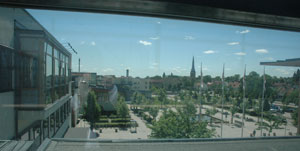 Lars continued to Västerås to meet researchers and programme coordinators at Mälardalen University, working on South Asia related collaboration projects in research and education, including the ongoing Erasmus Mundus External Cooperation programme EURECA. Read a report from Anna’s and Lars’ visit to Stockholm and Västerås. Lars continued to Västerås to meet researchers and programme coordinators at Mälardalen University, working on South Asia related collaboration projects in research and education, including the ongoing Erasmus Mundus External Cooperation programme EURECA. Read a report from Anna’s and Lars’ visit to Stockholm and Västerås.
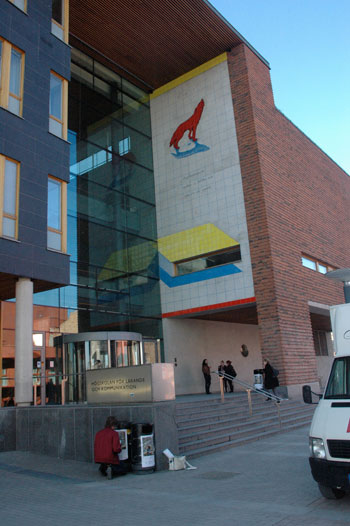 In mid-March 2009 SASNET’s deputy director Lars Eklund visited two universities in southern Sweden, Jönköping University and Växjö University. Networking is the main purpose of SASNET, and a regular feature of our activities therefore consists of visiting Swedish universities to meet with researchers and educationists involved in South Asia related research and/or educational collaboration projects. On 19 March, Lars visited Jönköping University, one of the strongest in Sweden when it comes to internationalisation work including collaboration projects with South Asia. Lars met with international coordinators and researchers/educationists from all four schools of the university – Jönköping International Business School (JIBS); School of Education and Communication; School of Engineering; and School of Health Sciences. In mid-March 2009 SASNET’s deputy director Lars Eklund visited two universities in southern Sweden, Jönköping University and Växjö University. Networking is the main purpose of SASNET, and a regular feature of our activities therefore consists of visiting Swedish universities to meet with researchers and educationists involved in South Asia related research and/or educational collaboration projects. On 19 March, Lars visited Jönköping University, one of the strongest in Sweden when it comes to internationalisation work including collaboration projects with South Asia. Lars met with international coordinators and researchers/educationists from all four schools of the university – Jönköping International Business School (JIBS); School of Education and Communication; School of Engineering; and School of Health Sciences.
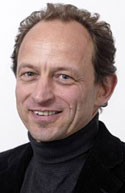 The most interesting South Asia related news at Jönköping University right now was the fact that JIBS has taken over the responsibility to develop a technical university in the Pakistani city of Sialkot. A project initially run by the Royal Institute of Technology (KTH) in Stockholm, but since KTH withdrew from the project it was administered by Dr. Ramon Wyss, at the time Vice-president for International Affairs at JIBS. The most interesting South Asia related news at Jönköping University right now was the fact that JIBS has taken over the responsibility to develop a technical university in the Pakistani city of Sialkot. A project initially run by the Royal Institute of Technology (KTH) in Stockholm, but since KTH withdrew from the project it was administered by Dr. Ramon Wyss, at the time Vice-president for International Affairs at JIBS.
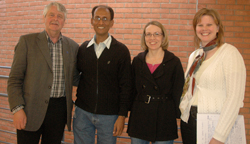 |
The following day, 20 March, Lars visited Växjö University to meet researchers and educationists involved in South Asia projects at the School of Humanities and School of Social Sciences. The visit also coincided with a seminar by Dr. Ashis Sengupta, Professor of English at North Bengal University in Siliguri, India who had been invited to Växjö on a SASNET guest lecture programme grant (more information). The most interesting news from Växjö is that the university is going to merge with Kalmar University on 1 January 2010. The organisation of faculties and institutions was decided upon as recently as 26 March 2009 (more information about the new merged university that will be named Linnaeus University).
Read Lars Eklund’s Report from the visit to Jönköping and Växjö universities.
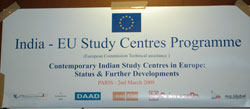 On Monday 2 March 2009, Lars Eklund and Stig Toft Madsen from SASNET participated in a brain storming/awareness raising workshop on ”Contemporary India Study Centres in Europe: Status & Further Developments” that was held in Paris. The so-called India-EU Study Centres Programme (IESCP) was set up by the European Commission in 2008 as an integral part of the India-EU Joint Action Plan adopted in 2005. It aims to promote a better understanding of the EU in India and vice versa through academic and other forms of collaboration. Its chief objective is both to strengthen existing study centres and establish new ones focusing on EU studies in India as well as on contemporary Indian studies in Europe. The meeting was organised by Sciences Po/CERI (Center
for International Studies and Research) in Paris. More information. On Monday 2 March 2009, Lars Eklund and Stig Toft Madsen from SASNET participated in a brain storming/awareness raising workshop on ”Contemporary India Study Centres in Europe: Status & Further Developments” that was held in Paris. The so-called India-EU Study Centres Programme (IESCP) was set up by the European Commission in 2008 as an integral part of the India-EU Joint Action Plan adopted in 2005. It aims to promote a better understanding of the EU in India and vice versa through academic and other forms of collaboration. Its chief objective is both to strengthen existing study centres and establish new ones focusing on EU studies in India as well as on contemporary Indian studies in Europe. The meeting was organised by Sciences Po/CERI (Center
for International Studies and Research) in Paris. More information.
SASNET co-organised an
international workshop on ”Women and migration in South
Asia. Health and Social Consequences” that was held in
Colombo, Sri Lanka 9–11 February 2009. The workshop
was organised by SASNET in collaboration with the University
of Sri Jayewardenepura (SJP) in Colombo, and the Division
of International Maternal and Child Health (IMCH) at Uppsala
University. Researchers in the field were invited from all
over the South Asia region and from Swedish institutions. SASNET’s
director Anna Lindberg and deputy director Lars Eklund both
participated in the workshop.
The focus was on the consequences of migration for women, their
children and families in South Asia. The themes to be covered
were the effects of such migration with respect to: social consequences, gender perspective, economy at family level, health including sexually transmitted diseases, and child development and psychology. See the full programme
for the workshop.
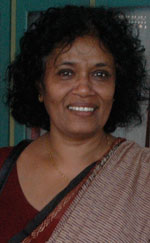 The
workshop was also the first effort to realise the concept of SASNET sub-networks,
put forward at the informal meeting by SASNET’s South Asian Reference Group
held in Delhi in November 2007 (more information),
later decided upon by SASNET’s board. One of the reference group members,
Dr. Kumudu Wijewardena (photo to the right) from the University
of Sri Jayewardenepura (SJP) in Colombo chaired the Colombo workshop. A separate
meeting was held with SASNET’s South Asian Reference Group on Tuesday
10 February. Read a report from the meeting The
workshop was also the first effort to realise the concept of SASNET sub-networks,
put forward at the informal meeting by SASNET’s South Asian Reference Group
held in Delhi in November 2007 (more information),
later decided upon by SASNET’s board. One of the reference group members,
Dr. Kumudu Wijewardena (photo to the right) from the University
of Sri Jayewardenepura (SJP) in Colombo chaired the Colombo workshop. A separate
meeting was held with SASNET’s South Asian Reference Group on Tuesday
10 February. Read a report from the meeting
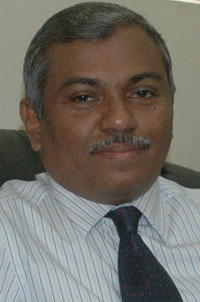 |
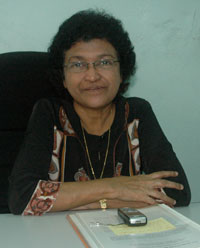 |
On his way to Sri Lanka, Lars Eklund also visited the Maldives
for two days, and met the Minister of State for Education, Dr.
Ahmed Ali Maniku; and Ms. Naseema Mohamed, Special Advisor to
the Dept. of History, National Centre for Linguistic and Historic
research in Male. Read Lars’ February
2009 report from Maldives.
Anna Lindberg on the other hand proceeded to Kerala, India after
participating in the Colombo workshop. She participated
in discussions about the development of the new so-called Sustainable
Kerala Network, a Swedish South Asian Network on Sustainable
Development, initiated by Prof. Baboo Nair, Lund University. The meeting was held at Kerala University in Thiruvananthapuram on 21 February 2009. Read Anna’s report from the meeting.
Anna also participated in a meeting with representatives of CREST, the Centre for Research and Education for Social Transformation in Kozhikode, and the NGO Kabani, based in Wayanad. The meeting was also held in Thiruvananthapuram on 21 February 2009. Read Anna’s report from the meeting.
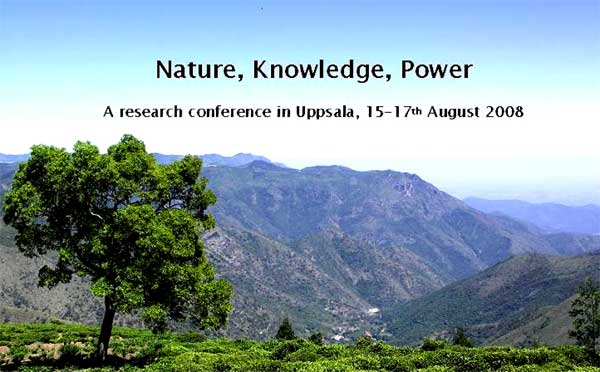 SASNET was the main funding agency behind the international research conference on “Nature, Knowledge, Power” that was held in Uppsala 15-17 August 2008. The conference, hosted by the Department of Urban and Rural Development at the Swedish University of Agricultural Sciences (SLU), and chaired by Dr. Gunnel Cederlöf, Dept. of History (and chairperson of SASNET’s board) brought together researchers from different academic fields, concerned with questions of environment and society under present and historical conditions. About forty researchers and research students equally from South Asian and European universities participated in the conference and 25 full research papers were presented papers within five panels: “Energy: renewable and sustainable?”, “Competing rights, codifying law”, “Community rights under neoliberal rule”, “Who needs conservation? Nature, people, survival”, and “Ideologies of environmental change: from imperial modernization to postcolonial social equality?” The conference administrator was Henrik Chetan Aspengren. SASNET was the main funding agency behind the international research conference on “Nature, Knowledge, Power” that was held in Uppsala 15-17 August 2008. The conference, hosted by the Department of Urban and Rural Development at the Swedish University of Agricultural Sciences (SLU), and chaired by Dr. Gunnel Cederlöf, Dept. of History (and chairperson of SASNET’s board) brought together researchers from different academic fields, concerned with questions of environment and society under present and historical conditions. About forty researchers and research students equally from South Asian and European universities participated in the conference and 25 full research papers were presented papers within five panels: “Energy: renewable and sustainable?”, “Competing rights, codifying law”, “Community rights under neoliberal rule”, “Who needs conservation? Nature, people, survival”, and “Ideologies of environmental change: from imperial modernization to postcolonial social equality?” The conference administrator was Henrik Chetan Aspengren.
The keynote speakers were Dr. Amita Baviskar from the Institute of Economic Growth at Delhi University, India and Prof. Arun Agrawal, University of Michigan. At the conference, an inter-disciplinary network of researchers focusing on South Asian environmental issues began to emerge. SASNET will work to find ways to let this network materialize within its own activities. More information about the Uppsala conference.
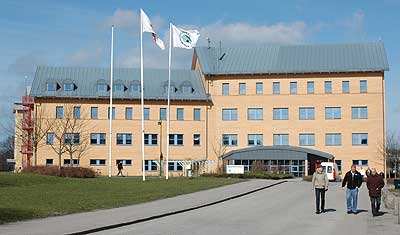 On
Wednesday 14 March 2007, SASNET’s
Director Staffan Lindberg and Deputy Director Lars Eklund visited the
School of Engineering at Blekinge Institute of Technology (BTH)
in Ronneby. They visited the campus
for a discussion of its activities related to South Asia and a
discussion of would SASNET could do for the promotion of its South
Asia activities. They were hosted by Jan-Olof
Gustavsson, Dean, School of Engineering, Maria
Engelmark, Head of International Office, Lars
Lundberg, Professor of Computer Systems Engineering, and Mikael Åsman,
Head of Masters Programme in Electrical Engineering. Read
a report from the SASNET visit to Ronneby. On
Wednesday 14 March 2007, SASNET’s
Director Staffan Lindberg and Deputy Director Lars Eklund visited the
School of Engineering at Blekinge Institute of Technology (BTH)
in Ronneby. They visited the campus
for a discussion of its activities related to South Asia and a
discussion of would SASNET could do for the promotion of its South
Asia activities. They were hosted by Jan-Olof
Gustavsson, Dean, School of Engineering, Maria
Engelmark, Head of International Office, Lars
Lundberg, Professor of Computer Systems Engineering, and Mikael Åsman,
Head of Masters Programme in Electrical Engineering. Read
a report from the SASNET visit to Ronneby.
 On
Thursday 15 February 2007, SASNET’s Director Staffan Lindberg
and Deputy Director Lars Eklund visited Kalmar University and
met researchers involved in the SASNET network. Prof.
William Hogland at the Dept. of Technology (Ingenjörshögskolan)
presented plans for a new BSc/MSc/PhD programme in Environmental
Science and Engineering that is planned for in collaboration with
the Asian Institute of Technology in Thailand. Prof. Hans Jansson at
the Baltic Business School (BBS), a long time
specialist on Swedish business in India and China, presented the International
research carried out at BBS. Read
the SASNET report from Kalmar University. On
Thursday 15 February 2007, SASNET’s Director Staffan Lindberg
and Deputy Director Lars Eklund visited Kalmar University and
met researchers involved in the SASNET network. Prof.
William Hogland at the Dept. of Technology (Ingenjörshögskolan)
presented plans for a new BSc/MSc/PhD programme in Environmental
Science and Engineering that is planned for in collaboration with
the Asian Institute of Technology in Thailand. Prof. Hans Jansson at
the Baltic Business School (BBS), a long time
specialist on Swedish business in India and China, presented the International
research carried out at BBS. Read
the SASNET report from Kalmar University.
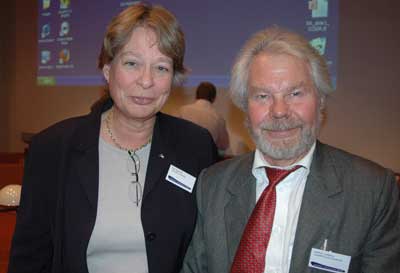 |
SASNET
successfully held a workshop on the "Role of South Asia
in the Internationa-lisation of Higher Education in Sweden" at
Nobel Forum, Karolinska Institutet in Stockholm 28-29 November
2006. It was jointly organised by SASNET, Karolinska
Institutet Medical University and the Swedish Institute, and
involved sessions with representatives from 20 Swedish universities,
and from the International Programme Office for Education and
Training; the Swedish National Agency for Higher Education; STINT;
the Government ministries of Education and Foreign Affairs; and
the South Asian embassies in Stockholm.
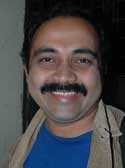 The
focus was on experiences from masters and PhD programmes in Sweden
as well as in South Asia, with an aim to promote increased academic
exchange with South Asia. The
focus was on experiences from masters and PhD programmes in Sweden
as well as in South Asia, with an aim to promote increased academic
exchange with South Asia.
Most of the workshop presentations are now available on our web site
as pdf-files. They include Mr. Sunandan Roy Chowdhury’s (photo
to the right) provocative keynote presentatIon, titled ”The
Moffusil and the Metropolitan – Higher
Education’s Meandering Paths”. In addition to this,
Jan Magnusson (a key person behind the creation of SASNET seven years
ago and now a member of SASNET’s board) has written a report,
summarizing the two-day workshop sessions. Read
the workshop report.
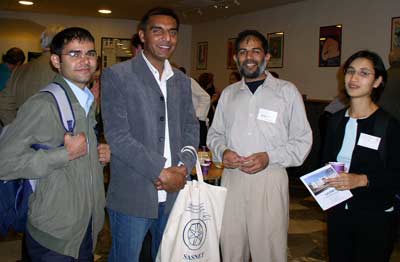 SASNET successfully arranged the 18th European Conference on Modern
South Asian Studies in Lund 6–9 July 2004. With 360
participants from all over the World actually turning up (including
a large number of PhD candidates and participants from from South
Asia itself) it was the largest ECMSAS conference so far, and certainly
the largest gathering ever on Swedish soil of South Asia oriented
researchers, covering all fields from the humanities and social
sciences to technology, natural sciences and medicine. Full
updated information on the Lund conference. SASNET successfully arranged the 18th European Conference on Modern
South Asian Studies in Lund 6–9 July 2004. With 360
participants from all over the World actually turning up (including
a large number of PhD candidates and participants from from South
Asia itself) it was the largest ECMSAS conference so far, and certainly
the largest gathering ever on Swedish soil of South Asia oriented
researchers, covering all fields from the humanities and social
sciences to technology, natural sciences and medicine. Full
updated information on the Lund conference.
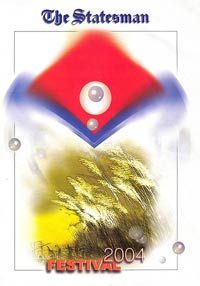 An extensive Conference Diary has been prepared by Dr. William Radice,
renowned Bengali Studies scholar from the School of Oriental
and African Studies, University of London, UK, and a brilliant writer.
He was assigned by the conference organisers to write it.
Read his report called ”Swedish Rhapsody”! (as a
pdf-file) An extensive Conference Diary has been prepared by Dr. William Radice,
renowned Bengali Studies scholar from the School of Oriental
and African Studies, University of London, UK, and a brilliant writer.
He was assigned by the conference organisers to write it.
Read his report called ”Swedish Rhapsody”! (as a
pdf-file)
Radice’s article has now also been published in extenso
in the 2004 Puja Festival publication from the The Statesman, Kolkata,
in October 2004. The article is illustrated with photos of Lund
University.
Behnoush Payvar’s photos from the five days of the
conference are now published on the web. Go
for the photo albums!
A large number of full papers presented to the
44 conference panels have been posted on the conference
website, and are still available. See the full
list of conference panels, abstracts and papers
The panel convenors have presented reports on the outcome
of their respective panel. Reports for 41 out of the 44
panels are available. Go for the summary
of Panel Reports (as a pdf-file)
SASNET’s webmaster Lars Eklund regularly visits
departments and researchers/educationists involved in South Asia
related research at Swedish universities.
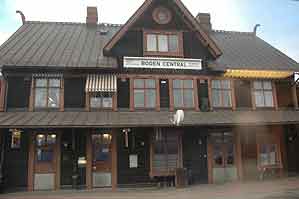 It is part of an effort to strenghten the SASNET national network.
In November 2004 he visited Örebro University in connection
with the 10th Anniversary celebration of the Sweden–India
Project, run by the Social Work programme; Department of Behavioural,
Social and Legal Sciences (report from the
occasion), but also visited the Department
of Caring Sciences. In December 2004 Lars went to Luleå
University of Technology, where he visited the Department of Economics and the Divisions of Industrial
Design, Mineral Processing, and Operation and Maintenance Engineering.
Earlier during 2004 Lars Eklund also visited the University of Dalarna,
Campus Falun, Göteborg University, and Linköping University
Campus Norrköping. It is part of an effort to strenghten the SASNET national network.
In November 2004 he visited Örebro University in connection
with the 10th Anniversary celebration of the Sweden–India
Project, run by the Social Work programme; Department of Behavioural,
Social and Legal Sciences (report from the
occasion), but also visited the Department
of Caring Sciences. In December 2004 Lars went to Luleå
University of Technology, where he visited the Department of Economics and the Divisions of Industrial
Design, Mineral Processing, and Operation and Maintenance Engineering.
Earlier during 2004 Lars Eklund also visited the University of Dalarna,
Campus Falun, Göteborg University, and Linköping University
Campus Norrköping.
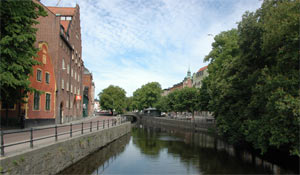 On
20 June 2005 Lars visited Uppsala University, where he met with
researchers at the Department of Linguistics and Philology (in the South Asian Languages and Culture division, the Iranian languages division,
and the Linguistics and Computer Lingustics division); at the Department of Cultural
Anthropology and Ethnology; and finally at the International
Maternal and Child Health (IMCH) division of the Dept. of Women's
and Children's Health. On
20 June 2005 Lars visited Uppsala University, where he met with
researchers at the Department of Linguistics and Philology (in the South Asian Languages and Culture division, the Iranian languages division,
and the Linguistics and Computer Lingustics division); at the Department of Cultural
Anthropology and Ethnology; and finally at the International
Maternal and Child Health (IMCH) division of the Dept. of Women's
and Children's Health.
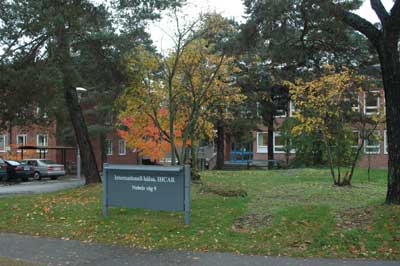 The
following day he proceeded to Karolinska Institutet Medical University
in Stockholm and met with researchers at the Division
of International Health (IHCAR), the Center
of Molecular Medicine; the Paediatric
Endocrinology Unit of the Dept. of Woman and Child Health, and
other departments involved in South Asia related research and education.
He also attended the meeting of Karolinska Institutet Research and
Training Committee, KIRT, when it decided to intensify and extend
the already existing collaboration on research and research training
with Pakistan (more information on KIRT). The
following day he proceeded to Karolinska Institutet Medical University
in Stockholm and met with researchers at the Division
of International Health (IHCAR), the Center
of Molecular Medicine; the Paediatric
Endocrinology Unit of the Dept. of Woman and Child Health, and
other departments involved in South Asia related research and education.
He also attended the meeting of Karolinska Institutet Research and
Training Committee, KIRT, when it decided to intensify and extend
the already existing collaboration on research and research training
with Pakistan (more information on KIRT).
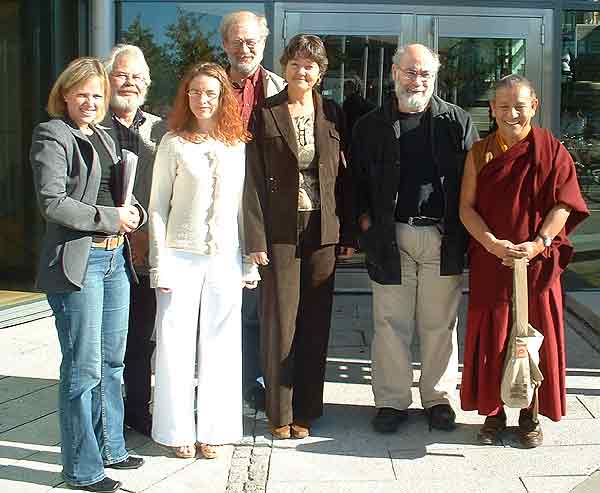 Follow-up meetings to the SASNET’s symposium in Marstrand
in October 2002 were arranged at Karlstad University and Göteborg
University in September 2003. Researchers, teachers and students
engaged in South Asian studies at Karlstad
University presented their work at a meeting on Wednesday
24 September (some of the participants shown on the photo to
the right). Read a report from the
Karlstad seminar. Follow-up meetings to the SASNET’s symposium in Marstrand
in October 2002 were arranged at Karlstad University and Göteborg
University in September 2003. Researchers, teachers and students
engaged in South Asian studies at Karlstad
University presented their work at a meeting on Wednesday
24 September (some of the participants shown on the photo to
the right). Read a report from the
Karlstad seminar.
Researchers, teachers and students engaged in South Asia related
research at Göteborg University
were given an introduction to SASNET and its web site at a meeting
on Thursday 25 September. More
information on the meeting in which SASNET’s Staffan Lindberg
and Lars Eklund took part.
As a follow-up on the discussions
that emerged at SASNET’s symposium for South Asia oriented
PhD students in Marstrand in October 2002 (read
the reports) Staffan Lindberg and Lars Eklund from SASNET visited
Stockholm and Uppsala 14–16 May 2003, and had local meetings
with researchers, teachers and students.
In Stockholm a meeting
was held at Karolinska Institutet Medical University on Wednesday
14 May 2003, with representatives from Stockholm University; Karolinska
Institutet; Royal Institute of Technology (KTH); and Södertörn
University College. Read a report from
the meeting.
In
Uppsala the Collegium for Development Studies held
a full-day seminar with PhD students, supervisors, and teachers/researchers,
with an introduction by Staffan Lindberg and Lars Eklund, on Friday
16 May, at Atrium Hotell and Conference.
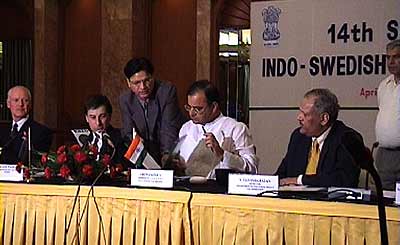 SASNET was represented in the Swedish delegation when the 14th session
of the joint Indo-Swedish commission met in New Delhi 1–2
April 2003. The delegations were led by Swedish minister of trade
and industry Mr Leif Pagrotsky, and Indian minister for commerce
and industry Mr Arun Jaitley. Although mainly focussing on issues
of trade and investment the session also included some matters pertaining
to science and technology.
SASNET was represented in the Swedish delegation when the 14th session
of the joint Indo-Swedish commission met in New Delhi 1–2
April 2003. The delegations were led by Swedish minister of trade
and industry Mr Leif Pagrotsky, and Indian minister for commerce
and industry Mr Arun Jaitley. Although mainly focussing on issues
of trade and investment the session also included some matters pertaining
to science and technology.
A paragraph stating SASNET's networking purpose and capacity to
act as an intermediary between the Swedish research community and
MHRD was added to the official minutes of the session.
Read Jan Magnusson’s report from the meeting.
The conference on Swedish Development Studies research,
named ”Fattiga och rika. Aktuell utvecklingsforskning och
dess villkor i Sverige” was organised by Sida/SAREC and
Lund University on 9–11 January 2003. The conditions for development
research in Sweden was thoroughly discussed, and a large number
of Swedish researchers presented their projects/programmes during
the extremely fruitful conference. Several of the projects are related
to South Asia. See SASNET’s list
of these, accompanied by abstracts.
We also present papers presented by two of the key speakers: •
Professor Barbara Harriss-White on ”Unruly
and Informal Globalisation and its Impact on Development: A Background
Note”, and • Professor Keith Griffin
on ”Economic Globalisation and Institutions
of Global Governance” (Word documents).
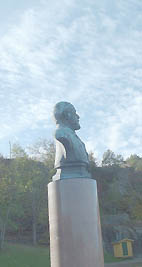 The SASNET symposium for Swedish PhD students and post-docs
engaged in research related to South Asia took place on 25–27
October 2002, at Marstrands Varmbadhus, north of Göteborg.
The sessions were devoted to discuss the situation of PhD students
in South Asian Studies or South Asia relevant studies (recruitment,
fieldwork, supervision, finishing, post-doc situation). Programme,
participants list and basis for discussions are available on our
web page http://www.sasnet.lu.se/phdsymp.html.
Reviews from the sessions and the group discussions are also published. The SASNET symposium for Swedish PhD students and post-docs
engaged in research related to South Asia took place on 25–27
October 2002, at Marstrands Varmbadhus, north of Göteborg.
The sessions were devoted to discuss the situation of PhD students
in South Asian Studies or South Asia relevant studies (recruitment,
fieldwork, supervision, finishing, post-doc situation). Programme,
participants list and basis for discussions are available on our
web page http://www.sasnet.lu.se/phdsymp.html.
Reviews from the sessions and the group discussions are also published.
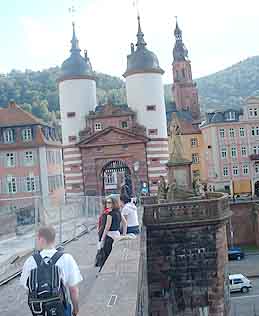 SASNET was represented by both Staffan Lindberg and Lars Eklund
at the 17th European Conference on Modern South Asian Studies,
which took place at Heidelberg, Germany, 9–14 September, 2002.
300 participating South Asia researchers from all over the World
made the conference into a major event. Read
our report on the conference. We also present a few snapshots
from the conference. See our images! SASNET was represented by both Staffan Lindberg and Lars Eklund
at the 17th European Conference on Modern South Asian Studies,
which took place at Heidelberg, Germany, 9–14 September, 2002.
300 participating South Asia researchers from all over the World
made the conference into a major event. Read
our report on the conference. We also present a few snapshots
from the conference. See our images!
SASNET International Workshop on global
networking at Lund 27–28 August 2001
The SASNET workshop about global networking in South Asian studies
took place in Lund on 27-28 August 2001. About 40 persons attended
the workshop and gave a good start for SASNET’s global networking.
Full report with all the papers read at
the workshop.
The final discussion round at the last day of SASNET’s workshop
on global networking in August, 2001, a discussion which summed
up the whole workshop, is transcribed and available on the SASNET
gateway. Go straight to it.
A workshop on ”Managing Common Resources
– What is the solution?” was orgaanised at Lund University
on 10–11 September 2001. SASNET’s Staffan Lindberg
was the key organiser of the symposium. Go
to the conference report including full research papers.
SASNET planning Conference in October 2000
On October 14-15, 2000 around 70 South Asia researchers in Sweden
came together at Grand Hotel in Lund to discuss the formation of
SASNET. Discussions were held on many topics. Reports
from the conference are to be found at SASNET´s old web
page.
Report from Karlstad.
Staffan Lindberg and Jan Magnusson visited Karlstad University,
December, 1, 2000.
Report
from Uppsala. Staffan Lindberg and Jan Magnusson visited
Uppsala University, December, 18, 2000.
Principles for the Third Task,
sugested by Jan Magnusson in November 2000, and agreed upon by the
SASNET board
Regional initiative in which SASNET is highly involved.
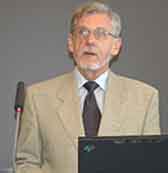 •
The ØRNAST educational cooperation project between the universities
of Lund and Copenhagen was formally inaugurated with a ceremony
at Copenhagen University on Tuesday 14 September 2004. •
The ØRNAST educational cooperation project between the universities
of Lund and Copenhagen was formally inaugurated with a ceremony
at Copenhagen University on Tuesday 14 September 2004.
More information on the ØRNAST cooperation.
Administrative
report no. 1 (Work report for the period August 1999 – 15
February 2001)
By Staffan Lindberg, acting
co-ordinator and chairman of the working group for SASNET; assisted
by Jan Magnusson, member of the working group and acting secretary/webmaster
until 31 December 2000 (Lund 16 February 2001).
Administrative
report no. 2 (Work report for the period 1 January 2001–
31 December 2001)
By Staffan Lindberg, director/co-ordinator;
and Lars Eklund, webmaster/deputy director
(Lund 10 January 2002).
Administrative
report no. 3 (Work report for the period 1 January 2002–
31 december 2002)
By Staffan Lindberg, director/co-ordinator;
and Lars Eklund, webmaster/deputy director (Lund 17 March
2003).
Administrative
report no. 4 (Work report for the period 1 January 2003–
31 december 2003)
By Staffan Lindberg, director/co-ordinator;
and Lars Eklund, webmaster/deputy director (Lund 16 March
2004).
Administrative
report no. 5 (Work report for the period 1 January 2004–
31 december 2004)
By Staffan Lindberg, director/co-ordinator;
and Lars Eklund, webmaster/deputy director (Lund 6 April 2005).
Administrative
report no. 6 (Work report for the period 1 January 2005–
31 december 2005)
By Staffan Lindberg, director/co-ordinator;
and Lars Eklund, webmaster/deputy director (Lund 7 April
2006).
Administrative
report no. 7 (Work report for the period 1 January 2006–
31 december 2006)
By Staffan Lindberg, director/co-ordinator;
and Lars Eklund, webmaster/deputy director (Lund 12 April 2007).
Administrative
report no. 8 (Work report for the period 1 January 2007–
31 december 2007)
By Anna Lindberg, director/co-ordinator;
and Lars Eklund, webmaster/deputy director (Lund 11 April 2008)
Administrative
report no. 9 (Work report for the period 1 January 2008–
31 december 2008)
By Anna Lindberg, director/co-ordinator;
and Lars Eklund, webmaster/deputy director (Lund 15 April 2009).
Administrative
report no. 10 (Work report for the period 1 January 2009–
31 december 2009)
By Anna Lindberg, director/co-ordinator;
and Lars Eklund, webmaster/deputy director (Lund 20 April 2010).
Published monthly. Join our mailing-list,
by sending us an e-mail,
to receive them regularly.
• Newsletter
1. January, 30, 2001
• Newsletter
2. February, 1, 2001
• Newsletter
3. March, 1, 2001
• Newsletter
4. April, 4, 2001
• Newsletter
5. May, 9, 2001
• Newsletter
6. June 12, 2001
• Newsletter
7. July, 18, 2001
• Newsletter
8. August, 22, 2001
• Newsletter
9. September 12, 2001
• Newsletter
10. October, 23, 2001
• Newsletter
11. December, 5, 2001
• Newsletter
12. January, 8, 2002
• Regional Newsletter, January,
28, 2002
• Newsletter
13. February, 14, 2002
• Regional
Newsletter, April, 5, 2002
• Newsletter
14. April, 8, 2002
• Regional
Newsletter, May, 7, 2003
• Newsletter
15. May, 13, 2002
• Newsletter
16. June, 11, 2002
• Newsletter
17. August, 9, 2002
• Newsletter
18. September, 6, 2002
• Newsletter
19. September, 26, 2002
• Newsletter
20. October, 24, 2002
• Newsletter
21. November, 15, 2002
• Newsletter
22. December, 19, 2003
• Newsletter
23. January 21, 2003
• Newsletter
24. February, 12, 2003
• Newsletter
25. March, 17, 2003
• Newsletter
26. April, 17, 2003
• Newsletter
27. May, 13, 2003
• Newsletter
28. June, 12, 2003
• Newsletter
29. July, 11, 2003
• Newsletter
30. August, 12, 2003
• Newsletter
31. September, 12, 2003
• Newsletter
32. October, 13, 2003
• Newsletter
33. November, 13, 2003
• Newsletter
34. December, 7, 2003
• Newsletter
35. January, 27, 2004
• Newsletter
36. February, 17, 2004
• Newsletter
37. March, 10, 2004
• Newsletter
38. April 15, 2004
• Newsletter
39. May, 11, 2004
• Newsletter
40. June, 15, 2004
• Newsletter
41. July, 15, 2004
• Newsletter
42. August, 27, 2004
• Newsletter
43. September, 17, 2004
• Newsletter
44. October, 5, 2004
• Newsletter
45. November, 3, 2004
• Newsletter
46. November, 25, 2004
• Newsletter
47. December, 23, 2004
• Tsunami
Newsletter. December, 30, 2004
• Newsletter
48. January, 20, 2005
• Newsletter
49. February, 18, 2005
• Newsletter
50. March, 18, 2005
• Newsletter
51. April, 19, 2005
• Newsletter
52. May, 19, 2005
• Newsletter
53. June, 30, 2005
• Newsletter
54. August, 15, 2005
• Newsletter
55. September, 23, 2005
• Newsletter
56. October, 20, 2005
• Newsletter
57. November, 17, 2005
• Newsletter
58. January, 23, 2006
• Newsletter
59. March, 9, 2006
• Newsletter 60. April, 7, 2006
• Newsletter 61. April, 28, 2006
• Newsletter 62. May, 24, 2006
• Newsletter 63. June, 20, 2006
• Newsletter 64. August, 25, 2006
• Newsletter 65. September, 20, 2006
• Newsletter 66. October, 17, 2006
• Newsletter 67. November, 9, 2006
• Newsletter 68. December, 11, 2006
• Newsletter 69. January, 9, 2007
• Newsletter 70. February, 9, 2007
• Newsletter 71. March, 6, 2007
• Newsletter 72. April, 17, 2006
• Newsletter 73. April, 27, 2007
• Newsletter 74. May, 29, 2007
• Newsletter
75. June, 20, 2007
• Newsletter 76. July, 13, 2007
• Newsletter 77. September, 14, 2007
• Newsletter 78. October, 9, 2007
• Newsletter 79. October, 20, 2007
• Newsletter 80. December, 14, 2007
• Newsletter 81. January, 30, 2008
• Newsletter 82. February, 27, 2008
• Newsletter 83. March, 27, 2008
• Newsletter 84. April, 25, 2008
• Newsletter 85. May, 20, 2008
• Newsletter 86. June, 10, 2008
• Newsletter 87. August, 21, 2008
• Newsletter 88. September, 15, 2008
• Newsletter 89. October, 3, 2008
• Newsletter 90. November, 3, 2008
• Newsletter 91. December, 5, 2008
• Newsletter 92. January, 14, 2009
• Newsletter 93. February, 4, 2009
• Newsletter 94. March, 10, 2009
• Newsletter 95. April 6, 2009
• Newsletter 96. April 30, 2009
• Newsletter 97. May, 27, 2009
• Newsletter 98. June, 11, 2009
• Newsletter 99. July, 23, 2009
• Newsletter 100. September, 4, 2009
• Newsletter 101. October, 2, 2009
• Newsletter 102. October, 20, 2009
• Newsletter 103. November, 6, 2009
• Newsletter 104. December, 2, 2009
• Christmas letter 09. December, 23, 2009
• Newsletter 105. January 29, 2010
• Newsletter 106. February 10, 2010
• Newsletter 107. March 12, 2010
• Newsletter 108. April 9, 2010
• Newsletter 109. April 24, 2010
• Newsletter 110. May, 22, 2010
• Newsletter 111. June, 24, 2010
• Newsletter 112. August, 17, 2010
• Newsletter 113. September, 7, 2010
• Newsletter 114. October, 5, 2010
• Newsletter 115. October, 22, 2010
• Newsletter 116. November, 12, 2010
• Newsletter 117. December, 14, 2010
• Newsletter 118. December, 30, 2010
• Newsletter 119. January, 20, 2011
• Newsletter 120. February, 14, 2011
• Newsletter 121. March, 18, 2011
• Newsletter 122. April, 7, 2011
• Newsletter 123. May, 13, 2011
• Newsletter 124. June, 13, 2011
• Newsletter 125. August, 12, 2011
• Newsletter 126. September, 2, 2011 
• 29 August, 2001. Minutes (pdf-file)
• 24 January, 2002. Minutes
(pdf-file)
• 27 August, 2002. Minutes
(pdf-file)
• 28 January, 2003. Minutes
(pdf-file)
• 26 August, 2003. Minutes
(pdf-file)
• 4 February 2004. Minutes
(pdf-file)
• 24 August 2004. Minutes
(pdf-file)
• 15 February
2005. Minutes (pdf-file)
• 30 August 2005. Minutes
(pdf-file)
• 14 February 2006. Minutes
(pdf-file)
• 29 August 2006. Minutes
(pdf-file)
• 29 January 2007. Minutes
(pdf-file)
• 28 August 2007. Minutes (pdf-file)
• 5 February 2008. Minutes
(pdf-file)
• 26 August 2008. Minutes
(pdf-file)
• 27 January 2009. Minutes
(pdf-file)
• 22 September 2009. Minutes (pdf-file)
• 9 December 2009. Minutes (pdf-file)
• 11 May 2010. Minutes (pdf-file)
SASNET’s board dissolved on
30 September 2010 – information 
SASNET’s library of books and South Asia magazines
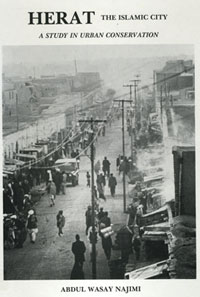 SASNET has a unique collection of books about South Asia in its root node office at Scheelevägen 15 D in Lund. The library consists of more than 140 doctoral dissertations from the middle of the 1990s (and in some cases even older) up to 2011 published in Sweden and the other Nordic countries; besides a large number of other titles. The unpretentious SASNET library encompasses a wide range of subjects, reflecting the variety of South Asia related research topics undertaken in the Nordic countries. SASNET has a unique collection of books about South Asia in its root node office at Scheelevägen 15 D in Lund. The library consists of more than 140 doctoral dissertations from the middle of the 1990s (and in some cases even older) up to 2011 published in Sweden and the other Nordic countries; besides a large number of other titles. The unpretentious SASNET library encompasses a wide range of subjects, reflecting the variety of South Asia related research topics undertaken in the Nordic countries.
We also keep a collection of mostly Sri Lanka related books donated to SASNET by the Swedish journalist Thomas Bibin. It includes books, pamphlets and articles (mostly from Sri Lankan authors) from the 1960s onwards.
Finally the library contains all the leading international peer-reviewed South Asia related journals within humanities and social sciences.
Books and journals can be borrowed from Lars Eklund, who manages the collection. SASNET also gladly accepts any new publications from recent PhDs, researchers and academics in the Nordic countries.
– Go for the catalogue of South Asia related theses in SASNET’s collection.
– Other books in the SASNET collection (pdf-file).
– The Thomas Bibin collection (pdf-file)
– Peer-reviewed journals (pdf-file)
 • SASNET has taken care of and catalogued a large books donation from the private library collection of the
renowned Swedish historian Karl Reinhold Haellquist, who passed
away in 2000 after working for many years at the Nordic Institute of Asian Studies
(NIAS) in Copenhagen. A large part of the collection, more than 6000 South Asia related
books, journals, videotapes and pamphlets on various aspects
of South Asian studies, was later donated to SASNET/Lund University by his wife, Inger Sondén-Haellquist. The collection includes Haellquist’s unique collection of books on Mahatma Gandhi. These Gandhi books, and other works from the collection, are now on display in Lund University’s Asia Library (adjacent to the SASNET root node office in Lund, open Monday-Friday 9–17, at Scheelevägen 15 C, ground floor). The remaining part of Karl Reinhold Haellquist Memorial Collection is kept at SASNET’s office. More information on the Karl Reinhold Haellquist book donation. • SASNET has taken care of and catalogued a large books donation from the private library collection of the
renowned Swedish historian Karl Reinhold Haellquist, who passed
away in 2000 after working for many years at the Nordic Institute of Asian Studies
(NIAS) in Copenhagen. A large part of the collection, more than 6000 South Asia related
books, journals, videotapes and pamphlets on various aspects
of South Asian studies, was later donated to SASNET/Lund University by his wife, Inger Sondén-Haellquist. The collection includes Haellquist’s unique collection of books on Mahatma Gandhi. These Gandhi books, and other works from the collection, are now on display in Lund University’s Asia Library (adjacent to the SASNET root node office in Lund, open Monday-Friday 9–17, at Scheelevägen 15 C, ground floor). The remaining part of Karl Reinhold Haellquist Memorial Collection is kept at SASNET’s office. More information on the Karl Reinhold Haellquist book donation.
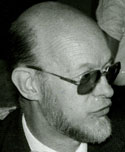 In 2007, the
Crafoord Foundation also decided to give a grant to
SASNET in order to digitalize other parts of Karl Reinhold Haellquist’s
(photo) private archive. With supplementary funding from SASNET this work was carried out during the Fall 2008 by a hired librarian, Erik Svanström. With regard to K R Haellquist’s specialised interest in Mahatma Gandhi, it was decided to concentrate the efforts to the vast material on Gandhi in Haellquist’s material.
In the new web site we meet Gandhi through Haellquist’s lecture notes. SASNET’s ambition is that it will continue to spread light on Gandhi and his ideas. GandhiServe Foundation has kindly given their permission to make digital use of the images in Haellquist's lecture notes. In 2007, the
Crafoord Foundation also decided to give a grant to
SASNET in order to digitalize other parts of Karl Reinhold Haellquist’s
(photo) private archive. With supplementary funding from SASNET this work was carried out during the Fall 2008 by a hired librarian, Erik Svanström. With regard to K R Haellquist’s specialised interest in Mahatma Gandhi, it was decided to concentrate the efforts to the vast material on Gandhi in Haellquist’s material.
In the new web site we meet Gandhi through Haellquist’s lecture notes. SASNET’s ambition is that it will continue to spread light on Gandhi and his ideas. GandhiServe Foundation has kindly given their permission to make digital use of the images in Haellquist's lecture notes.
Go for the KRHMC web site on Gandhi. 
|
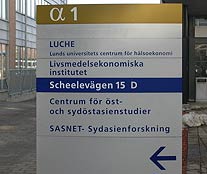
 On Tuesday 6 September 2011, SASNET will launch a completely redesigned and restructured website. The layout will be cleaner and easier to navigate. The work to restructure the extensive SASNET website (with a content of nearly 1,900 web pages) has been carried out during the past 8 months by Julia Velkova at SASNET and Bernd Wunsch at the Nordic Institute of Asian Studies (NIAS) in Copenhagen (on photo).
On Tuesday 6 September 2011, SASNET will launch a completely redesigned and restructured website. The layout will be cleaner and easier to navigate. The work to restructure the extensive SASNET website (with a content of nearly 1,900 web pages) has been carried out during the past 8 months by Julia Velkova at SASNET and Bernd Wunsch at the Nordic Institute of Asian Studies (NIAS) in Copenhagen (on photo).  The third Nordic Conference on South Asian Studies for Young Scholars was held 16–18 August 2011 at Falsterbo kursgård in Höllviken, 20 km south of Malmö. As usual, it was organised by SASNET but from this year in collaboration with the Copenhagen based Nordic Institute of Asian Studies (
The third Nordic Conference on South Asian Studies for Young Scholars was held 16–18 August 2011 at Falsterbo kursgård in Höllviken, 20 km south of Malmö. As usual, it was organised by SASNET but from this year in collaboration with the Copenhagen based Nordic Institute of Asian Studies ( The conference became a grand success, gathering graduate students and postdocs, along with other junior scholars affiliated with universities in Denmark, Finland, Norway, and Sweden, who are focusing on South Asia in their work. This year a few students from other European countries (Scotland and Germany) were also invited.
The conference became a grand success, gathering graduate students and postdocs, along with other junior scholars affiliated with universities in Denmark, Finland, Norway, and Sweden, who are focusing on South Asia in their work. This year a few students from other European countries (Scotland and Germany) were also invited. 
 On Thursday 15 September 2011, SASNET holds its first Brown bag lunch seminar during the fall semester 2011. The aim of SASNET’s Brown Bag seminars, introduced in January 2011, is to present and disseminate the eminent South Asia related research that is carried out in so many departments at Lund University. The seminars are open to the public, and during the fall 2011 they will be held once a month at Thursdays at Murbeckssalen, Gula Villan (inside the Botanical Gardens), Östra Vallgatan 14, Lund.
On Thursday 15 September 2011, SASNET holds its first Brown bag lunch seminar during the fall semester 2011. The aim of SASNET’s Brown Bag seminars, introduced in January 2011, is to present and disseminate the eminent South Asia related research that is carried out in so many departments at Lund University. The seminars are open to the public, and during the fall 2011 they will be held once a month at Thursdays at Murbeckssalen, Gula Villan (inside the Botanical Gardens), Östra Vallgatan 14, Lund.


 • Dr. Bidyut Mohanty, Head, Women’s Studies Department at the Institute of Social Sciences (ISS), New Delhi, India holds a SASNET lecture at Lund University on Monday 19 September 2011, 16.15–18.00. During the lecture, co-organised by
• Dr. Bidyut Mohanty, Head, Women’s Studies Department at the Institute of Social Sciences (ISS), New Delhi, India holds a SASNET lecture at Lund University on Monday 19 September 2011, 16.15–18.00. During the lecture, co-organised by  Bidyut Mohanty has been a Visiting Professor in the Global and International Studies program at the University of California, Santa Barbara and is the coordinator of an ISS and UNDP project on capacity building of elected women leaders in local government in India, and as well as of a project sponsored by the National Commission on the protection of child rights.
Bidyut Mohanty has been a Visiting Professor in the Global and International Studies program at the University of California, Santa Barbara and is the coordinator of an ISS and UNDP project on capacity building of elected women leaders in local government in India, and as well as of a project sponsored by the National Commission on the protection of child rights.  • Manoranjan Mohanty, Durgabai Deshmukh Professor of Social Development at the Council for Social Development in New Delhi, India holds a SASNET lecture at Lund University on Tuesday 20 September 2011, 15.15–17.00. During the seminar, co-organised by the departments of
• Manoranjan Mohanty, Durgabai Deshmukh Professor of Social Development at the Council for Social Development in New Delhi, India holds a SASNET lecture at Lund University on Tuesday 20 September 2011, 15.15–17.00. During the seminar, co-organised by the departments of  Professor
Venkatesh Athreya from the
Swaminathan Research Foundation in Chennai, India holds a SASNET lecture at Lund University on Tuesday 27 September 2011, 15.15–17.00. During the seminar, organised in collaboration with the
Professor
Venkatesh Athreya from the
Swaminathan Research Foundation in Chennai, India holds a SASNET lecture at Lund University on Tuesday 27 September 2011, 15.15–17.00. During the seminar, organised in collaboration with the 
 From 1 July 2011, Ms.
From 1 July 2011, Ms.  On 4 August 2011, Dr. Y. S. Alone, Assistant Professor at the
School of Arts and Aesthetics,
Jawaharlal Nehru University (JNU) in New Delhi, India, visited SASNET’s office at Lund University. Dr. Alone who is basically an art historian and studies Buddhism in western India, had come to Sweden to participate in the 2011 Nordic Summer University (NSU) symposium on ”Narrativity and Political Imaginaries” held at Falsterbo, south of Malmö, 31 July – 6 August 2011, and more specifically the NSU symposium’s study circle focusing on ”Psychoanalysis and Politics”. He presented an opening address entited ”Confronting Political Representation: Politics of Visuality”, focusing on the relation between Mahatma Gandhi and Dr. Ambedkar in the Indian freedom struggle.
On 4 August 2011, Dr. Y. S. Alone, Assistant Professor at the
School of Arts and Aesthetics,
Jawaharlal Nehru University (JNU) in New Delhi, India, visited SASNET’s office at Lund University. Dr. Alone who is basically an art historian and studies Buddhism in western India, had come to Sweden to participate in the 2011 Nordic Summer University (NSU) symposium on ”Narrativity and Political Imaginaries” held at Falsterbo, south of Malmö, 31 July – 6 August 2011, and more specifically the NSU symposium’s study circle focusing on ”Psychoanalysis and Politics”. He presented an opening address entited ”Confronting Political Representation: Politics of Visuality”, focusing on the relation between Mahatma Gandhi and Dr. Ambedkar in the Indian freedom struggle.  On 21 June 2011, Anna Lindberg and Lars Eklund from SASNET had a fruitful meeting in Lund with Vice Chancellor Professor K R Shevgaonkar (photo) and Dr. Prasad Kulkarni from the University of Pune, India. They have come to Sweden in order to visit two of their partner universities, namely Lund University and KTH Royal Institute of Technology in Stockholm and Lund University, both of which are involved in Indo-European Erasmus Mundus Action 2 programmes with University of Pune. Prof. Shevgaonkar recently took over as the Vice Chancellor of University of Pune. Before that he was attached to the Indian Institute of Technology (IIT) Bombay for many years.
On 21 June 2011, Anna Lindberg and Lars Eklund from SASNET had a fruitful meeting in Lund with Vice Chancellor Professor K R Shevgaonkar (photo) and Dr. Prasad Kulkarni from the University of Pune, India. They have come to Sweden in order to visit two of their partner universities, namely Lund University and KTH Royal Institute of Technology in Stockholm and Lund University, both of which are involved in Indo-European Erasmus Mundus Action 2 programmes with University of Pune. Prof. Shevgaonkar recently took over as the Vice Chancellor of University of Pune. Before that he was attached to the Indian Institute of Technology (IIT) Bombay for many years. On 15 June 2011, SASNET’s deputy director Lars Eklund visited the
On 15 June 2011, SASNET’s deputy director Lars Eklund visited the  A separate meeting was held with Professor Vinod Diwan and Professor Emeritus Bo Lindblad (photo), discussing IHCAR’s long-standing collaboration with universities in India and Pakistan, the large number of sandwich PhDs attained in recent years, and the impressing number of large EU grants for research projects, partly focusing on South Asia, that IHCAR
administers.
A separate meeting was held with Professor Vinod Diwan and Professor Emeritus Bo Lindblad (photo), discussing IHCAR’s long-standing collaboration with universities in India and Pakistan, the large number of sandwich PhDs attained in recent years, and the impressing number of large EU grants for research projects, partly focusing on South Asia, that IHCAR
administers.  After attending the Go:India kickoff conference at Gothenburg University (
After attending the Go:India kickoff conference at Gothenburg University ( Associate Professor Sudipta De from the
Associate Professor Sudipta De from the  On Tuesday 7 June 2011, SASNET’s deputy director Lars Eklund and assistant webmaster Julia Velkova visited University of Gothenburg, to attend the first day of the kick-of conference for its Go:India project, launched in November 2010. This is a three year project (2011 – 2013), intended to build a platform for co-operation within the areas of research, teaching and education between researchers at University of Gothenburg’s Faculties of Arts; Fine, Applied and Performing Arts; Sahlgrenska Academy; and the Faculty of Social Sciences, and their collaboration partner institutions in India.
On Tuesday 7 June 2011, SASNET’s deputy director Lars Eklund and assistant webmaster Julia Velkova visited University of Gothenburg, to attend the first day of the kick-of conference for its Go:India project, launched in November 2010. This is a three year project (2011 – 2013), intended to build a platform for co-operation within the areas of research, teaching and education between researchers at University of Gothenburg’s Faculties of Arts; Fine, Applied and Performing Arts; Sahlgrenska Academy; and the Faculty of Social Sciences, and their collaboration partner institutions in India.  Lars and Julia interacted with the Gothenburg researchers and project coordinators, but also with the representatives from Banaras Hindu University (BHU) in Varanasi; Sarai/Centre for the Study of Developing Societies (CSDS) in Delhi; Gandhian Institute of Studies in Varanasi; Jadavpur University in Kolkata; Punjabi University in Patiala; Visva-Bharati University in Shantiniketan; Tata Institute of Social Sciences (TISS) in Mumbai; Srishti School of Art, Design and Technology in Bangalore; and Union Biblical Seminary in Pune.
Lars and Julia interacted with the Gothenburg researchers and project coordinators, but also with the representatives from Banaras Hindu University (BHU) in Varanasi; Sarai/Centre for the Study of Developing Societies (CSDS) in Delhi; Gandhian Institute of Studies in Varanasi; Jadavpur University in Kolkata; Punjabi University in Patiala; Visva-Bharati University in Shantiniketan; Tata Institute of Social Sciences (TISS) in Mumbai; Srishti School of Art, Design and Technology in Bangalore; and Union Biblical Seminary in Pune.  On Monday 16 May 2011, SASNET’s deputy director, Lars Eklund visited Skövde University to attend a seminar meeting organised by Professor Abul Mandal,
On Monday 16 May 2011, SASNET’s deputy director, Lars Eklund visited Skövde University to attend a seminar meeting organised by Professor Abul Mandal,
 A meeting was organised to present University of Gothenburg’s new collaboration project with three partner universities in Nepal – Kathmandu University, Tribhuvan University, and Patan Academy of Health Sciences.
The interdisciplinary project, headed by Dr. Krettek (photo), involves researchers from several departments and is entitled ”Collaboration between GU and Nepali Institutions: Strengthening Health Education, Supporting Research, Monitoring Health”. It is based on previous Linnaeus Palme exchange programme experiences with Tribhuvan University, but seeks to include additional Nepali institutions and programmes for both education and research. It is one out of a number of new international projects initiated by University of Gothenburg as part of a long-term ambition to create a profile as ‘The Global University’.
A meeting was organised to present University of Gothenburg’s new collaboration project with three partner universities in Nepal – Kathmandu University, Tribhuvan University, and Patan Academy of Health Sciences.
The interdisciplinary project, headed by Dr. Krettek (photo), involves researchers from several departments and is entitled ”Collaboration between GU and Nepali Institutions: Strengthening Health Education, Supporting Research, Monitoring Health”. It is based on previous Linnaeus Palme exchange programme experiences with Tribhuvan University, but seeks to include additional Nepali institutions and programmes for both education and research. It is one out of a number of new international projects initiated by University of Gothenburg as part of a long-term ambition to create a profile as ‘The Global University’.  Partha N. Mukherjee, Professor Emeritus, Institute of Social Sciences, New Delhi, came to Lund University in the first week of May 2011, to be a member of an international team to evaluate the university. The week-long evaluation was part of the EQ 11 project initiated at Lund University in 2009 in order to improve education quality.
Partha N. Mukherjee, Professor Emeritus, Institute of Social Sciences, New Delhi, came to Lund University in the first week of May 2011, to be a member of an international team to evaluate the university. The week-long evaluation was part of the EQ 11 project initiated at Lund University in 2009 in order to improve education quality.
 Professor Mizanur Rahman from the Dept. of Accounting & Information Systems, Dhaka University, Bangladesh (and also the Treasurer of Dhaka University), held a SASNET lecture at Lund University on Thursday 26 May 2011. He spoke about ”Social Marketing: Lessons from Bangladesh”. The seminar was organized in collaboration with the
Professor Mizanur Rahman from the Dept. of Accounting & Information Systems, Dhaka University, Bangladesh (and also the Treasurer of Dhaka University), held a SASNET lecture at Lund University on Thursday 26 May 2011. He spoke about ”Social Marketing: Lessons from Bangladesh”. The seminar was organized in collaboration with the  SASNET’s deputy director Lars Eklund participated in the 150 years birth anniversary celebration of Indian/Bengali poet Rabindranath Tagore that was held in Uppsala on Sunday 8 May 2011.
SASNET’s deputy director Lars Eklund participated in the 150 years birth anniversary celebration of Indian/Bengali poet Rabindranath Tagore that was held in Uppsala on Sunday 8 May 2011. 


 The events gathered an audience of more than 100 people, in the Pictura hall, inside the main Lund University Building for the dat session, and then in The Old Bishop’s Palace.
The events gathered an audience of more than 100 people, in the Pictura hall, inside the main Lund University Building for the dat session, and then in The Old Bishop’s Palace. The reception at the Old Bishop’s Palace was hosted by the Embassy of India in Sweden.
A mixed crowd consisting both by Lund University academicians and students, and members of the Indian/South Asian community in Malmö/Lund, enjoyed a marvellous performance by Anette Pooja (photo to the right), eminent classical Odissi dancer from Gothenburg.
The reception at the Old Bishop’s Palace was hosted by the Embassy of India in Sweden.
A mixed crowd consisting both by Lund University academicians and students, and members of the Indian/South Asian community in Malmö/Lund, enjoyed a marvellous performance by Anette Pooja (photo to the right), eminent classical Odissi dancer from Gothenburg.  A high-level multi-disciplinary delegation from Lund University, led by Pro Vice-Chancellor Dr Eva Åkesson visited India on 21-25 March 2011. The reasons for the visit, partially planned for by the Swedish Embassy in New Delhi, are the already substantial collaborations with India and expectations of further increased cooperation in the coming years. The delegation consisted of deans and outstanding scientists, representing several of Lund University's faculties. SASNET’s Director, Dr. Anna Lindberg was part of the delegation.
A high-level multi-disciplinary delegation from Lund University, led by Pro Vice-Chancellor Dr Eva Åkesson visited India on 21-25 March 2011. The reasons for the visit, partially planned for by the Swedish Embassy in New Delhi, are the already substantial collaborations with India and expectations of further increased cooperation in the coming years. The delegation consisted of deans and outstanding scientists, representing several of Lund University's faculties. SASNET’s Director, Dr. Anna Lindberg was part of the delegation. 
 Professor Lipi Ghosh from the
Professor Lipi Ghosh from the 

 Associate Professor Maria Lantz from the Dept. of Art & Architecture at Royal Institute of Art (KKH), Stockholm, held a SASNET/Lund University seminar on Thursday 31 March 2011, 09.15–12.00. Her lecture was entitled ”Informal Cities” and was based on a 2008 book about the Dharavi slums in Mumbai, India, produced by Dr. Lantz and colleagues at KKH in collaboration with local organisations. The name of the book was ”Dharavi: Documenting Informalities” (
Associate Professor Maria Lantz from the Dept. of Art & Architecture at Royal Institute of Art (KKH), Stockholm, held a SASNET/Lund University seminar on Thursday 31 March 2011, 09.15–12.00. Her lecture was entitled ”Informal Cities” and was based on a 2008 book about the Dharavi slums in Mumbai, India, produced by Dr. Lantz and colleagues at KKH in collaboration with local organisations. The name of the book was ”Dharavi: Documenting Informalities” ( On the 27 January 2011, SASNET's acting webmaster/ deputy director, Julia Velkova, attended a reception organised by the Embassy of India in Stockholm on the occasion of the 62nd Republic Day of India. The reception was inaugurated with an Indian dance performance. It was followed by a speech by H.E. Mr. Ashok Sajjanhar, Ambassador of India in Sweden (photo, right). After him, the word was taken by Mr. Frank Belfrage, secretary of the state of Sweden (photo, left) who emphasized the active collaboration and positive relations between the two countries. The reception was accompanied by an exhibition of paintings by prominent Indian artists.
On the 27 January 2011, SASNET's acting webmaster/ deputy director, Julia Velkova, attended a reception organised by the Embassy of India in Stockholm on the occasion of the 62nd Republic Day of India. The reception was inaugurated with an Indian dance performance. It was followed by a speech by H.E. Mr. Ashok Sajjanhar, Ambassador of India in Sweden (photo, right). After him, the word was taken by Mr. Frank Belfrage, secretary of the state of Sweden (photo, left) who emphasized the active collaboration and positive relations between the two countries. The reception was accompanied by an exhibition of paintings by prominent Indian artists. 
 • Prof Swaran Singh from the Center for International Politics, Organisation and Disarmament, School of International Studies, Jawaharlal Nehru University (JNU) in Delhi, gave a SASNET lecture at Lund University on Friday 17 December 2010, 10.15-12.00. The seminar was co-organised by the university’s
• Prof Swaran Singh from the Center for International Politics, Organisation and Disarmament, School of International Studies, Jawaharlal Nehru University (JNU) in Delhi, gave a SASNET lecture at Lund University on Friday 17 December 2010, 10.15-12.00. The seminar was co-organised by the university’s  SASNET was partly involved when two Indian researchers cum film makers from the
SASNET was partly involved when two Indian researchers cum film makers from the  Dr. Heinz Werner Wessler,
Guest Professor at the
Dr. Heinz Werner Wessler,
Guest Professor at the 



 The Indian Council for Cultural Relations is actively working to set up more visiting professorships and chairs in Indian studies in foreign universities. Currently there are about 60 visiting ICCR professorships worldwide, but within a few years the ambition is that there should be 30 more such chairs around the world. In the Nordic countries ICCR professorships exist at Lund University and Copenhagen Business School.
The Indian Council for Cultural Relations is actively working to set up more visiting professorships and chairs in Indian studies in foreign universities. Currently there are about 60 visiting ICCR professorships worldwide, but within a few years the ambition is that there should be 30 more such chairs around the world. In the Nordic countries ICCR professorships exist at Lund University and Copenhagen Business School.  On Monday 8 November 2010, Dr. Sujit Kumar Paul, Senior Lecturer and Vice Principal for the Institute of Rural Reconstruction at Visva-Bharati University in Sriniketan, West Bengal, India, visited SASNET/Lund University. He met with SASNET’s deputy director Lars Eklund (seen on photo together), and also Dr. Olle Frödin from the
On Monday 8 November 2010, Dr. Sujit Kumar Paul, Senior Lecturer and Vice Principal for the Institute of Rural Reconstruction at Visva-Bharati University in Sriniketan, West Bengal, India, visited SASNET/Lund University. He met with SASNET’s deputy director Lars Eklund (seen on photo together), and also Dr. Olle Frödin from the  On Monday 1 November 2010, SASNET’s deputy director Lars Eklund participated in a half-day seminar at Stockholm University on Mahatma Gandhi, organised by the Embassy of India in Sweden. The seminar, entitled ”Is the Mahatma still relevant?”, was hosted by Prof. Vinayagum Chinapah and the
On Monday 1 November 2010, SASNET’s deputy director Lars Eklund participated in a half-day seminar at Stockholm University on Mahatma Gandhi, organised by the Embassy of India in Sweden. The seminar, entitled ”Is the Mahatma still relevant?”, was hosted by Prof. Vinayagum Chinapah and the  A SASNET seminar on ”Emancipation or Dependency: Microcredits in South Asia” was held in Lund on Wednesday 20 October 2010. The seminar was co-organised by The Association of Foreign Affairs at Lund University (
A SASNET seminar on ”Emancipation or Dependency: Microcredits in South Asia” was held in Lund on Wednesday 20 October 2010. The seminar was co-organised by The Association of Foreign Affairs at Lund University ( SASNET’s director, Dr. Anna Lindberg, held an informal public lecture at Lund University on Tuesday 2 November 2010, 15.15-17.00. She talked about ”Gender, Dowry, and the Marriage of Children in South India”. The seminar was organized by the University’s Global Gender Matters Network, hosted by the
SASNET’s director, Dr. Anna Lindberg, held an informal public lecture at Lund University on Tuesday 2 November 2010, 15.15-17.00. She talked about ”Gender, Dowry, and the Marriage of Children in South India”. The seminar was organized by the University’s Global Gender Matters Network, hosted by the 
 • On Monday 11 October 2010, the new Indian Ambassador to Sweden, H.E. Mr. Ashok Sajjanhar made a first visit to Lund University. The programme was planned for by SASNET, and included a lunch meeting with Ingalill Rahm Hallberg, Lund University Assistant Vice Chancellor (and Professor in Health Care Science);
Ann-Katrin Bäcklund, Dean for the Faculty of Social Sciences; and Gunilla Carlecrantz, Acting Head, Division of International Relations. Representatives of Division of International Relations informed te Ambassador about the Erasmus Mundus Action 2 mobility programmes that Lund university currently coordinates with Indian partner universities (
• On Monday 11 October 2010, the new Indian Ambassador to Sweden, H.E. Mr. Ashok Sajjanhar made a first visit to Lund University. The programme was planned for by SASNET, and included a lunch meeting with Ingalill Rahm Hallberg, Lund University Assistant Vice Chancellor (and Professor in Health Care Science);
Ann-Katrin Bäcklund, Dean for the Faculty of Social Sciences; and Gunilla Carlecrantz, Acting Head, Division of International Relations. Representatives of Division of International Relations informed te Ambassador about the Erasmus Mundus Action 2 mobility programmes that Lund university currently coordinates with Indian partner universities ( The Ambassador of Sri Lanka to Sweden, H.E. Mr. R.P. Jayasooriya also visited Lund University on Monday 11 October 2010. SASNET was involved in organising a meeting for the Ambassador, who came with a mission from the University Grants Commission of Sri Lanka to inform about the Srilankan government’s keen interest to promote strenghtened academic collaboration between universities in Sri Lanka and Sweden, and not the least with Lund University. A recent changed legislation that also opens up Sri Lanka for private university initiatives facilitates such efforts, according to Mr. Jayasooriya.
The Ambassador of Sri Lanka to Sweden, H.E. Mr. R.P. Jayasooriya also visited Lund University on Monday 11 October 2010. SASNET was involved in organising a meeting for the Ambassador, who came with a mission from the University Grants Commission of Sri Lanka to inform about the Srilankan government’s keen interest to promote strenghtened academic collaboration between universities in Sri Lanka and Sweden, and not the least with Lund University. A recent changed legislation that also opens up Sri Lanka for private university initiatives facilitates such efforts, according to Mr. Jayasooriya.  SASNET has been closely involved in the planning for a new Asia Regional Erasmus Mundus Action 2 mobility programme that was decided upon by the European Commission in July 2010 (
SASNET has been closely involved in the planning for a new Asia Regional Erasmus Mundus Action 2 mobility programme that was decided upon by the European Commission in July 2010 ( The project has been named EMEA – Erasmus Mundus Europe Asia – and will be open for applications from November 1, 2010 and remain open until December 15.
The project coordinators are Ms.
The project has been named EMEA – Erasmus Mundus Europe Asia – and will be open for applications from November 1, 2010 and remain open until December 15.
The project coordinators are Ms.  Professor Shahana Urooj Kazmi,
Pro-Vice Chancellor at the University of Karachi, Pakistan gave an engaged presentation entitled ”Devastating Floods in Pakistan:
A story of Pain, Grief and
Suffering – Can We Help?” at Lund University on Wednesday 22 September 2010. Prof. Kazmi, on a short visit to Lund to participate in the consortium meeting of the Erasmus Mundus Asia Regional mobility programme, mentioned above, gave an overview regarding the flood relief activities carried out
by teachers and students at her university in the Northern part of Sindh province, through the Karachi University
Disaster Management Volunteer Corps, a work carried out under the patronage of Chancellor Dr. Ishrat-ul Ibaad,
Vice Chancellor Dr. Przada Qasim R. Siddiqui and Pro VC Dr. Shahana Urooj Kazmi. She was introduced by SASNET’s deputy director, Lars Eklund.
Professor Shahana Urooj Kazmi,
Pro-Vice Chancellor at the University of Karachi, Pakistan gave an engaged presentation entitled ”Devastating Floods in Pakistan:
A story of Pain, Grief and
Suffering – Can We Help?” at Lund University on Wednesday 22 September 2010. Prof. Kazmi, on a short visit to Lund to participate in the consortium meeting of the Erasmus Mundus Asia Regional mobility programme, mentioned above, gave an overview regarding the flood relief activities carried out
by teachers and students at her university in the Northern part of Sindh province, through the Karachi University
Disaster Management Volunteer Corps, a work carried out under the patronage of Chancellor Dr. Ishrat-ul Ibaad,
Vice Chancellor Dr. Przada Qasim R. Siddiqui and Pro VC Dr. Shahana Urooj Kazmi. She was introduced by SASNET’s deputy director, Lars Eklund. Associate Professor Jagannath Prasad Panda from the Institute for Defense
Studies and Analysis (ISDA) in New Delhi, India,
held a SASNET lecture on ”The Pattern of Sino-Indian Relations:
Evaluating the Strategic Discourse” at Lund University on
Wednesday 29 September 2010. The seminar was organised in collaboration with Associate Professor Catarina Kinnvall at the
Associate Professor Jagannath Prasad Panda from the Institute for Defense
Studies and Analysis (ISDA) in New Delhi, India,
held a SASNET lecture on ”The Pattern of Sino-Indian Relations:
Evaluating the Strategic Discourse” at Lund University on
Wednesday 29 September 2010. The seminar was organised in collaboration with Associate Professor Catarina Kinnvall at the 
 The 21st European Conference on (Modern) South Asian Studies, ECMSAS, was successfully organised by the University of Bonn on 26–29 July 2010. More then 300 scholars involved in research related
to the South Asian region participated in
the conference, featuring a total number of 41 panels,
covering a broad range of research subjects. SASNET’s deputy director Lars Eklund participated in the conference. He has posted on SASNET’s web site a personal report full with photos.
The 21st European Conference on (Modern) South Asian Studies, ECMSAS, was successfully organised by the University of Bonn on 26–29 July 2010. More then 300 scholars involved in research related
to the South Asian region participated in
the conference, featuring a total number of 41 panels,
covering a broad range of research subjects. SASNET’s deputy director Lars Eklund participated in the conference. He has posted on SASNET’s web site a personal report full with photos. 
 On Tuesday 8 June 2010, SASNET’s director Anna Lindberg and deputy director Lars Eklund participated in the farewell party for the outgoing Ambassador of India to Sweden and Latvia, Mr. Balkrishna Shetty. The reception was held at the Embassy of India in Stockholm (photo from the event). Mr. Shetty, with whom SASNET has had much positive interaction during the past two years, now retires from diplomatic service and returns to Delhi.
On Tuesday 8 June 2010, SASNET’s director Anna Lindberg and deputy director Lars Eklund participated in the farewell party for the outgoing Ambassador of India to Sweden and Latvia, Mr. Balkrishna Shetty. The reception was held at the Embassy of India in Stockholm (photo from the event). Mr. Shetty, with whom SASNET has had much positive interaction during the past two years, now retires from diplomatic service and returns to Delhi.  On Wednesday 2 June 2010, PhD candidate Naonori Kusakabe from the
On Wednesday 2 June 2010, PhD candidate Naonori Kusakabe from the 
 • A successful seminar on Arsenic in Drinking Water was held at Lund University on Wednesday 5 May 2010. The well-attended seminar drew a mixed audience of researchers, students and other interested people. The seminar was organized by SASNET in collaboration with Lund University Centre for Sustainability Studies (
• A successful seminar on Arsenic in Drinking Water was held at Lund University on Wednesday 5 May 2010. The well-attended seminar drew a mixed audience of researchers, students and other interested people. The seminar was organized by SASNET in collaboration with Lund University Centre for Sustainability Studies ( SASNET again co-organised a similar seminar on Toxic Metal Pollution in Stockholm on the World Environmental Day 2010, that is Monday 7 June 2010. The seminar, entitled ”Environmental and Ecological Risks of Toxic Metal Polution from Natural and Anthropogenic Sources. Problems, Challenges and Remedies”, was held at the Royal Institute of Technology (KTH) and was organised in collaboration with the KTH-International Groundwater Arsenic Research Group (based at the
SASNET again co-organised a similar seminar on Toxic Metal Pollution in Stockholm on the World Environmental Day 2010, that is Monday 7 June 2010. The seminar, entitled ”Environmental and Ecological Risks of Toxic Metal Polution from Natural and Anthropogenic Sources. Problems, Challenges and Remedies”, was held at the Royal Institute of Technology (KTH) and was organised in collaboration with the KTH-International Groundwater Arsenic Research Group (based at the  In early November 2010, SASNET had planned to organise a one and a half day conference at Lund University, on the constitution-making process in Nepal. The conference would be jointly organised by SASNET and the Institute for Security& Development Policy (
In early November 2010, SASNET had planned to organise a one and a half day conference at Lund University, on the constitution-making process in Nepal. The conference would be jointly organised by SASNET and the Institute for Security& Development Policy ( Professor Sudipta Bhattacharya from the Dept. of Economics and Politics, Visva-Bharati University, Santiniketan, India, and currently Visiting Professor at the Asia Research Centre, Copenhagen Business School (CBS), held a SASNET lecture on ”Neo-liberalism, Weaking State and
Peasant Differentiation in Indian Agriculture” at Lund University on Wednesday 26 May 2010. The seminar was organized in collaboration with the
Professor Sudipta Bhattacharya from the Dept. of Economics and Politics, Visva-Bharati University, Santiniketan, India, and currently Visiting Professor at the Asia Research Centre, Copenhagen Business School (CBS), held a SASNET lecture on ”Neo-liberalism, Weaking State and
Peasant Differentiation in Indian Agriculture” at Lund University on Wednesday 26 May 2010. The seminar was organized in collaboration with the  Prof. Nasreen had come to Sweden on invitation by The Global School Sweden (
Prof. Nasreen had come to Sweden on invitation by The Global School Sweden ( Accompanied by Mr. Bo Kramsjö, representative for Globala Skolan, she visited Lund University’s
Accompanied by Mr. Bo Kramsjö, representative for Globala Skolan, she visited Lund University’s  • Muhammad Azam Khan Swati,
federal minister of Science and Technology from Pakistan, participated in a seminar on ”The Role of Overseas Pakistani
Students in Nation Building” at Lund University on
Saturday 22 May 2010. As a minister, Mr. Khan Swati has among other things played a pivotal role in establishing the
• Muhammad Azam Khan Swati,
federal minister of Science and Technology from Pakistan, participated in a seminar on ”The Role of Overseas Pakistani
Students in Nation Building” at Lund University on
Saturday 22 May 2010. As a minister, Mr. Khan Swati has among other things played a pivotal role in establishing the 


 The seminar was co-organised by the Sweden India Business Council (
The seminar was co-organised by the Sweden India Business Council ( After the seminar, Lund University Vice Chancellor Prof. Per Eriksson invited the Indian Ambassador, the First Secretary Mrs. Madhumita Bhagat and Prof. D’Costa for an official lunch at the Old Bishop’s House.
After the seminar, Lund University Vice Chancellor Prof. Per Eriksson invited the Indian Ambassador, the First Secretary Mrs. Madhumita Bhagat and Prof. D’Costa for an official lunch at the Old Bishop’s House. 
 Prof. Yogendra Yadav, Senior Fellow at the Centre for the Study of Developing Societies, Delhi, India, held a SASNET lecture on ”Democracy and Poverty in India”, on Thursday 18 March 2010. The well-attended seminar was organised in collaboration with the Centre for East and South-East Asian Studies (
Prof. Yogendra Yadav, Senior Fellow at the Centre for the Study of Developing Societies, Delhi, India, held a SASNET lecture on ”Democracy and Poverty in India”, on Thursday 18 March 2010. The well-attended seminar was organised in collaboration with the Centre for East and South-East Asian Studies (


 In February 2010, SASNET’s Director Anna Lindberg made a short tour to Kerala. She visited the Centre for Research and Education for Social Transformation (CREST) in Kozhikode, the Centre for Bioinformatics at Kerala University, the Centre for Women’s Studies, also at Kerala University, and the Centre for Development Studies in Thiruvananthapuram. She also met Kerala’s finance minister Thomas Isaac in order to discuss the development in Kerala over the past ten years.
In February 2010, SASNET’s Director Anna Lindberg made a short tour to Kerala. She visited the Centre for Research and Education for Social Transformation (CREST) in Kozhikode, the Centre for Bioinformatics at Kerala University, the Centre for Women’s Studies, also at Kerala University, and the Centre for Development Studies in Thiruvananthapuram. She also met Kerala’s finance minister Thomas Isaac in order to discuss the development in Kerala over the past ten years. 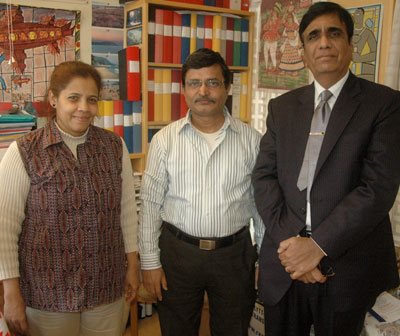

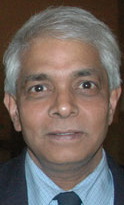
 However, Lund University has finally promised to continue their underwriting,
which till now has comprised about one-third of our budget, and we are in the process of negotiating with the University for additional funds. Their support will make it possible for us to keep our doors through 2010. Furthermore, Lund University has expressed its firm commitment to maintain SASNET’s extensive web site, its databases and its newsletters, whatever other changes in directions that may come.
However, Lund University has finally promised to continue their underwriting,
which till now has comprised about one-third of our budget, and we are in the process of negotiating with the University for additional funds. Their support will make it possible for us to keep our doors through 2010. Furthermore, Lund University has expressed its firm commitment to maintain SASNET’s extensive web site, its databases and its newsletters, whatever other changes in directions that may come.  On Saturday 19 December 2009, Her Excellency Sheikh Hasina,
Prime Minister of Bangladesh, visited
Lund University to hold a public lecture on ”Climate Change in
Bangladesh – Facing the Challenges”. Sheikh Hasina was invited to visit Lund by SASNET and the
Association of Foreign Affairs at Lund University (UPF), and was hosted by Lund University Vice Chancellor Per Eriksson. A large delegation of ministers and around 20 members of the Bangladeshi parliament (who have attended the COP 15 climate conference in Copenhagen) accompanied the Prime Minister from Copenhagen during this high-security visit to Lund. The interest from Lund University students and researchers, as well as from the local Bangladeshi community was overwhelming. The lecture hall was crowded, and the event was documented by a couple of Bangladeshi TV company crews.
On Saturday 19 December 2009, Her Excellency Sheikh Hasina,
Prime Minister of Bangladesh, visited
Lund University to hold a public lecture on ”Climate Change in
Bangladesh – Facing the Challenges”. Sheikh Hasina was invited to visit Lund by SASNET and the
Association of Foreign Affairs at Lund University (UPF), and was hosted by Lund University Vice Chancellor Per Eriksson. A large delegation of ministers and around 20 members of the Bangladeshi parliament (who have attended the COP 15 climate conference in Copenhagen) accompanied the Prime Minister from Copenhagen during this high-security visit to Lund. The interest from Lund University students and researchers, as well as from the local Bangladeshi community was overwhelming. The lecture hall was crowded, and the event was documented by a couple of Bangladeshi TV company crews. 

 Kumudu Wijewardena and Mohsin Saeed Khan, two members of
Kumudu Wijewardena and Mohsin Saeed Khan, two members of  On Thursday 22 October 2009, SASNET invited Lund University Masters students, Ph.D. candidates and senior researchers interested in studies and research related to South Asia (India, Pakistan, Bangladesh, Afghanistan, Sri Lanka, Nepal, Bhutan, and Maldives) to an open meeting. Nearly 50 people turned up for the meeting that was intended to increase the interest in pursuing South Asia related education and research at Lund University. Eminent researchers involved in South Asia related projects, including Prof. Baboo Nair,
On Thursday 22 October 2009, SASNET invited Lund University Masters students, Ph.D. candidates and senior researchers interested in studies and research related to South Asia (India, Pakistan, Bangladesh, Afghanistan, Sri Lanka, Nepal, Bhutan, and Maldives) to an open meeting. Nearly 50 people turned up for the meeting that was intended to increase the interest in pursuing South Asia related education and research at Lund University. Eminent researchers involved in South Asia related projects, including Prof. Baboo Nair,  SASNET’s deputy director Lars Eklund has written an article about the achievements that SASNET has been able to contribute with during its nine years of existence, in the 2009 edition of the glossy magazine India-Sweden in Focus, published in mid-August. This magazine has been produced by Krest Publications in New Delhi, India, on behalf of the Embassy of India in Sweden. Besides Lars’ article entitled ”SASNET builds up Indo-Swedish collaborations”, the magazine also features articles on other important Indo-Swedish collaboration initiatives in business, research and culture. Robin Sukhia writes about the Sweden India Business Council (SIBC); Göran Baurne writes about INSTEC – the Indo-Swedish Network for Cooperation on Technical Research and Education; and Anita Nair writes about the Indo-Swedish translation project Indiska Biblioteket (Indian Library).
SASNET’s deputy director Lars Eklund has written an article about the achievements that SASNET has been able to contribute with during its nine years of existence, in the 2009 edition of the glossy magazine India-Sweden in Focus, published in mid-August. This magazine has been produced by Krest Publications in New Delhi, India, on behalf of the Embassy of India in Sweden. Besides Lars’ article entitled ”SASNET builds up Indo-Swedish collaborations”, the magazine also features articles on other important Indo-Swedish collaboration initiatives in business, research and culture. Robin Sukhia writes about the Sweden India Business Council (SIBC); Göran Baurne writes about INSTEC – the Indo-Swedish Network for Cooperation on Technical Research and Education; and Anita Nair writes about the Indo-Swedish translation project Indiska Biblioteket (Indian Library).  The Mahatma Gandhi Book Collection (part of the Karl Reinhold Haellquist Memorial Collection) was formally inaugurated by the Indian Ambassador to Sweden, Mr. Balkrishna Shetty, on Thursday 10 September 2009. On behalf of the Indian government, the Ambassador also took the opportunity to donate to Lund University and SASNET another 120 volumes of Mahatma Gandhi literature, either works written by Gandhi himself or books focusing on him.
The Mahatma Gandhi Book Collection (part of the Karl Reinhold Haellquist Memorial Collection) was formally inaugurated by the Indian Ambassador to Sweden, Mr. Balkrishna Shetty, on Thursday 10 September 2009. On behalf of the Indian government, the Ambassador also took the opportunity to donate to Lund University and SASNET another 120 volumes of Mahatma Gandhi literature, either works written by Gandhi himself or books focusing on him.  Ms. Inger Sondén Haellquist (photo) was the guest of honour since she is the person who in 2004 donated the extensive private book collection of her late husband, Karl Reinhold Haellquist, to Lund University. This collection, consisting of nearly 7 000 volumes of South Asia related literature, was selected by Lund University researchers Neelambar Hatti and Jan Magnusson, and has since been catalogued by SASNET. A small part of the collection, primarily the Mahatma Gandhi collection, is exhibited in the Asia Library.
Ms. Inger Sondén Haellquist (photo) was the guest of honour since she is the person who in 2004 donated the extensive private book collection of her late husband, Karl Reinhold Haellquist, to Lund University. This collection, consisting of nearly 7 000 volumes of South Asia related literature, was selected by Lund University researchers Neelambar Hatti and Jan Magnusson, and has since been catalogued by SASNET. A small part of the collection, primarily the Mahatma Gandhi collection, is exhibited in the Asia Library. 

 The Ambassador, Mr. Balkrishna Shetty, was the first speaker, and he gave a personal narrative on Mahatma Gandhi’s life, the important role he has played in history, and the basic values that he stands for, values that should still play an important role.
The Ambassador, Mr. Balkrishna Shetty, was the first speaker, and he gave a personal narrative on Mahatma Gandhi’s life, the important role he has played in history, and the basic values that he stands for, values that should still play an important role.  • A joint SASNET/UPF (Association of Foreign Affairs at Lund University) seminar on ”Political Transitions affecting the Peace Process in Nepal” was held in Lund on Wednesday 23 September 2009, 19.30–21.00. Anjoo Sharan Upadhyaya, Professor of Political Science and Director, Centre for the Study of Nepal at Banaras Hindu University (BHU) in Varanasi, India, participated in the seminar along with Mr. Vijaykant Lal Karna, Nepalese ambassador to Scandinavia (based in Denmark) who is also a political scientist by profession, having worked at Tribhuvan University for 20 years.
• A joint SASNET/UPF (Association of Foreign Affairs at Lund University) seminar on ”Political Transitions affecting the Peace Process in Nepal” was held in Lund on Wednesday 23 September 2009, 19.30–21.00. Anjoo Sharan Upadhyaya, Professor of Political Science and Director, Centre for the Study of Nepal at Banaras Hindu University (BHU) in Varanasi, India, participated in the seminar along with Mr. Vijaykant Lal Karna, Nepalese ambassador to Scandinavia (based in Denmark) who is also a political scientist by profession, having worked at Tribhuvan University for 20 years. In her 35 years of teaching career at Banaras Hindu University, Prof. Anjoo Sharan Upadhyayay (photo) has been the Dean, Faculty of Social Sciences; and served twice as the Head, Department of Political Science and also as the Director of Center for Rural Development. Outside of India, she has worked for example as Research Director at UNU/Ulster University INCORE (Institute of Conflict Resolution and Ethnicity), UK; as Fellow at London School of Economics & Politics (LSE), and as Scholar-in Residence at the Woodrow Wilson Centre for International Scholars, Washington DC, USA. Professor Upadhyaya has published extensively both nationally and internationally on themes related to issues of self-determination, ethnicity, conflict, federalism, gender, development and peace. She has undertaken post-doctoral studies at LSE, Department of Peace and Conflict Research, Uppsala University, Sweden, and Brown University, USA. Currently she is engaged in a collaboration project with Karlstad University.
In her 35 years of teaching career at Banaras Hindu University, Prof. Anjoo Sharan Upadhyayay (photo) has been the Dean, Faculty of Social Sciences; and served twice as the Head, Department of Political Science and also as the Director of Center for Rural Development. Outside of India, she has worked for example as Research Director at UNU/Ulster University INCORE (Institute of Conflict Resolution and Ethnicity), UK; as Fellow at London School of Economics & Politics (LSE), and as Scholar-in Residence at the Woodrow Wilson Centre for International Scholars, Washington DC, USA. Professor Upadhyaya has published extensively both nationally and internationally on themes related to issues of self-determination, ethnicity, conflict, federalism, gender, development and peace. She has undertaken post-doctoral studies at LSE, Department of Peace and Conflict Research, Uppsala University, Sweden, and Brown University, USA. Currently she is engaged in a collaboration project with Karlstad University.  • Professor Priyankar Upadhyaya from Benaras Hindu University (BHU), Varanasi, India, held a lecture at Lund University on ”Religious Peace Building in India” on Thursday 24 September, 10.15–12.00. The seminar was jointly organised by the
• Professor Priyankar Upadhyaya from Benaras Hindu University (BHU), Varanasi, India, held a lecture at Lund University on ”Religious Peace Building in India” on Thursday 24 September, 10.15–12.00. The seminar was jointly organised by the  • The joint SASNET/UPF (Association of Foreign Affairs at Lund University) seminar on ”Contemporary Pakistan: Islamism, Human Rights and Terrorism”, held in Lund on Wednesday 16 September 2009, drew an audience of more than 100 people. The speakers were Prof. Ishtiaq Ahmed, working as Visiting Research Professor at the
• The joint SASNET/UPF (Association of Foreign Affairs at Lund University) seminar on ”Contemporary Pakistan: Islamism, Human Rights and Terrorism”, held in Lund on Wednesday 16 September 2009, drew an audience of more than 100 people. The speakers were Prof. Ishtiaq Ahmed, working as Visiting Research Professor at the  Prof. Ahmed
Prof. Ahmed  Dr. Ruby Sain from the Dept. of Sociology, Jadavpur University, India, held an open lecture at Lund University on Wednesday 16 September 2009. The seminar was jointly organised by the School of Social Work at Lund university,
Vårdalinstitutet and SASNET. Dr. Sain, who mostly works on health, illness, ageing, religion and research methodology issues, talked about “Depression – a social problem of the elderly
population in India”. She is the founding editor of the Jadavpur University Journal of Sociology, and her forthcoming books are titled ”Contemporary Social Problems in India-Vol I” (ed.) and ”Folk Religion in Bengal”. Besides, Dr Sain is secretary of the International Forum for the Study of Society and Religion (IFFSR), a forum that links researchers and scholars from Jadavpur University, University of Gothenburg and the Oxford Center for Hindu Studies. She came to Sweden on a
Dr. Ruby Sain from the Dept. of Sociology, Jadavpur University, India, held an open lecture at Lund University on Wednesday 16 September 2009. The seminar was jointly organised by the School of Social Work at Lund university,
Vårdalinstitutet and SASNET. Dr. Sain, who mostly works on health, illness, ageing, religion and research methodology issues, talked about “Depression – a social problem of the elderly
population in India”. She is the founding editor of the Jadavpur University Journal of Sociology, and her forthcoming books are titled ”Contemporary Social Problems in India-Vol I” (ed.) and ”Folk Religion in Bengal”. Besides, Dr Sain is secretary of the International Forum for the Study of Society and Religion (IFFSR), a forum that links researchers and scholars from Jadavpur University, University of Gothenburg and the Oxford Center for Hindu Studies. She came to Sweden on a  A joint SASNET/UPF (Association of Foreign Affairs at Lund University) seminar on ”Contemporary Pakistan: Islamism, Human Rights and Terrorism” was held in Lund on Wednesday 16 September 2009. The speakers were Prof. Ishtiaq Ahmed, working as Visiting Research Professor at the
A joint SASNET/UPF (Association of Foreign Affairs at Lund University) seminar on ”Contemporary Pakistan: Islamism, Human Rights and Terrorism” was held in Lund on Wednesday 16 September 2009. The speakers were Prof. Ishtiaq Ahmed, working as Visiting Research Professor at the  Ishtiaq Ahmed
Ishtiaq Ahmed Rubya Mehdi
Rubya Mehdi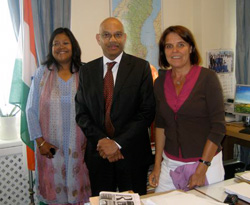
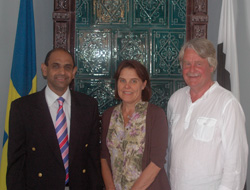
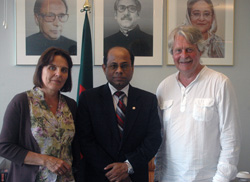
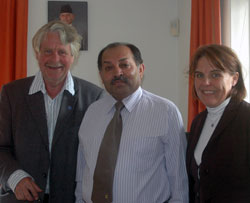
 Do not miss out on Lars Eklund’s new blog sasnettoday.blogspot.com. This is a blog that may focus on the day-to-day activities of Lars, working as deputy director/webmaster with the Swedish South Asian Studies Network since 2001. However, it may just as well deal with Lars’ many extramural South Asia/India related activities in Sweden and elsewhere. He used to be editor for the SYDASIEN magazine for a period of 25 years, has travelled extensively in all the South Asian countries from 1972 and onwards, and lives with his Indian wife Bubu. Besides he is well acquainted with South Asian history and religion, culture and music.
Do not miss out on Lars Eklund’s new blog sasnettoday.blogspot.com. This is a blog that may focus on the day-to-day activities of Lars, working as deputy director/webmaster with the Swedish South Asian Studies Network since 2001. However, it may just as well deal with Lars’ many extramural South Asia/India related activities in Sweden and elsewhere. He used to be editor for the SYDASIEN magazine for a period of 25 years, has travelled extensively in all the South Asian countries from 1972 and onwards, and lives with his Indian wife Bubu. Besides he is well acquainted with South Asian history and religion, culture and music.  SASNET engaged Mr. Geoffrey Gardella on a short-term assignment during the summer 2009 to assist the webmaster, Lars Eklund, to improve the graphic design on important SASNET web pages. Geoffrey is both a geographic and academic wanderer. With a master's degree in German from University of California Berkeley, he has also studied Hindi in Mussoorie and Saami at Umeå University. In between academic careers, he has worked in Silicon Valley. He is now a Master's degree student within the South Asia track at the
SASNET engaged Mr. Geoffrey Gardella on a short-term assignment during the summer 2009 to assist the webmaster, Lars Eklund, to improve the graphic design on important SASNET web pages. Geoffrey is both a geographic and academic wanderer. With a master's degree in German from University of California Berkeley, he has also studied Hindi in Mussoorie and Saami at Umeå University. In between academic careers, he has worked in Silicon Valley. He is now a Master's degree student within the South Asia track at the  SASNET’s deputy director Lars Eklund visited the University of Skövde on 28 May 2009. He was invited to participate in the signing ceremony of a Memorandum of Understanding (MoU) between the universities of Skövde and Rajshahi, Bangladesh. The MoU focuses on student exchange and research collaboration within Biomedicine, Bioinformatics, Ecology, Molecular Biology, Physiology, and Systematic Biology. The initiative comes from Dr. Abul Mandal and his colleagues at the
SASNET’s deputy director Lars Eklund visited the University of Skövde on 28 May 2009. He was invited to participate in the signing ceremony of a Memorandum of Understanding (MoU) between the universities of Skövde and Rajshahi, Bangladesh. The MoU focuses on student exchange and research collaboration within Biomedicine, Bioinformatics, Ecology, Molecular Biology, Physiology, and Systematic Biology. The initiative comes from Dr. Abul Mandal and his colleagues at the 
 SASNET also co-hosted an India seminar in co-operation with SIBC (
SASNET also co-hosted an India seminar in co-operation with SIBC ( During his stay in Lund and Malmö, the Ambassador also visited the Mayor of Lund, Ms Annica Annerby Jansson, visited Lund University’s Faculty of Engineering, and especially its
During his stay in Lund and Malmö, the Ambassador also visited the Mayor of Lund, Ms Annica Annerby Jansson, visited Lund University’s Faculty of Engineering, and especially its  The Tabla player Subrata Manna, the classical singer Sudokshina Chatterjee Manna, and the Kathak dancer Sohini Debnath (photo), all from Kolkata, India, participated in an well-attended academic seminar on intercultural education research in Malmö on Tuesday 26 May 2009, 13.30–16.00. They gave a presentation titled ”Application of Classical Indian
Music in World Music of today”. The artists visited Scandinavia as part of a European tour (with concerts in Copenhagen on May 26th and in Lund on May 27th). The Malmö seminar was jointly organised by Lund University Intercultural Education
Research Forum (since November 2008 coordinated by the International Art and Cultural Education Competency Centre,
The Tabla player Subrata Manna, the classical singer Sudokshina Chatterjee Manna, and the Kathak dancer Sohini Debnath (photo), all from Kolkata, India, participated in an well-attended academic seminar on intercultural education research in Malmö on Tuesday 26 May 2009, 13.30–16.00. They gave a presentation titled ”Application of Classical Indian
Music in World Music of today”. The artists visited Scandinavia as part of a European tour (with concerts in Copenhagen on May 26th and in Lund on May 27th). The Malmö seminar was jointly organised by Lund University Intercultural Education
Research Forum (since November 2008 coordinated by the International Art and Cultural Education Competency Centre,  SASNET has sponsored a photographic project set up by second-year students from Lund University’s Masters programme in Development and Management (
SASNET has sponsored a photographic project set up by second-year students from Lund University’s Masters programme in Development and Management ( Professor G.N. Tiwari from the
Professor G.N. Tiwari from the  PhD candidate Malin Jordahl,
PhD candidate Malin Jordahl, 
 Prof. Dipak Malik, Director of the Gandhian Institute in Varanasi, India, held an open SASNET lecture at Lund University on ”Riots and Elections in India” on Monday 11 May 2009. Prof. Malik, also working at the Dept. of Commerce, Banaras Hindu University (BHU) in Varanasi, discussed
the factors deciding the ongoing elections for the Indian parliament, Lok Sabha (results to be announced
on May 16th), and the profile of Indian communal riots, now and in the past. The seminar was organised in collaboration with the Research group on Development
and Environment at the
Prof. Dipak Malik, Director of the Gandhian Institute in Varanasi, India, held an open SASNET lecture at Lund University on ”Riots and Elections in India” on Monday 11 May 2009. Prof. Malik, also working at the Dept. of Commerce, Banaras Hindu University (BHU) in Varanasi, discussed
the factors deciding the ongoing elections for the Indian parliament, Lok Sabha (results to be announced
on May 16th), and the profile of Indian communal riots, now and in the past. The seminar was organised in collaboration with the Research group on Development
and Environment at the 

 Two smart quizz winning Indian students from the Indian Institute of Technology (IIT) in Mumbai, Rahul Singh (from Jamshedpur) and Haripriya Mukundarajan (from Bangalore), visited SASNET and Lund University on Monday 23 February 2009. They were the winners of a Nobel prize quizz competition organised by the Embassy of Sweden in India in October 2008. The winners’ prize was an all-expenses paid, weeklong trip to Sweden where they would get an opportunity to visit Swedish universities and major technology companies in Lund, Göteborg, Linköping, Sandviken and Stockholm. SASNET’s deputy director Lars Eklund organised their visit to Lund University, that included visiting the Nanoscience laboratory at the Dept. of Physics (photo above).
Two smart quizz winning Indian students from the Indian Institute of Technology (IIT) in Mumbai, Rahul Singh (from Jamshedpur) and Haripriya Mukundarajan (from Bangalore), visited SASNET and Lund University on Monday 23 February 2009. They were the winners of a Nobel prize quizz competition organised by the Embassy of Sweden in India in October 2008. The winners’ prize was an all-expenses paid, weeklong trip to Sweden where they would get an opportunity to visit Swedish universities and major technology companies in Lund, Göteborg, Linköping, Sandviken and Stockholm. SASNET’s deputy director Lars Eklund organised their visit to Lund University, that included visiting the Nanoscience laboratory at the Dept. of Physics (photo above).  Professor Ravinder Kaur from the
Professor Ravinder Kaur from the  • Dr. Walter Andersen, Associate Director of the South Asia Studies Program at Paul H. Nitze School of Advanced International Studies, Johns Hopkins University, Washington, D.C., USA held a joint SASNET/UPF (Lund University Association of Foreign Affairs) lecture in Lund on Monday 16 March 2009, at 19.30. Dr. Andersen, who has a PhD in Political Science from the University of Chicago, lectured on ”Islamic militancy in India: A domestic issue with significant foreign policy implications” He has recently retired as chief of the U.S. State Department's South Asia Division in the Office of Analysis for the Near East and South Asia. Venue for the seminar: Café Athen, Sandgatan 2, Lund.
• Dr. Walter Andersen, Associate Director of the South Asia Studies Program at Paul H. Nitze School of Advanced International Studies, Johns Hopkins University, Washington, D.C., USA held a joint SASNET/UPF (Lund University Association of Foreign Affairs) lecture in Lund on Monday 16 March 2009, at 19.30. Dr. Andersen, who has a PhD in Political Science from the University of Chicago, lectured on ”Islamic militancy in India: A domestic issue with significant foreign policy implications” He has recently retired as chief of the U.S. State Department's South Asia Division in the Office of Analysis for the Near East and South Asia. Venue for the seminar: Café Athen, Sandgatan 2, Lund. 

 SASNET’s director Anna Lindberg and deputy director Lars Eklund travelled in Northern and Western/ Southwestern India during the period 1–30 November 2007.Totally, they visited more than 30 important universities and
research institutions, with an ambition to promote Indo-Swedish researcher cooperation
and student exchange in all fields, from medicine/natural sciences
to social sciences/humanities. A large number of fruitful meetings
were held in all the places visited, including Delhi, Thiruvananthapuram,
Kottayam, Kozhikode, Mumbai, Loni, Pune, Bangalore and Mysore.
In New Delhi, the Swedish Embassy also organised a reception/dinner
for the academic world in honour of the visiting SASNET delegation.
SASNET’s director Anna Lindberg and deputy director Lars Eklund travelled in Northern and Western/ Southwestern India during the period 1–30 November 2007.Totally, they visited more than 30 important universities and
research institutions, with an ambition to promote Indo-Swedish researcher cooperation
and student exchange in all fields, from medicine/natural sciences
to social sciences/humanities. A large number of fruitful meetings
were held in all the places visited, including Delhi, Thiruvananthapuram,
Kottayam, Kozhikode, Mumbai, Loni, Pune, Bangalore and Mysore.
In New Delhi, the Swedish Embassy also organised a reception/dinner
for the academic world in honour of the visiting SASNET delegation. 
 From 18 November
till 19 December 2005 SASNET’s director, Professor Staffan
Lindberg and the deputy director Lars Eklund travelled in the North-Eastern part of South Asia. They visited a great number of universities
and institutes in East and North-East
India (Kolkata, Bhubaneshwar, Patna, Siliguri, Guwahati and Shillong);
Bangladesh (Dhaka, Savar, Chittagong, Rajshahi and Sylhet); Bhutan
(Thimphu); and Nepal (Kathmandu).
From 18 November
till 19 December 2005 SASNET’s director, Professor Staffan
Lindberg and the deputy director Lars Eklund travelled in the North-Eastern part of South Asia. They visited a great number of universities
and institutes in East and North-East
India (Kolkata, Bhubaneshwar, Patna, Siliguri, Guwahati and Shillong);
Bangladesh (Dhaka, Savar, Chittagong, Rajshahi and Sylhet); Bhutan
(Thimphu); and Nepal (Kathmandu).  A SASNET contact journey to Pakistan and Afghanistan was made by SASNET’s director Staffan Lindberg, and webmaster/deputy
director Lars Eklund, 20 November – 7 December 2003. The aim
of the tour was to link up the SASNET activities with universities
and research institutions in the two countries.
A SASNET contact journey to Pakistan and Afghanistan was made by SASNET’s director Staffan Lindberg, and webmaster/deputy
director Lars Eklund, 20 November – 7 December 2003. The aim
of the tour was to link up the SASNET activities with universities
and research institutions in the two countries. They visited Karachi, Islamabad, and Lahore in Pakistan; and Kabul
in Afghanistan. It turned out to be an extremely fruitful journey,
both building on the already existing academic links between a few
researchers/institutions in Sweden and Pakistan, and promoting new
forms of cooperation there as well as in Afghanistan.
They visited Karachi, Islamabad, and Lahore in Pakistan; and Kabul
in Afghanistan. It turned out to be an extremely fruitful journey,
both building on the already existing academic links between a few
researchers/institutions in Sweden and Pakistan, and promoting new
forms of cooperation there as well as in Afghanistan.  In the Spring 2002, Staffan Lindberg, and
Lars Eklund made a tour to South Asia in
order to link up the SASNET activities with universities and research
institutions in different countries of the region. The two visited
the Maldives (Male) 26–27 February, Sri Lanka 28 February–5
March, India (New Delhi, Varanasi, Hyderabad, Kolkata and Shantiniketan)
6–19 March; and finally Bangladesh 20–22 March.
In the Spring 2002, Staffan Lindberg, and
Lars Eklund made a tour to South Asia in
order to link up the SASNET activities with universities and research
institutions in different countries of the region. The two visited
the Maldives (Male) 26–27 February, Sri Lanka 28 February–5
March, India (New Delhi, Varanasi, Hyderabad, Kolkata and Shantiniketan)
6–19 March; and finally Bangladesh 20–22 March.  SASNET’s former Director, Prof. Staffan Lindberg, participated in the second biannual India Forum that was organised by the German Marshal Fund of
the United States (GMF) in Stockholm on 1–2 October 2010. The conference, co-organised by the Legatum Institute and the Swedish Ministry for Foreign Affairs focused on ‘India’s evolving foreign policy, the economic and commercial relationships between India and the West, common challenges in Afghanistan and Pakistan, the potential for convergence on climate and energy policy, and response to a more assertive China’. The invited participants included high-profile policymakers, intellectuals, academicians, journalists, and business people from Europe, the United States, and India. The purpose with this kind of closed-door conference is to facilitate cooperation and coordination through informal discussions.
SASNET’s former Director, Prof. Staffan Lindberg, participated in the second biannual India Forum that was organised by the German Marshal Fund of
the United States (GMF) in Stockholm on 1–2 October 2010. The conference, co-organised by the Legatum Institute and the Swedish Ministry for Foreign Affairs focused on ‘India’s evolving foreign policy, the economic and commercial relationships between India and the West, common challenges in Afghanistan and Pakistan, the potential for convergence on climate and energy policy, and response to a more assertive China’. The invited participants included high-profile policymakers, intellectuals, academicians, journalists, and business people from Europe, the United States, and India. The purpose with this kind of closed-door conference is to facilitate cooperation and coordination through informal discussions. 
 Prof. Vinayak Chaturvedi, University of California Irvine, was the keynote speaker. He lectured about ”Dialogues with M.K. Gandhi on History and Violence in India”.
Prof. Vinayak Chaturvedi, University of California Irvine, was the keynote speaker. He lectured about ”Dialogues with M.K. Gandhi on History and Violence in India”.  The keynote speaker was Prof. Emeritus Graham Chapman (photo) from the Dept. of Geography, Lancaster University, UK. Other main speakers were
Dr. Sirpa Tenhunen, Department of Social and Cultural Anthropology, University of Helsinki, Finland; Mr. Teddy Primack, Director of Academic Documents Associates, USA; Associate Professor Jan Vang, Department of Production, Aalborg University, Denmark; Dr. Anna Godhe,
The keynote speaker was Prof. Emeritus Graham Chapman (photo) from the Dept. of Geography, Lancaster University, UK. Other main speakers were
Dr. Sirpa Tenhunen, Department of Social and Cultural Anthropology, University of Helsinki, Finland; Mr. Teddy Primack, Director of Academic Documents Associates, USA; Associate Professor Jan Vang, Department of Production, Aalborg University, Denmark; Dr. Anna Godhe,  The 2010 conference was again held at Falsterbo conference retreat (Falsterbo kursgård) in Höllviken. This time an ornitological excursion led by Dr. Stig Toft Madsen was included in the programme, in order to watch birds and seals at the Falsterbo peninsula. (Prof. Bo Lindblad watches birds on photo above).
The 2010 conference was again held at Falsterbo conference retreat (Falsterbo kursgård) in Höllviken. This time an ornitological excursion led by Dr. Stig Toft Madsen was included in the programme, in order to watch birds and seals at the Falsterbo peninsula. (Prof. Bo Lindblad watches birds on photo above). Anna Lindberg and Lars Eklund from SASNET visited Stockholm and Västerås on 15–16 June 2009. The visit to Stockholm focused on discussions regarding possible forms for continued funding for SASNET from 2010, with visits to the Royal Institute of Technology (KTH), and the Swedish International Development Cooperation Agency, Sida. They also made some networking visits to a couple of research departments at KTH – the
Anna Lindberg and Lars Eklund from SASNET visited Stockholm and Västerås on 15–16 June 2009. The visit to Stockholm focused on discussions regarding possible forms for continued funding for SASNET from 2010, with visits to the Royal Institute of Technology (KTH), and the Swedish International Development Cooperation Agency, Sida. They also made some networking visits to a couple of research departments at KTH – the  Lars continued to Västerås to meet researchers and programme coordinators at Mälardalen University, working on South Asia related collaboration projects in research and education, including the ongoing Erasmus Mundus External Cooperation programme EURECA.
Lars continued to Västerås to meet researchers and programme coordinators at Mälardalen University, working on South Asia related collaboration projects in research and education, including the ongoing Erasmus Mundus External Cooperation programme EURECA.  In mid-March 2009 SASNET’s deputy director Lars Eklund visited two universities in southern Sweden, Jönköping University and Växjö University. Networking is the main purpose of SASNET, and a regular feature of our activities therefore consists of visiting Swedish universities to meet with researchers and educationists involved in South Asia related research and/or educational collaboration projects. On 19 March, Lars visited Jönköping University, one of the strongest in Sweden when it comes to internationalisation work including collaboration projects with South Asia. Lars met with international coordinators and researchers/educationists from all four schools of the university –
In mid-March 2009 SASNET’s deputy director Lars Eklund visited two universities in southern Sweden, Jönköping University and Växjö University. Networking is the main purpose of SASNET, and a regular feature of our activities therefore consists of visiting Swedish universities to meet with researchers and educationists involved in South Asia related research and/or educational collaboration projects. On 19 March, Lars visited Jönköping University, one of the strongest in Sweden when it comes to internationalisation work including collaboration projects with South Asia. Lars met with international coordinators and researchers/educationists from all four schools of the university –  The most interesting South Asia related news at Jönköping University right now was the fact that JIBS has taken over the responsibility to develop a technical university in the Pakistani city of Sialkot. A project initially run by the Royal Institute of Technology (KTH) in Stockholm, but since KTH withdrew from the project it was administered by Dr. Ramon Wyss, at the time Vice-president for International Affairs at JIBS.
The most interesting South Asia related news at Jönköping University right now was the fact that JIBS has taken over the responsibility to develop a technical university in the Pakistani city of Sialkot. A project initially run by the Royal Institute of Technology (KTH) in Stockholm, but since KTH withdrew from the project it was administered by Dr. Ramon Wyss, at the time Vice-president for International Affairs at JIBS. 
 On Monday 2 March 2009, Lars Eklund and Stig Toft Madsen from SASNET participated in a brain storming/awareness raising workshop on ”Contemporary India Study Centres in Europe: Status & Further Developments” that was held in Paris. The so-called India-EU Study Centres Programme (IESCP) was set up by the European Commission in 2008 as an integral part of the
On Monday 2 March 2009, Lars Eklund and Stig Toft Madsen from SASNET participated in a brain storming/awareness raising workshop on ”Contemporary India Study Centres in Europe: Status & Further Developments” that was held in Paris. The so-called India-EU Study Centres Programme (IESCP) was set up by the European Commission in 2008 as an integral part of the  The
workshop was also the first effort to realise the concept of SASNET sub-networks,
put forward at the informal meeting by SASNET’s South Asian Reference Group
held in Delhi in November 2007 (
The
workshop was also the first effort to realise the concept of SASNET sub-networks,
put forward at the informal meeting by SASNET’s South Asian Reference Group
held in Delhi in November 2007 (

 SASNET was the main funding agency behind the international research conference on “Nature, Knowledge, Power” that was held in Uppsala 15-17 August 2008. The conference, hosted by the
SASNET was the main funding agency behind the international research conference on “Nature, Knowledge, Power” that was held in Uppsala 15-17 August 2008. The conference, hosted by the  On
Wednesday 14 March 2007, SASNET’s
Director Staffan Lindberg and Deputy Director Lars Eklund visited the
School of Engineering at Blekinge Institute of Technology (BTH)
in Ronneby. They visited the campus
for a discussion of its activities related to South Asia and a
discussion of would SASNET could do for the promotion of its South
Asia activities. They were hosted by Jan-Olof
Gustavsson, Dean, School of Engineering, Maria
Engelmark, Head of International Office, Lars
Lundberg, Professor of Computer Systems Engineering, and Mikael Åsman,
Head of Masters Programme in Electrical Engineering.
On
Wednesday 14 March 2007, SASNET’s
Director Staffan Lindberg and Deputy Director Lars Eklund visited the
School of Engineering at Blekinge Institute of Technology (BTH)
in Ronneby. They visited the campus
for a discussion of its activities related to South Asia and a
discussion of would SASNET could do for the promotion of its South
Asia activities. They were hosted by Jan-Olof
Gustavsson, Dean, School of Engineering, Maria
Engelmark, Head of International Office, Lars
Lundberg, Professor of Computer Systems Engineering, and Mikael Åsman,
Head of Masters Programme in Electrical Engineering.  On
Thursday 15 February 2007, SASNET’s Director Staffan Lindberg
and Deputy Director Lars Eklund visited Kalmar University and
met researchers involved in the SASNET network. Prof.
William Hogland at the
On
Thursday 15 February 2007, SASNET’s Director Staffan Lindberg
and Deputy Director Lars Eklund visited Kalmar University and
met researchers involved in the SASNET network. Prof.
William Hogland at the 
 The
focus was on experiences from masters and PhD programmes in Sweden
as well as in South Asia, with an aim to promote increased academic
exchange with South Asia.
The
focus was on experiences from masters and PhD programmes in Sweden
as well as in South Asia, with an aim to promote increased academic
exchange with South Asia. 
 An extensive Conference Diary has been prepared by Dr. William Radice,
renowned Bengali Studies scholar from the School of Oriental
and African Studies, University of London, UK, and a brilliant writer.
He was assigned by the conference organisers to write it.
An extensive Conference Diary has been prepared by Dr. William Radice,
renowned Bengali Studies scholar from the School of Oriental
and African Studies, University of London, UK, and a brilliant writer.
He was assigned by the conference organisers to write it.  It is part of an effort to strenghten the SASNET national network.
In November 2004 he visited Örebro University in connection
with the 10th Anniversary celebration of the Sweden–India
Project, run by the Social Work programme; Department of Behavioural,
Social and Legal Sciences (
It is part of an effort to strenghten the SASNET national network.
In November 2004 he visited Örebro University in connection
with the 10th Anniversary celebration of the Sweden–India
Project, run by the Social Work programme; Department of Behavioural,
Social and Legal Sciences ( On
20 June 2005 Lars visited Uppsala University, where he met with
researchers at the Department of Linguistics and Philology (in the
On
20 June 2005 Lars visited Uppsala University, where he met with
researchers at the Department of Linguistics and Philology (in the  The
following day he proceeded to Karolinska Institutet Medical University
in Stockholm and met with researchers at the
The
following day he proceeded to Karolinska Institutet Medical University
in Stockholm and met with researchers at the  Follow-up meetings to the SASNET’s symposium in Marstrand
in October 2002 were arranged at Karlstad University and Göteborg
University in September 2003. Researchers, teachers and students
engaged in South Asian studies at Karlstad
University presented their work at a meeting on Wednesday
24 September (some of the participants shown on the photo to
the right).
Follow-up meetings to the SASNET’s symposium in Marstrand
in October 2002 were arranged at Karlstad University and Göteborg
University in September 2003. Researchers, teachers and students
engaged in South Asian studies at Karlstad
University presented their work at a meeting on Wednesday
24 September (some of the participants shown on the photo to
the right). 
 The SASNET symposium for Swedish PhD students and post-docs
engaged in research related to South Asia took place on 25–27
October 2002, at Marstrands Varmbadhus, north of Göteborg.
The sessions were devoted to discuss the situation of PhD students
in South Asian Studies or South Asia relevant studies (recruitment,
fieldwork, supervision, finishing, post-doc situation). Programme,
participants list and basis for discussions are available on our
web page
The SASNET symposium for Swedish PhD students and post-docs
engaged in research related to South Asia took place on 25–27
October 2002, at Marstrands Varmbadhus, north of Göteborg.
The sessions were devoted to discuss the situation of PhD students
in South Asian Studies or South Asia relevant studies (recruitment,
fieldwork, supervision, finishing, post-doc situation). Programme,
participants list and basis for discussions are available on our
web page  SASNET was represented by both Staffan Lindberg and Lars Eklund
at the 17th European Conference on Modern South Asian Studies,
which took place at Heidelberg, Germany, 9–14 September, 2002.
300 participating South Asia researchers from all over the World
made the conference into a major event.
SASNET was represented by both Staffan Lindberg and Lars Eklund
at the 17th European Conference on Modern South Asian Studies,
which took place at Heidelberg, Germany, 9–14 September, 2002.
300 participating South Asia researchers from all over the World
made the conference into a major event.  •
The ØRNAST educational cooperation project between the universities
of Lund and Copenhagen was formally inaugurated with a ceremony
at Copenhagen University on Tuesday 14 September 2004.
•
The ØRNAST educational cooperation project between the universities
of Lund and Copenhagen was formally inaugurated with a ceremony
at Copenhagen University on Tuesday 14 September 2004. SASNET has a unique collection of books about South Asia in its root node office at Scheelevägen 15 D in Lund. The library consists of more than 140 doctoral dissertations from the middle of the 1990s (and in some cases even older) up to 2011 published in Sweden and the other Nordic countries; besides a large number of other titles. The unpretentious SASNET library encompasses a wide range of subjects, reflecting the variety of South Asia related research topics undertaken in the Nordic countries.
SASNET has a unique collection of books about South Asia in its root node office at Scheelevägen 15 D in Lund. The library consists of more than 140 doctoral dissertations from the middle of the 1990s (and in some cases even older) up to 2011 published in Sweden and the other Nordic countries; besides a large number of other titles. The unpretentious SASNET library encompasses a wide range of subjects, reflecting the variety of South Asia related research topics undertaken in the Nordic countries.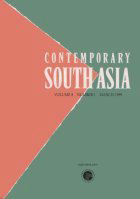

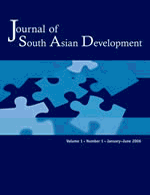


 In 2007, the
Crafoord Foundation also decided to give a grant to
SASNET in order to digitalize other parts of Karl Reinhold Haellquist’s
(photo) private archive. With supplementary funding from SASNET this work was carried out during the Fall 2008 by a hired librarian, Erik Svanström. With regard to K R Haellquist’s specialised interest in Mahatma Gandhi, it was decided to concentrate the efforts to the vast material on Gandhi in Haellquist’s material.
In the new web site we meet Gandhi through Haellquist’s lecture notes. SASNET’s ambition is that it will continue to spread light on Gandhi and his ideas.
In 2007, the
Crafoord Foundation also decided to give a grant to
SASNET in order to digitalize other parts of Karl Reinhold Haellquist’s
(photo) private archive. With supplementary funding from SASNET this work was carried out during the Fall 2008 by a hired librarian, Erik Svanström. With regard to K R Haellquist’s specialised interest in Mahatma Gandhi, it was decided to concentrate the efforts to the vast material on Gandhi in Haellquist’s material.
In the new web site we meet Gandhi through Haellquist’s lecture notes. SASNET’s ambition is that it will continue to spread light on Gandhi and his ideas.